There are no translations available.
ROYAUME-UNI L'EXPULSION DE MIGRANTS CLANDESTINS AU RWANDA
|
Après des mois de bataille judiciaire, le Parlement britannique a finalement adopté un projet de loi autorisant le renvoi des immigrants clandestins vers le Rwanda. Cette décision, présentée en avril 2022 par l'ancien Premier ministre britannique Boris Johnson, faisait l'éloge du Rwanda pour son accueil et son intégration des migrants. Malgré les controverses et une suspension temporaire de la Cour européenne des droits de l'homme en juin 2022, les députés britanniques ont maintenu leur position. Dans la nuit de lundi à mardi, ils ont voté en faveur de cette loi permettant à Londres d'expulser les immigrants clandestins vers le Rwanda.
Malgré l'assurance de Rishi Sunak que les vols vers le Rwanda auront lieu, l'application de cette loi reste incertaine, avec la possibilité d'interventions futures de la Cour européenne des droits de l'homme et de la Cour suprême britannique, qui avait déjà jugé le projet initial illégal en novembre dernier.
Depuis des années, Kigali s'est présenté comme un refuge pour les exilés, accueillant notamment le programme de réinstallation des réfugiés en provenance de Libye depuis 2019. Selon le Haut-Commissariat des Nations unies pour les réfugiés (HCR), le Rwanda hébergeait environ 135 000 réfugiés et demandeurs d'asile en septembre 2023. Cependant, la décision du Parlement britannique de relocaliser de force les immigrants à des milliers de kilomètres de leur destination initiale est largement considérée comme une stratégie de communication politique.
Pour Londres, l'objectif est de montrer sa fermeté face à l'immigration illégale, qui a connu une augmentation de plus de 20 % depuis le début de l'année, avec cinq personnes se noyant, dont une fillette de 7 ans, en tentant de traverser la Manche ce mardi. Cependant, sur les quelque 30 000 personnes ayant réussi à atteindre le pays en 2023, peu seraient effectivement concernées par une relocalisation au Rwanda.
En été 2022, Kigali avait fait la promotion de ses hôtels rénovés dans le cadre de cette opération, mais un reportage du Telegraph de juin 2022 révélait que les réfugiés manquaient de ressources de base telles que la nourriture, le logement et les soins de santé. En outre reconstruire leur vie dans un pays affichant près de 20 % de chômage s'annonce difficile. D’autant que si Londres a promis 144 millions d’euros à Kigali.-
|
|
|
|
| Britney Delsey pour DayNewsWorld |
 |
INDONESIA ON TSUNAMI RISK ALERT
AFTER ERUPTION OF THE RUANG VOLCANO | 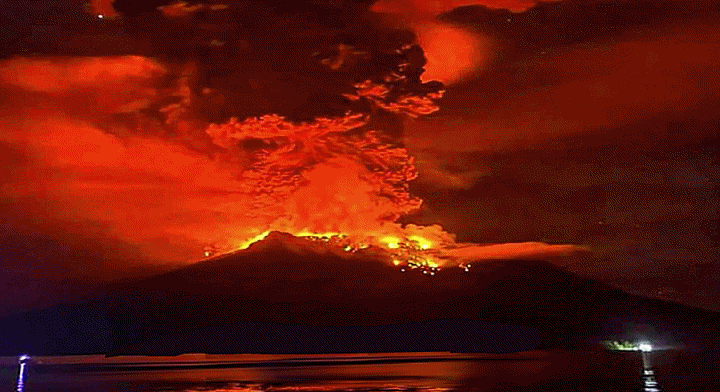
The Ruang volcano, located on a small northern Indonesian island of the same name,has erupted five times since Tuesday. Faced with the risk of a tsunami and the paralysis of air traffic, the country is on maximum alert and is evacuating thousands of people.
The volcano threw a cloud of ash more than a kilometer high into the sky, which could “compromise flight safety”. Manado international airport, although located more than 100 kilometers from the eruption, was therefore closed Wednesday evening for 24 hours. The crater of the volcano ignited and spewed lava during the night from Wednesday to Thursday and, this morning, it was still releasing a column of smoke.
The authorities, who raised the alert level to the highest on a scale of four, announced the evacuation of 11,000 people in the area closest to Ruang. This particularly concerns the island of Tagulandang, which has around 20,000 inhabitants and to which more than 800 people living on the neighboring volcanic island were displaced after the first eruption. The instruction is to keep a distance of at least six kilometers from the volcano. A caution which does not allay all fears, since the threat of a tsunami is now worrying the authorities.
On Wednesday, the director of the Indonesian Volcanology Agency, Hendra Gunawan, explained that "residents of Tagulandang Island, especially those who reside near the beach, should be on alert for the risk of incandescent rock projections , fiery clouds and tsunami caused by the collapse of the mass of the volcano into the sea.
In 2018, the partial collapse of the crater of the Anak Krakatoa volcano, located between the islands of Java and Sumatra, triggered a tsunami and led to the death of 400 people.
|
|
|
|
| Boby Dean for DayNewsWorld |
 |
UNDERSTANDING DIVERSITY
BETWEEN THE UNITED STATES AND ISRAEL
AFTER THE IRANIAN ATTACK | 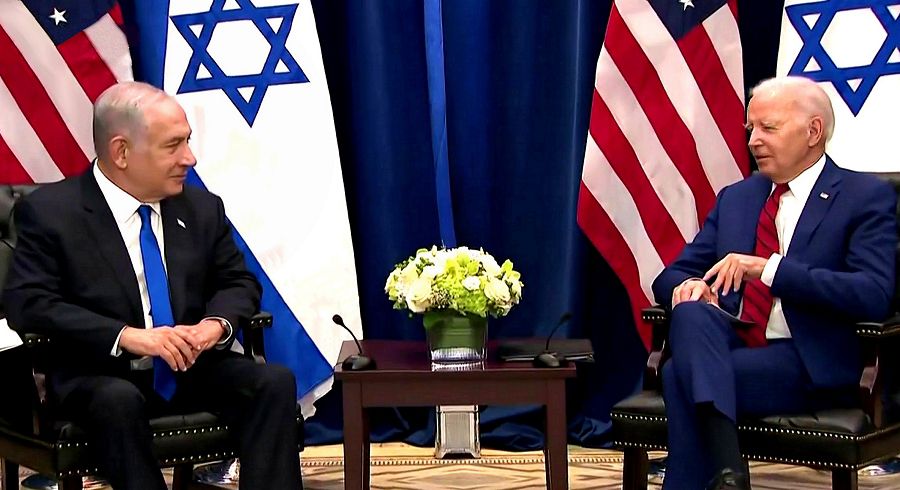
Israel has promised “a response” to the massive and unprecedented attack launched by Iran, despite calls from around the world, including the United States, to avoid an escalation in the Middle East, already shaken by the war in the Gaza Strip.
Iranian President Ebrahim Raïssi once again warned on Tuesday that “the slightest action” by Israel against “Iran's interests” would provoke “a severe, widespread and painful response” from his country.
This development raises concerns about a possible deterioration of the situation, with a significant risk of regional escalation if Israel decides to retaliate in accordance with the wishes of Prime Minister Benjamin Netanyahu.
And the Israeli Prime Minister called for unity from the international community in the face of what he describes as “Iranian aggression threatening world peace”.
Yet the United States, which has played an active role in defending Israeli territory attacked for the first time since 1973 by a regional state power, has declared its opposition to any escalation or expanded war with Iran. They warned that they would not participate in retaliatory action while affirming their unwavering support for Israel.
An evolution of the American position?
These new official statements appear to indicate an evolution in the American position with regard to the ongoing conflict.
Indeed, for several weeks, differences have been increasing between the American administration and Netanyahu's government.
On March 25 , the United States abstained for the first time during the vote, by the United Nations Security Council, on a resolution demanding an immediate ceasefire between Israel and Hamas as well as the release of all the hostages. A position commented on by the Israeli Prime Minister who described it as a “clear setback” harming war efforts.
More recently, during a telephone exchange, Joe Biden allegedly threatened to condition aid to Israel on “tangible” measures if Israel did not change its way of conducting the war in Gaza.
How can we explain this evolution in the posture of Joe Biden's United States?
On the one hand, the very high human and material losses in Gaza are causing growing disapproval from public opinion even within Western countries.
On the other hand, the military objectives pursued by Israel are giving rise to more and more questions and reservations.
Indeed, among the Israeli war goals, that of eradicating Hamas presented as indisputable evidence is considered unrealistic by even Israel's allies. Military officials in Washington would consider that the maximalist objective set by the Israelis is not achievable as such.
Furthermore, in the context of the American electoral campaign, Joe Biden has everything to lose by showing unwavering support for Israel in his speeches. Part of his electorate criticizes him for “double standards” which has also cemented an anti-Western political discourse.
It is clear that the Biden administration's decision to increase humanitarian aid while continuing to provide the financial and material support necessary for the war effort creates incomprehension and frustration for part of public opinion. in the United States, particularly within the Democratic camp.
Biden cannot completely ignore it and lose part of his electorate. However, the United States remains Israel's best ally since its creation.
|
|
|
|
| Alyson Braxton for DayNewsWorld |
 |
RETURN TO THE MOTOR SHOW
OLD AVIGNON 2024
A JOURNEY IN AUTOMOTIVE TIME |  In the heart of the historic city of Avignon, an event takes place every year that revives memories of a time when cars were true mechanical jewels. The Avignon Classic Automobile Show, an unmissable event for automobile enthusiasts and the curious eager for discovery, once again shone brightly this year. In the heart of the historic city of Avignon, an event takes place every year that revives memories of a time when cars were true mechanical jewels. The Avignon Classic Automobile Show, an unmissable event for automobile enthusiasts and the curious eager for discovery, once again shone brightly this year.
Despite the logistical challenges encountered in locating the reception, visitors were rewarded by the richness and diversity of this extraordinary show. Incessant exchanges enlivened the aisles, highlighting the constant interest in original parts, authentic witnesses of automotive history.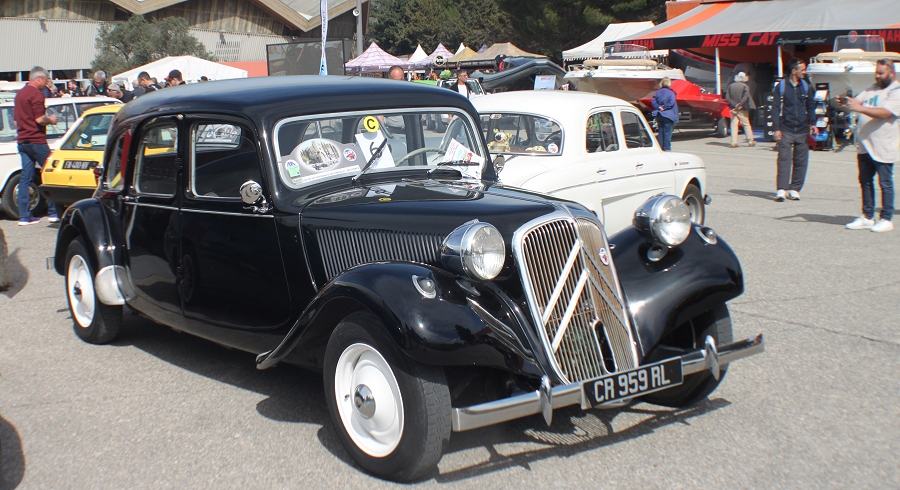
In a delicate economic context, the assertive presence of both sellers and buyers, major brands and independent enthusiasts, testifies to the vitality of this universe. The spirit of sharing and passion was palpable, creating a warm and friendly atmosphere throughout the event.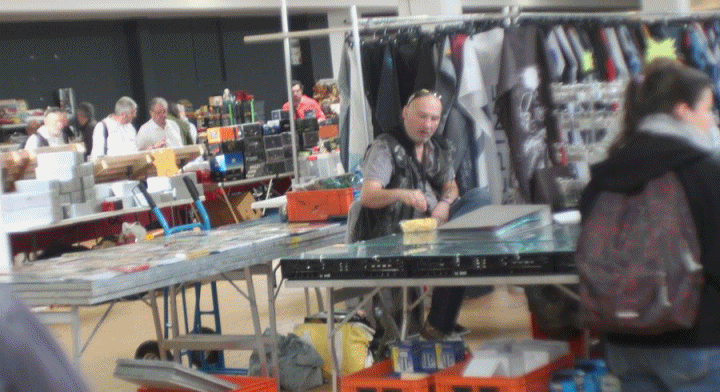
The organizers were able to skillfully divide the different sections of the show, offering visitors a rich and varied experience. From miniatures to spare parts, each stand was an invitation to explore the treasures of old automobiles, arousing the interest of connoisseurs and novices alike.
The vehicles on display, carefully selected, formed a veritable rolling museum, where emblematic brands coexisted harmoniously. From the prestigious Facel Vega to the legendary MG, via the elegant Jaguars and the robust Panhard Levassors, each model told a unique story, testifying to the creative genius of their designers.
French brands were also in the spotlight, with representatives such as Peugeot, Citroën and their legendary C4 and B14. British car enthusiasts were not left out, with a profusion of English models attracting admiring glances.
The Renault stand, featuring the iconic R15 and R17 in impeccable condition, as well as the Lancia stand, displaying models of timeless elegance, were highlights of the exhibition.
But the Avignon Classic Automobile Show is not limited to the exhibition of cars. Various activities punctuated the event, transporting visitors into the retro atmosphere of years gone by. A group of vintage singers and dancers from the 60s lit up the stages, creating a real buzz among the amazed spectators.
The festive atmosphere was also accompanied by the captivating melodies of a barrel organ, whose notes resonated in the emotionally charged atmosphere. Installed in a remarkably restored Renault Goélette truck, this traveling instrument alone embodied the spirit of this extraordinary event.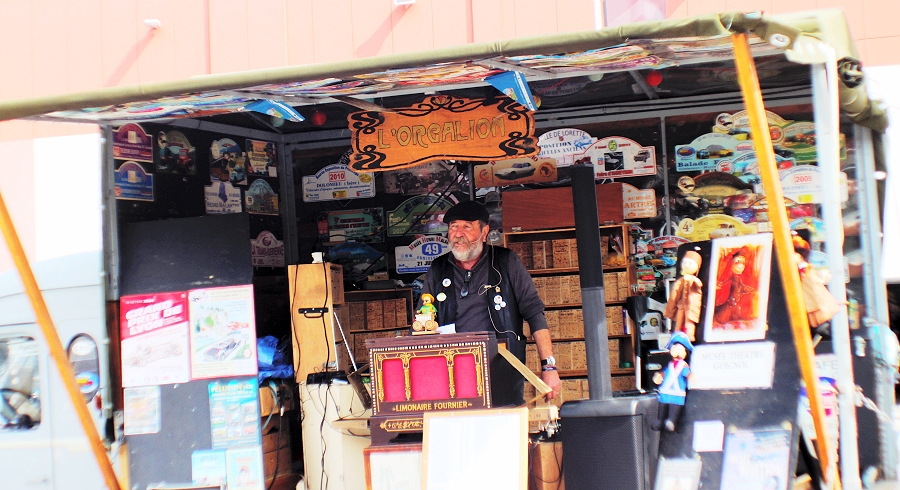
The applause goes without doubt to the organizer, Mr. Camille Bourge, and his team, whose dedication and talent made it possible to create an unforgettable experience for all vintage automobile enthusiasts. The Avignon Classic Car Show thus remains a true journey through time, where the past combines with the present with elegance and passion.
|
|
|
|
| Patrick Mourreau and Sandra Stac for DayNewsWorld |
 |
WILL TARDIGRADES COLONIZE THE MOON ? | 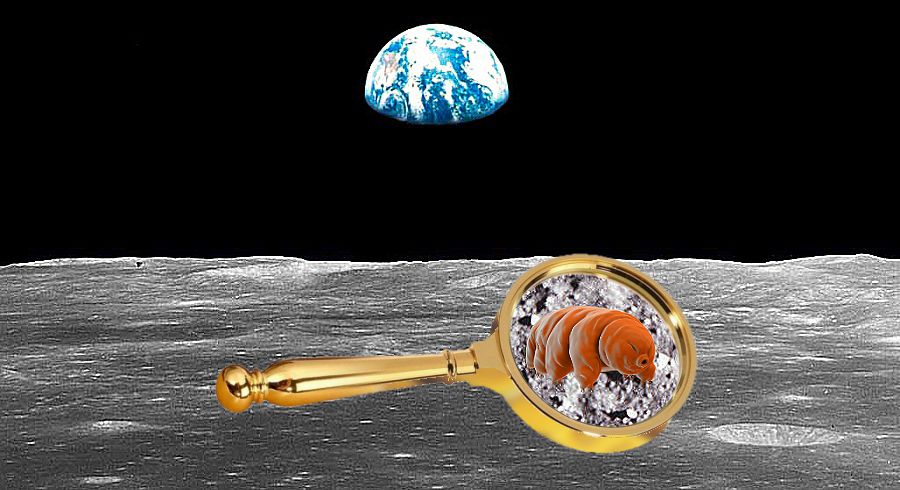
On February 22, 2019, a space probe, that is to say without a crew, was placed in orbit around the Moon with the objective of landing on the moon. It was a first because a private spacecraft had never landed on lunar soil. Additionally, the probe carried tardigrades in a dehydrated and inactive, but viable, form.
Everything was going as planned when suddenly on April 11, the probe experienced a problem with its propulsion as it began its descent. The speed was too great to slow down enough so that it crashed at over 3,000 km/h into our satellite
What happened to the tardigrades after the crash ? Are some still viable, buried under regolith, lunar dust whose depth varies from a few meters to a few tens of meters ?
Animals proof against almost anything
Tardigrades, these tiny creatures, occupy a unique place in the animal kingdom. Their size of less than a millimeter in no way reflects their remarkable complexity. Equipped with two eyes and a neuronal structure, they also have a mouth orifice at the end of a retractable proboscis, an intestine housing a microbiota, and four pairs of legs devoid of joints but equipped with sharp claws.
Their relationship with arthropods, such as insects and arachnids, is undeniable, testifying to a common evolutionary past.
Although most tardigrades live in aquatic environments, their presence is felt in all environments, including the most inhospitable of urban areas.
These beings fascinate mainly because of their incredible ability to withstand extreme conditions, far surpassing those encountered on Earth or the Moon. They can suspend their metabolism, losing up to 95% of their body water without apparent harm.
Some produce trehalose, an antifreeze sugar, while others synthesize proteins that transform cellular constituents into a glassy matrix, providing vital protection.
Dehydration causes a dramatic reduction in their size, sometimes up to half, with the legs disappearing, leaving only claws.
In this state, called cryptobiosis, they patiently wait for more lenient conditions to return to life.
However, specimens vary in their ability to withstand this desiccation, and not all are capable of resuscitation. Adult tardigrades can survive several minutes at extreme temperatures, reaching up to –272°C or 150°C, and are resistant over the long term to gamma ray doses of up to 1000 or 4400 Gray (Gy) , depending on the species. This unparalleled ability to survive defies the limits of biology and continues to amaze scientists to this day.
But difficulties...to survive
First of all, they must have survived the impact. Laboratory tests showed that frozen specimens of the species Hypsibius dujardini were intact after a vacuum impact at 2600 km/h on sand but were mutilated above 3000 km/h.
They must then resist the absence of water and withstand a cold of –170 to -190°C during the lunar night and a heat of 100 to 120°C during the day. A lunar day or night lasts a long time, a little less than 15 Earth days. Even the probe was not designed to withstand such amplitudes and had to cease all activity after only a few Earth days.
Finally, the surface of the Moon is not protected from solar particles and cosmic rays, particularly gamma rays. But there the tardigrades would be able to resist. Indeed, Robert Wimmer-Schweingruber, Professor at the University of Kiel in Germany, and his team showed that the doses of gamma rays striking the lunar surface were permanent but low compared to the doses cited previously. According to him, 10 years of exposure to gamma rays would correspond to a total dose of around 1 Gy.
Regardless, without water, oxygen or microalgae, the tardigrades will never be able to reactivate. Thus the colonization of the Moon by these animals is impossible. But specimens are on lunar soil and their presence raises ethical questions, as Matthew Silk, an ecologist at the University of Edinburgh, points out. Among these questions, there is one on the scientific level.
At a time when space exploration is taking off again in all directions, will contaminating other planets make us lose the possibility of looking for extraterrestrial life ?
|
|
|
|
| Kelly Donaldson for DayNewsWorld |
 |
TWO BILLION EUROS FOR SUDAN
FREAKING A SERIOUS HUMANITARIAN CRISIS | 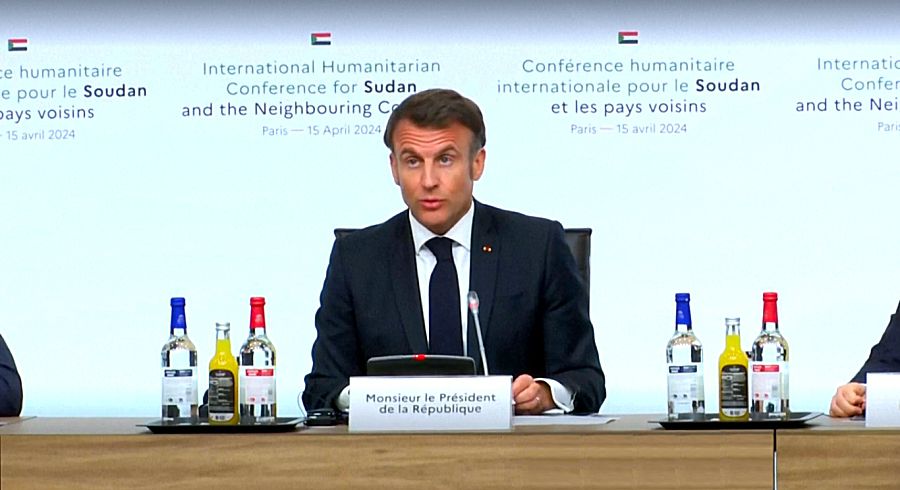
The international community, meeting Monday in Paris at a humanitarian conference for Sudan, promised to provide aid of more than 2 billion euros, announced the French president. The country has been torn apart by war for a year.
“In total, we can announce that more than 2 billion euros will be mobilized,” declared French President Emmanuel Macron. He said that before Monday's meeting, only 190 million pledges had been recorded.
Of the 2 billion, the member countries of the European Union will contribute 900 million euros, including 110 million by France. Switzerland has made 19 million francs available for Sudan for 2024.
The conference ended with a joint declaration calling on “all foreign actors” to stop providing armed support to the belligerents in Sudan.
A bloody civil war
It has been a year since Sudan has been gripped by a bloody civil war between the Sudanese army and the Rapid Support Forces, a paramilitary group. The fighting has caused tens of thousands of casualties and some six million people have been displaced, the majority of them within the country. Sudan has thus become one of the largest humanitarian crises in the world. A year after the start of the war, one in two Sudanese needs humanitarian aid.
Deadly clashes broke out on Saturday April 15, 2023 in Sudan between the Sudanese Armed Forces led by General Abdel Fattah al-Burhan, and the Rapid Support Forces, a paramilitary militia led by General Hemetti.
“For Eid, our country bleeds: destruction, desolation and the sound of bullets have taken precedence over joy,” General Burhane declared to the 45 million Sudanese.
This violence is not a surprise. It is the culmination of several months of tension between the two groups and especially their two leaders. At the origin of this situation, a power struggle between the two most powerful generals in Sudan. On one side, the head of the army, Abdel Fattah al-Burhan, who de facto rules the country. On the other, his number two, General Mohamed Hamdane Daglo, nicknamed “Hemetti”, at the head of the Rapid Support Forces (RSF, in English), a powerful paramilitary force.
To understand this rivalry, we have to go back to April 11, 2019. That day, the dictator Omar al-Bashir was overthrown by a military coup. Al Burhan and his junta take power. Hemetti is number two in the regime. Sudan is moving towards a transfer of power to civilians, but in October 2021, the military staged another putsch. Al Burhan and Hemetti are maneuvering to defeat the democratic transition.
How did we get here ?
In October 2021, the two generals therefore united to oust the civilians with whom they had shared power since the fall of dictator Omar al-Bashir in 2019.
“A marriage of convenience” for the putsch, explains researcher Hamid Khalafallah. “They never had a sincere partnership but shared interests vis-à-vis civilians.”
And the breaches in the sacred union quickly came to light: The head of the Rapid Support Forces (FSR), Hemedti, has several times denounced the “failure” of a putsch which reinstated “the old regime” of Bashir, according to him. Then the conflict intensified when it was necessary to sign the conditions for integrating his men into the regular troops, as part of the agreement with the civilians which was to relaunch the democratic transition.
For experts, this agreement opened Pandora's box: by letting the military negotiate among themselves, "Hemedti went from being second to Burhan's equal," says Kholood Khair, who founded the Confluence research center. Advisory in Khartoum. Feeling "more autonomous in the face of the army", Hemedti saw an opportunity to realize "his very great political ambitions", adds Alan Boswell, in charge of the Horn of Africa at the International Crisis Group.
The thorny question remained to be resolved: how to integrate Hemetti's Rapid Support Forces into the regular army. And then who will control the soldiers? Who to control weapons?
Another bone of contention, the presence since the reign of Omar el-Bashir of numerous Islamist officers in the Sudanese army, whom General Hemedti wanted to purge. Since the coup d'état of October 2021, the Islamist movement, which already benefited from significant support within the army, has strengthened with the blessing of General al-Burhan. This was one of the main points of tension with General Hemedti.
The two generals have opposing positions.
The army wanted very rapid integration, within one or two years. General Al-Burhan, supported by Egypt, and under pressure from certain Islamist executives in the army, made the signing of the agreement conditional on the integration of the RSF into the ranks of the army, under his command.
The RSF wanted to maintain autonomy for up to ten years. Hemetti categorically refused to let his rival command his men and agreed to place his forces only under the authority of a civilian head of state, and on condition that the army was purged of its Islamist elements. This security reform, a central issue in the transfer of power to civilians, has therefore ignited the powder.
Ancient rivalry of economic power
But the rivalry between the two men is older. For years, General Hemetti's Rapid Support Forces have continued to grow in strength. Made up of 80 to 120,000 men, well equipped, well trained, this force in the form of a free electron, which did not respond to central power, aroused discontent in the general staff of the regular army. With the sending of mercenaries to Yemen and the financial windfall from gold smuggling on behalf of the United Arab Emirates, Hemetti also became one of the richest and most powerful men in the country.
The rivalry between Al-Burhan and Hemetti is also personal. The two officers know each other well, they both operated in Darfur during the civil war in the 2000s and then during the Yemen war. And they have been competing for several years to reclaim a number of resource networks since the 2019 revolution.
All this only made things worse over the months. With an acceleration during political negotiations. Each camp recruited massively, particularly among the youth of Darfur, the large western region. And clashes could break out.
A year after the start of the war, one in two Sudanese needs humanitarian aid. Sudan has thus become one of the largest humanitarian crises in the world.
|
|
|
|
| Andrew Preston for DayNewsWorld |
 |
There are no translations available.
CRUMBLE POIRE CHOCOLAT
|
Aujourd'hui, je vous propose une recette simple et super gourmande de crumble à la poire et au chocolat ! À la fois très facile et rapide à réaliser chez vous, elle vous garantira un succès indéniable auprès de tous les gourmands que vous inviterez à votre table.
Ingrédients :
8 poires
150 g de chocolat noir
20 g de beurre
1 c. à café de cannelle en poudre
Pour la pâte :
100 g de farine
80 g de sucre roux
80 g de beurre
Préparation :
Préparation 20 min
Cuisson 40 min
1 Avant de commencer à préparer ce crumble aux fruits et au chocolat, pensez à préchauffer le four th.7 (210°C). Ensuite, démarrez la recette avec la fameuse pâte à biscuit : mettez la farine, le beurre (en morceaux) et la cassonade (sucre roux ou vergeoise) dans un saladier, puis travaillez-les du bout des doigts jusqu'à l'obtention d’une pâte sableuse.
2 Poursuivez avec les poires : épluchez-les, tranchez-les en quartiers puis coupez la chair en petits dés, et faites revenir ces derniers à la poêle, quelques min à feu moyen, avec le beurre et la cannelle, tout en les remuant régulièrement. Et terminez par le chocolat : râpez-le au couteau ou avec une grosse râpe.
3 Pour dresser votre crumble, utilisez un plat à gratin de taille moyenne, ou 6 ramequins individuels. Disposez d'abord les poires dans le fond, puis parsemez-les de chocolat râpé et recouvrez le tout de pâte. Enfournez le tout, baissez le four th.6 (180°C), puis faites cuire environ 35 min, jusqu'à ce que la pâte à crumble soit bien dorée.
4 Laissez le crumble tiédir avant de le servir accompagné de crème bien froide, ou d'une boule de glace vanille.
Astuces
Pour gagner du temps, vous pouvez utiliser des poires au sirop, que vous n'aurez pas à cuire, mais juste à égoutter, à trancher en cubes, et à saupoudrer de cannelle.
Et si vous voulez apporter davantage de gout et de croquant à votre pâte à crumble, vous pouvez lui incorporer quelques spéculoos réduits en grosses miettes.
|
|
|
|
| Marie-Chantal de Verneuil pour DayNewsWorld |
 |
IRAN'S ATTACK ON ISRAEL TOWARDS A REGIONAL EMBRACING ? | 
For the first time, Iran directly carried out a massive attack against Israel on the night of Saturday April 13, 2024 to Sunday April 14. Tehran said the operation, dubbed "Honest Promise", was in response to the strike that destroyed its consulate in Damascus on April 1, which it attributes to the Jewish state
The Iranian consulate in Damascus on April 1, 2024 beheaded the high command of the Al-Quds Force, the branch of the Revolutionary Guards responsible for external operations, in Syria and Lebanon.
At the same time, Iran's allies, Lebanese Hezbollah and Yemeni Houthi rebels have carried out anti-Israeli attacks, the former firing two rocket salvos within hours at the Israeli-occupied Golan, and the latter launching drones towards Israeli territory.
The Israeli army claimed to have “foiled” the attack, intercepting “99% of the shots” thanks to its defense system and the help of its allies.
According to its spokesperson, three hundred projectiles were launched against the Jewish state (one hundred and seventy drones, thirty cruise missiles and one hundred and ten ballistic missiles), of which "only a few fell on Israeli territory", notably at Nevatim Air Base in the Negev.
The Israeli army has so far reported only one serious injury, a 7-year-old girl, hit in the head by shrapnel from a shell thrown to intercept an Iranian projectile.
Iran estimated, Sunday morning, that the attack carried out overnight against Israel had "achieved all its objectives", through the voice of its head of the armed forces. "We have no intention of continuing this operation, but if the Zionist regime takes action against the Islamic Republic of Iran, whether on our soil or in the centers belonging to us in Syria or elsewhere, our next operation will be well more important than this,” warned General Mohammad Bagheri.
US President Joe Biden said US forces helped shoot down "nearly all" of the drones and missiles fired by Iran at Israel. Tehran "sent a message to the United States warning that its bases would not be safe if it cooperated with Israel for possible next [Iranian] actions."
Israel announced that it had intercepted, with the help of the United States and other allied countries including France and the United Kingdom, but also Jordan and Saudi Arabia, almost all of the 350 drones and missiles launched by Iran against its territory. The defensive operation was named "Iron Shield."
The region on alert
Jordan and Lebanon, Israel's neighbors, have announced the closure of their airspace, as has Iraq, which borders Iran. Also neighboring Israel, Egypt announced the placing of its air defenses on maximum alert and warned of a “risk of regional expansion of the conflict”. Saudi Arabia, for its part, called on all parties to “utmost restraint”
An emergency meeting of the United Nations Security Council is to take place on Sunday, at the request of Israel. The head of the United Nations, Antonio Guterres, condemned the Iranian attack against the Jewish state on Saturday and denounced “a serious escalation”.
This is in fact the first time since 1979 that the mullahs' regime has carried out a direct attack against its Israeli enemy. This airborne military attack by Iran against Israel, launched overnight from Saturday to Sunday, could transform the Gaza crisis into a full-scale war in the Middle East.
“The Israeli-Iranian war is officially coming out of the shadows without us knowing for the moment with what intensity it will be waged openly,” deciphers L'Orient-Le Jour.
The risk of regional conflagration “at its peak” ?
for Tehran “The attack was a legitimate defensive measure following the Israeli action in Damascus and now 'the matter can be considered closed', declared the Iranian mission to the United Nations”. By launching a massive operation, which did not cause any casualties, against Israeli territory, Tehran hopes to have reestablished its deterrence without provoking an Israeli response.
For Daniel Hagari, spokesperson for the Israeli army, this “direct attack launched from Iranian soil” is a “dangerous escalation”. The war cabinet gathered around Benyamin Netanyahu would study different options such as air strikes or the launch of drones on Iran, possibly on military bases or nuclear installations but more likely on Hezbollah in Lebanon .
In any case, it seems clear that the Israeli response will be carried out after consultation with the United States, which has called for a G7 meeting for this Sunday.
This meeting of G7 leaders should put pressure back on Iran, which continues to develop its nuclear program. |
|
| Alize Marion for DayNewsWorld |
 |
CENSORSHIP ON MUSIC IN CHECHNY | 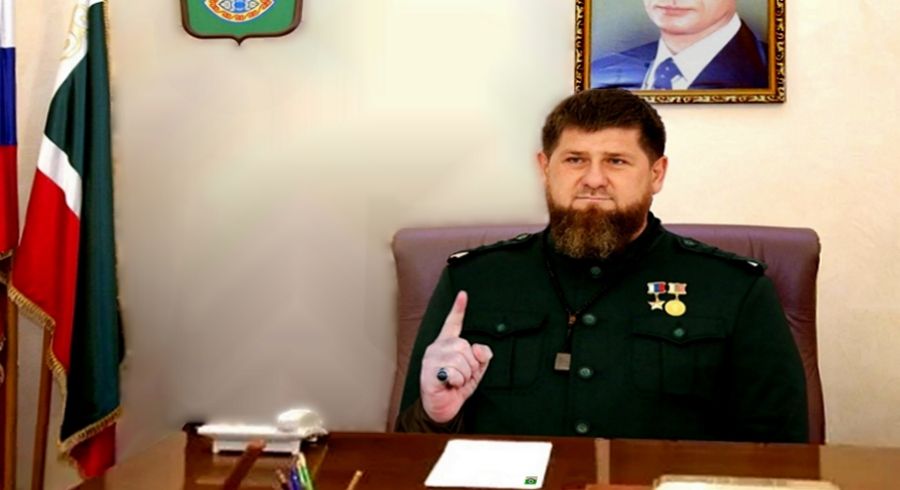
A new form of censorship: the authoritarian regime of Ramzan Kadyrov, in Chechnya, will ban music that it considers too fast or too slow, in order to stick to “the mentality and musical rhythm” of this Russian republic, a announced Culture Minister Musa Dadayev.
The Minister of Culture declared the limitation of "all musical, vocal and choreographic compositions to a tempo ranging from 80 to 116 beats per minute (BPM)", reports the Russian news agency TASS.
The objective?
Protect national music and eliminate "pollution" from the West for its majority Muslim population:
“It is unacceptable to borrow musical culture from other peoples,” added the Minister of Culture.
New Chechen musical creations must therefore correspond to "the Chechen mentality and musical rhythm", to transmit "to the people and to our children the future of the cultural heritage of the Chechen people", explained Musa Dadayev, quoted by CNN.
Artists have until June 1 to modify music that does not correspond to these new criteria.
Remove decadence from the West
With this ban, Chechnya targets, among other things, many styles of Western music ranging from pop to techno.
A large part of the homosexual communities in Chechnya identify with the styles of electronic, house, trance and even techno music. However, they are victims of the worst repression since 2017. A complaint for “genocide” was even filed by associations before the International Criminal Court.
Ramzan Kadyrov, head of the party since 2007, has used his mandate to stifle all forms of dissent.
|
|
|
|
| Emily Jackson for DayNewsWorld |
 |
DIGNITAS INFINITA THE VATICAN DEFINED
THE CONCEPTION OF HUMAN DIGNITY | 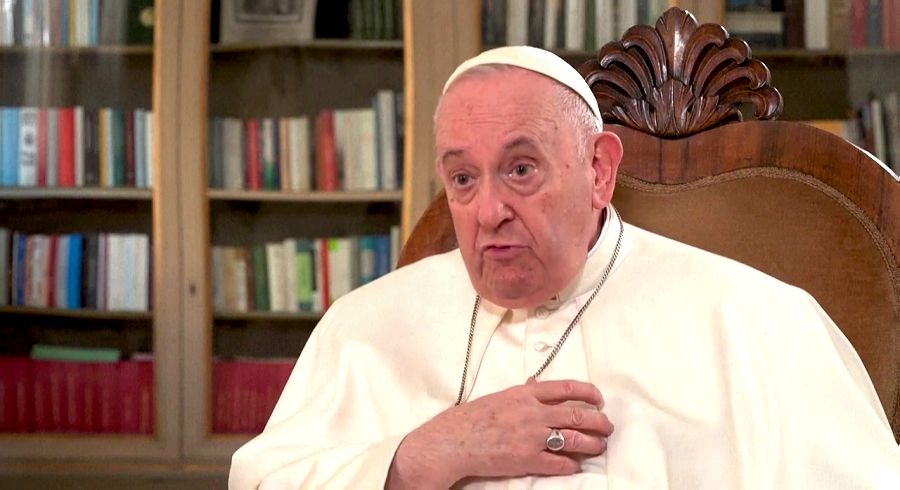
In a new text published this Monday, April 8, the Vatican lists around fifteen "concrete and serious violations" of "human dignity", including abortion, surrogacy, euthanasia, while standing up against the criminalization of homosexuality.
Called “Dignitas infinita” (“An infinite dignity”), this official document of around twenty pages approved in March by Pope Francis can be read as a way of healing internal divisions within the Church, after criticism accusing Pope Francis of betraying Catholic doctrine, particularly on LGBT+ issues.
We find there the key themes of Jorge Bergoglio's pontificate, such as war, migrant rights, poverty, ecology or social justice, associated among others with bioethical questions or linked to digital violence.
Around fifteen “concrete and serious violations”
The fruit of five years of work, the declaration published by the Dicastery for the Doctrine of the Faith, the powerful organ of the Holy See responsible for dogma, reaffirms the traditional line of the Church by listing around fifteen “concrete and serious violations” dignity, including abortion and surrogacy (GPA).
On the end of life, the Church reiterates its firm opposition to euthanasia and assisted suicide while a bill on the end of life opening the right to "assisted dying" must be presented this Wednesday in Council ministers in France.
The Vatican also strongly denounces the "gender theory", according to which sexual identity is determined by education and environment, and not by genetic differences.
“Any sex change intervention risks, as a general rule, threatening the unique dignity that a person has received from the moment of conception,” states the text, emphasizing “the need to respect the natural order.”
Against the criminalization of homosexuality
At the same time, the Church stands against the criminalization of homosexuality - still in force in many countries, particularly in Africa - and denounces "the fact that, in certain places, many people are imprisoned, tortured, and even deprived of the good of life solely because of their sexual orientation.”
“We talk little about this violation of human rights [...] and it is painful that some Catholics defend these unjust laws,” lamented during a press conference the prefect of the dicastery, Argentine Cardinal Victor Manuel Fernandez, close of the pope and signatory of the text.
|
|
|
|
| Jaimie Potts for DayNewsWorld |
 |
TURKIYE A SCANTING BACK FOR ERDOGAN DURING THE MUNICIPALS | 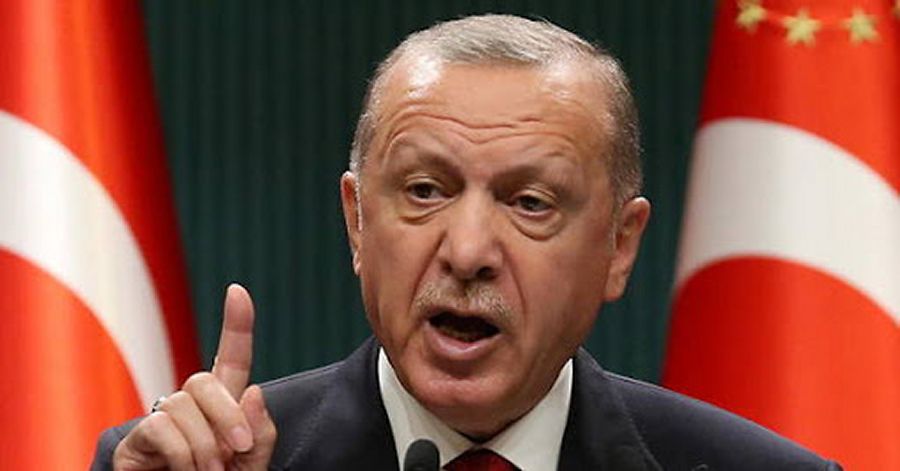
Less than a year after his re-election in May 2023 as head of Turkey against a candidate nominated by six opposition parties, President Recep Tayyip Erdogan suffered on Sunday March 31, thanks to municipal elections, the worst political setback that has been inflicted on him since he came to power in 2002.
Turkish President Recep Tayyip Erdogan conceded on Sunday the historic victory of the opposition in the municipal elections, which according to him constitute a "turning point" for his camp, in power since 2002. The counting of nearly 99% of ballot boxes across national confirms that the Turkish opposition has inflicted its worst electoral debacle on the head of state's AKP (Islamo-conservative) party in two decades.
“We didn’t get the results we wanted.” Turkish President Recep Tayyip Erdogan conceded "a turning point" for his camp on Sunday March 31, after the historic victory of the opposition in the municipal elections.
The leading opposition party, the secular Republican People's Party (CHP), beat the ruling Justice and Development Party (AKP) in number of votes, totaling 37.7% of the votes cast. , compared to 35.5% for the AKP. Not only does the opposition retain the town halls of Istanbul and Ankara, but it has imposed itself in a large number of other cities and villages that it had not managed to conquer until then, including strongholds of the AKP.
For many observers, the very popular mayor of Istanbul, Ekrem Imamoglu, now has a route to the 2028 presidential election. The CHP, a social democratic party, has won many other town halls, such as in Bursa, an important industrial city in the northwest of the country, which had been acquired by the AKP since 2004. Besides Izmir, the third city in the country and stronghold of the CHP in the West, and Antalya, in the South, the first opposition movement achieved a spectacular breakthrough in Anatolia. He is leading the race in provincial capitals long held by the AKP.
“The voters have chosen to change the face of Turkey,” said CHP leader Ozgür Ozel. “Those who were ignored sent a clear message to those who run this country,” added CHP Mayor of Ankara, Mansur Yavas.
The pro-Kurdish DEM party has secured a comfortable lead in several large cities in the Kurdish-majority South-East, including Diyarbakir, the informal capital of Turkey's Kurds.
Erdogan promises to “respect the decision of the nation”
From his party headquarters in Ankara, in front of a dejected and unusually silent crowd, the Turkish president promised to “respect the decision of the nation”. Resigned, he spoke of the "four years of work (...) not to be wasted" between now and 2028, a way of ruling out the possibility of an early election which would allow him to run again.
The country's very poor economic situation, inflation, the rate of which reached 80% at the end of 2022 and remained at 67% in February, and the resulting increase in the cost of living largely explain the verdict of the voters. These factors likely encouraged disaffected AKP voters to stay home. |
|
|
|
| Andrew Preston for DayNewsWorld |
 |
THE OLD INFRASTRUCTURE IN THE UNITED STATES THE COLLAPSE OF THE BALTIMORE BRIDGE
HIT BY A CARGO | 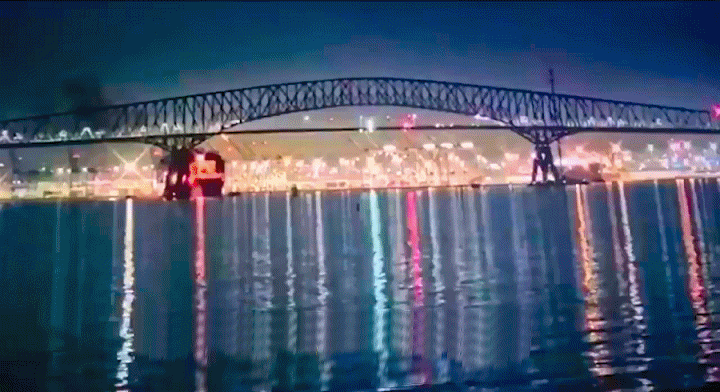
The collapse of the Baltimore bridge could cost reinsurers several billion dollars, Bruce Carnegie-Brown, chairman of Lloyd's of London, the London insurance and reinsurance market, said Thursday. The Dali, a Singapore-flagged container ship, was leaving the port of Baltimore in Maryland when it struck a bridge pier. The impact caused most of the bridge to fall into the Patapsco River, blocking shipping lanes and forcing the indefinite closure of the Port of Baltimore, one of the busiest on the US East Coast. .
Biggest Marine Insurance Loss
This “tragedy has the potential to become the largest marine insurance loss on record.” The previous record was the disaster of the luxury cruise liner Costa Concordia in 2012. According to analysts at Morningstar DBRS, the tragedy could result in up to $4 billion (3.71 billion euros) in insurance claims.
Lloyd's, with more than 50 member companies, is active in the marine and property insurance markets. In 2022, it recorded gross premiums of more than 6 billion pounds (7.01 billion euros) in maritime, aviation and transport insurance and reinsurance. North America is its largest market. Bruce Carnegie-Brown also added that the insurer had set aside £1.6 billion in reserves over the past two years for planes stranded in Russia following the invasion of Ukraine. Earlier today, Lloyd's reported a pre-tax profit of £10.7 billion for 2023.
The obsolescence of American infrastructure in question
Named the “Dali”, the boat began a 27-day journey, interrupted after half an hour. It measures some 300 meters long – the equivalent of three football fields – and 48 meters wide, with a draft of around 14 meters. Its maximum load is 116,000 tonnes. However, the cargo ship hit a pile of the structure of the Francis Scott Key Bridge in Baltimore, located in the state of Maryland in the United States, 3 km long, and caused its collapse.
This was built in 1977 and was not specially designed to withstand this type of accident, while the channel did not have any protection. With a main span of 400 meters, it was the second longest continuous truss bridge in the United States.
The accident, which left six people missing, now presumed dead, rekindles an old debate on the dilapidation of American infrastructure, in particular that of bridges, even if it is difficult to see how any steel structure could have withstood such a shock.
The collision between the container ship Dali and the largest bridge in the Maryland metropolis shuts down a major access point for international trade on the East Coast, a strategic crossroads for automobiles, coal and sugar. |
|
|
|
| Garett Skyport for DayNewsWorld |
 |
WINTER FINISHES THE BEAUTY OF THE SPRING
|
|

To face this season and arrive at the radiant summer a few steps are essential. 
During the winter the skin has thickened from where you have to chase the toxins gently.
Already we will do the spring cleaning from the inside.
1 ° Take each morning a glass of hot water with a lemon juice.
2 ° We will remove this veil of dull complexion by doing a cleansing of skin which will revitalize your cells and your blood circulation. You have an effective trait '' Clay Pure Purifying Cleansing Gel Of L'Oreal ''. By posing it we try to drain manually. Know that your physiotherapist can also drain your face thanks to his Cellule M6 machine. Your circulation will get back in shape.
3 ° .Pause a moisturizing mask you find very good at Marionnaud or Sephora. Another solution is to make a homemade mask: mix a half of very ripe avocado with a teaspoon of honey. Leave for 10 minutes.
4 ° For your day cream use a light anti uva fluid (in La Roche-Posay Anhelios pharmacy) (DayWear D'Estée Lauder cream) and a little secret to add a little self-tanner.
5 ° In the evening take richer creams to moisturize like the traditional blue box Nivéa.
Finally if you really want to really have a bright face go to your dermatologist and ask -the two three hyaluronic acid punctures at the corner of the lips of the eyes and then if the fatigue is felt on the forehead a sting of botox.
You must suffer to be beautiful.
|
|
|
|
|
|
|
|
| Mia Kennedy for DayNewsWorld |
 |
THE ISLAMIC STATE IN KHORASSAN
A DANGER FOR RUSSIA AND EUROPE | 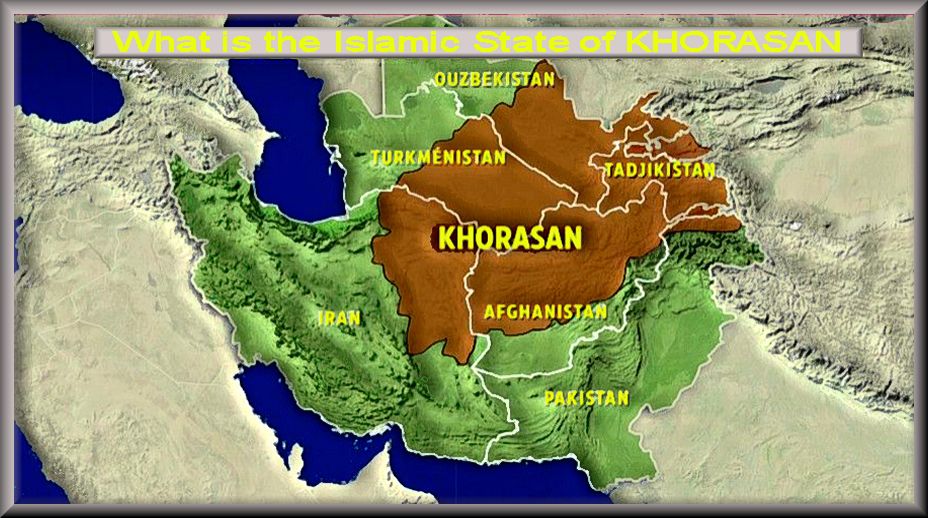
Only a few days after the Moscow drama and a defense council held on Sunday evening for France reverted to the Vigipirate emergency attack plan. This Monday, the President and the Prime Minister increased the number of announcements to justify the measure and ensure their determination in the face of the jihadist threat apparently back in force. Two elements of context allow us to understand this government decision. The arrival of the Olympic Games first poses a significant threat of jihadist attack. The threats made against educational establishments repeatedly over the past week also remind us of this.
The other factor obviously remains the Moscow attack which more broadly reveals the renewed activity of Daesh in Khorasan (EI-K), which could also be described as Daesh in Afghanistan.
The Islamic State in Khorasan (IS-K)
EIK operates primarily in the Afghanistan-Pakistan zone, but is present throughout historic “Khorassan” – a region that spans parts of Afghanistan and Pakistan but also Iran and other countries from Central Asia. The Islamic State of Khorasan, “EI-K” is considered the “most bloodthirsty in Afghanistan”, according to a note published in 2021 by the French Institute of International Relations (IFRI).
Created in 2015, the EIK aims to establish a “caliphate” – a system of governance subject to the strictest application of sharia and placed under the authority of religious leaders – in this region straddling South Asia and Central Asia.
The EIK shares the ideology of its parent organization, the Islamic State group, which promotes an extreme interpretation of Islam and views secular governments, as well as non-Muslim civilian populations as well as Muslim groups and individuals who do not share its view of Islam as legitimate targets.
Following the US withdrawal from Afghanistan in 2021, EIK's main objectives have been to challenge the legitimacy of the Taliban currently in power in the war-ravaged country, to assert itself as the legitimate leader of the Muslim community in its area and to appear as the main regional adversary of the existing regimes.
Russia targets EIK
Russia is its main target. “IS-K has been fixated on Russia for two years, frequently criticizing President Vladimir Putin in its propaganda,” Colin P. Clarke, a counterterrorism analyst at the Soufan Group, a security consulting firm based in Washington, told the American media. New York. The terrorist group considers that “the Kremlin has Muslim blood on its hands” since Russian interventions in Afghanistan, Chechnya and Syria.
In September 2022, the terrorist group claimed responsibility for the suicide attack against the Russian embassy in Kabul.
Additionally, Moscow's alliances with regimes opposed to the Islamic State group, including Syria and Iran, have made Russia a major adversary in the eyes of the terrorist organization and its affiliates. In particular, Russia has been a key ally of Syrian President Bashar Al-Assad since the start of Syria's civil war in 2011, and provides him with military support to enable him to fight various groups seeking to overthrow him, including the Islamic State.
Europe also in the crosshairs
By striking Russian targets, EIK seeks in part to deter Russia from further involvement in the Middle East. But these attacks also bring great publicity to his cause and aim to inspire his supporters around the world.
The Moscow attack, which follows January's attack in Iran, suggests that ISIS is intensifying its efforts to export its ideological struggle directly to the territories of sovereign nations. It is a carefully calculated strategy that is likely to strike fear into many capitals with “new planned actions” from Russia to Europe.
The threat from ISIS to Europe is real. Jihadist groups have recomposed in Afghanistan, some linked to the caliphate in Syria or Iraq which fell in 2020, and bring together several jihadist tendencies which, historically, have always sought to destabilize Central Asia and Europe. There we find in particular Tajik groups which have been very active in recent years, planning attacks on the continent thanks to close Chechen or Ingush networks.
Just last Tuesday in Germany, two Afghan jihadists were arrested on suspicion of planning an attack on the Swedish Parliament. One of them is believed to be a member of EI-K. The group is therefore no less in the sights of Western authorities.
According to the specialist Hugo Micheron: "European jihadism has been structured for around 30 years. [...] and if we want to understand, schematically, the way in which the development of jihadism worked, we must take an interest in a movement that would be pendulum, like that of the tides, with periods of low tide, periods of ideological recomposition, and periods of high tide […].
The last, being the period of attacks between 2014 and 2018, roughly, when Daesh was very structured and organized in Syria and Iraq, and had logistical capabilities to project terrorist networks towards Europe.
The next one seems to be coming...
|
|
|
|
| Alize Marion for DayNewsWorld |
 |
ISLAMIST ATTACK IN MOSCOW
139 DEAD AND THE "EI.K" | 
Russia is counting its dead. Around 8 p.m. on Friday evening, a shooting took place in a concert hall in the suburbs of Moscow. The attack, which left 115 dead at this point, was directly claimed by the Afghan branch of the Islamic State.
This Saturday morning, the Kremlin announced that it had arrested 4 alleged attackers, whom they accuse of being “in contact with Ukraine”. Ukraine has again denied being linked to the attack which left 115 dead in Moscow. The death toll from the attack claimed by the jihadist group Islamic State (IS) against a concert hall in the suburbs of Moscow on Friday rose to 115 dead and is expected to "rise further", the Russian Investigative Committee announced on Saturday. .
Investigators previously said the suspected perpetrators used "a flammable liquid" to set the concert hall on fire. Investigators say they seized “automatic weapons” during this assault.
The Islamic State of Khorasan ?
It is not yet known whether the perpetrators belong to the terrorist group of the Islamic State of Khorasan, “EI-K”, considered the “most bloodthirsty in Afghanistan”, according to a note published in 2021 by the French Institute of Relations. International (IFRI). Khorasan means “where the sun comes from” in Persian. This is the medieval name for Afghanistan, which at the time included parts of Turkmenistan, Uzbekistan and Tajikistan.
Russia is its main target. “IS-K has been fixated on Russia for two years, frequently criticizing President Vladimir Putin in its propaganda,” Colin P. Clarke, a counterterrorism analyst at the Soufan Group, a security consulting firm based in Washington, told the American media. New York. The terrorist group considers that “the Kremlin has Muslim blood on its hands” since Russian interventions in Afghanistan, Chechnya and Syria.
In September 2022, the terrorist group claimed responsibility for the suicide attack against the Russian embassy in Kabul. They are also behind an attack which left 84 dead in Iran last January.
Last Tuesday in Germany, two suspected Afghan jihadists were arrested on suspicion of planning an attack on the Swedish Parliament. One of them is believed to be a member of EI-K. The group is therefore no less in the sights of Western authorities. The United States had also warned Russia of a possible attack.
The Kremlin, for its part, announced the arrest of eleven people, including the “four” attackers. “The director of the FSB, Mr. (Alexander) Bortnikov, informed Mr. Putin of the arrest of 11 people, including the four terrorists directly involved in the attack,” the presidency told Russian news agencies.
Furthermore, according to Russian media and MP Alexandre Khinstein, some of the arrested suspects are from Tajikistan. The authorities of this Central Asian country said they had “not received confirmation from the Russian authorities regarding the false information currently circulating on the involvement of Tajik citizens.”
On a day of national mourning,
Russian President Vladimir Putin announced that Sunday March 24 would be a day of national mourning, in a television speech broadcast the day after the attack, which he described as a "bloody and barbaric terrorist act." which left 115 dead near Moscow, “peaceful and innocent people, (…) including children, adolescents, women”. “I express my most sincere and deep condolences to those who lost their loved ones,” he said.
The Russian leader had not yet spoken publicly about the terrorist attack against the Crocus City Hall – a huge concert hall located in Krasnogorsk, a suburb near Moscow –, the deadliest in the country in twenty years.
|
|
|
|
| Jaimie Potts for DayNewsWorld |
 |
HOW TO KEEP
PERFUME ALL DAY ?
|
|

But why some skins do not hold perfume and some yes ?
You may have never calculated it but the skin is alive, it breathes, it sweats, it is even acid sometimes.
That's what leads us to say "this perfume is better than me".
The final scent is not the same as on the perfume paper strip or your best friend.
The lucky ones have a skin that makes the perfume last while others have an epidermis that does not hold it.
How to smell good all day ?
Your skin does not retain the scent ?
Perfume_you elsewhere on your body.
Have you noticed how the hair feels cold tobacco a day after night ?
This is because they absorb and retain the smells perfectly.
Its conditioning and composition allow it to hold much longer on the skin.
One or two pschitt of perfume in your hair and you're sure to smell good all day. Be careful not to use scented hair products before spraying.
Be careful not to spray perfume on light clothing or you'll try to stain it
And if you had a solid perfume ?
a very concentrated fragrance presented in the form of a wax.
To perfume, warm a dab of product in your hands and apply it.
The disadvantage ?
Its price is often excessive. |
| |
|
| Mia Kennedy for DayNewsWorld |
|

|
BEAUTY RITUAL
|
|

The e-containment allows us to rejuvenate.
And yes thank you for teleworking !
Well we are getting fat a bit, of course, because our best friend is the refrigerator and the cupboards.
But do not panic, the surgical clinics have remained open.
Hence a little liposuction over there over here and voila.
You can also have a facelift or eyelid surgery.
Easier small bites on the forehead from botox or hyaluronic acid.
But if not here is the new fad to remove your wrinkles here is the secret.
This ritual is to be done at least for a month either in the morning or in the evening or when you have the courage.
First with a cotton ball soaked in olive oil to remove makeup.
Then rinse the face with hot water and dry it, finally remove make-up with micelar water.
Then rinse her face again with ice water, then day cream and night cream serum and the ritual is over.
With these gestures your face will be smoother and you will gain five years.
Towards the bathroom, I will begin my ritual.
|
|
|
|
| Mia Kennedy for DayNewsWorld |
 |
KATE MIDDLETON WITH CANCER | 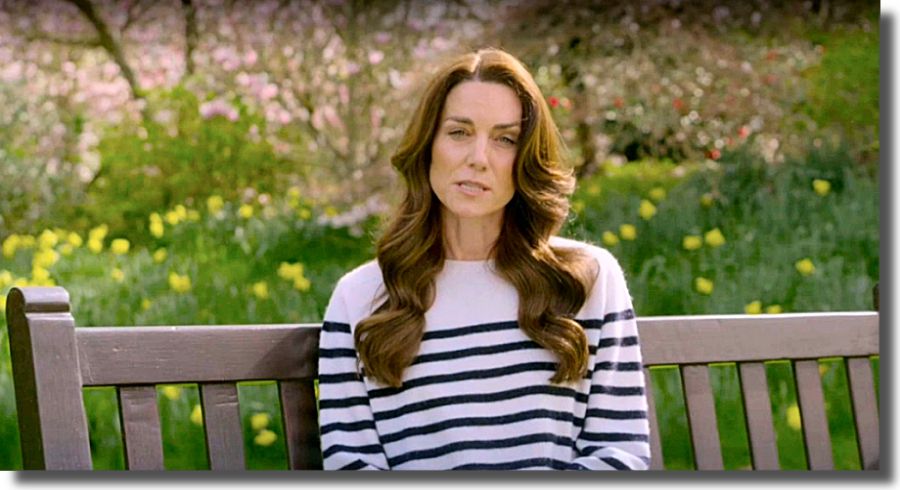
Kate Middleton comes out of silence. Rumors regarding his state of health had been circulating for several months.
The Princess of Wales therefore spoke this Friday, March 22, 2024, after having renounced all her commitments since her operation in mid-January.
“It’s been a very tough few months for our whole family,” the princess begins in a video posted on Instagram.
“In January I underwent major abdominal surgery in London.
At that time, my lesions were thought to be non-cancerous.
The operation went well, but during the tests which followed this operation, we discovered cancer,” she solemnly announces, specifying that preventive chemotherapy was recommended to her by her medical team.
“We are doing everything, William and I, to face the news in the best possible way for our young family,” she continues, adding that she took the time to explain what she was going through to her children, George, Louis and Charlotte .
“It takes time to recover from this huge surgery, but the most important thing is to explain everything to the children, in a way appropriate to their age, and to reassure them,” she says.
“As I told them, I am doing well, and I am stronger every day […]. Having William by my side is a great source of support,” she wants to reassure.
Rumors about the state of health have multiplied since January 16, 2024 after the hospitalization of the Princess of Wales for a planned abdominal operation.
Kate Middleton was released from the London Clinic ten days later, on January 29, to continue a long convalescence in Windsor.
British Prime Minister Rishi Sunak wished the princess a “full and speedy” recovery, saying in a statement that he “looked forward to seeing her return when she is ready”.
|
|
|
|
| Kate White for DayNewsWorld |
 |
HOW TO FINANCE AN INDUSTRY
OF EUROPEAN DEFENSE ? | 
Top European officials, meeting in Brussels on Thursday March 21, 2024 at a European Council, will discuss ways to finance the European defense industry to meet Ukraine's needs and strengthen the strategic autonomy of the continent. Theidea, according to the President of the European Council Charles Michel, is to put the European economy " on a war footing ".
Find 100 billion euros
The heads of state and government meeting on Thursday for the first day of their summit are unanimous on the principle: additional resources must be allocated to the defense industry. The European Defense Industry Program (EDIP) is seen as an appropriate starting point in this regard.
However, current EDIP funding is estimated at only €1.5 billion, which some consider insufficient. According to the European Commissioner for the Internal Market, Thierry Breton, as well as Estonia, the European Union would need around 100 billion euros to have a significant impact. Finnish Prime Minister Petteri Orpo, known for his budgetary orthodoxy, stressed the need to finance defense to strengthen European industry and support Ukraine.
Discussions focus on finding new sources of financing outside the EU budget, with the exploration of innovative solutions, such as a European loan on financial markets, encouraging large banks to finance defense production, or even the use of Russian assets frozen in Europe. The European Investment Bank's (EIB) increased involvement in the defense sector is also gaining popularity.
What sources of financing ?
Currently, the Bank can only finance dual-use equipment and products — applicable to both civilian and military sectors — for which the majority of revenue comes from the civilian sector and not the military sector. And while 14 leaders have called for the Bank to go beyond its current mandate, not all EU member states share this view. The European Investment Bank could expand its defense lending criteria EIB could start easing its lending criteria as early as Thursday, if it receives the final green light from all 27 member states to unlock more direct investment in defense.
Some member states are considering using profits from frozen Russian assets to support Ukrainian defense, in line with the EDIP program, and possibly to provide direct military assistance to Ukraine, as proposed by the European Commission. At the start of the war, the EU blocked around 210 billion euros in assets of the Russian Central Bank. The interest on these products would make it possible to provide financial aid to Ukraine of 3 billion euros per year.
The idea of issuing Eurobonds for joint financing faces resistance, notably from fiscally cautious member states such as Germany, Denmark, Sweden and others. They highlight legal uncertainties and prefer to exploit already existing financial instruments, such as the EIB or the EU budget.
The Finnish Prime Minister was therefore quite cautious: “We have to find ways to use the instruments we already have, such as the EIB or the EU budget,” declared Mr Orpo, after stated that “we have not yet decided on the use of Eurobonds”.
Discussions on security financing encompass not only defense but also other aspects of the continent's security, with a desire to strengthen crisis preparedness and response at EU level.
|
|
|
|
| Alize Marion for DayNewsWorld |
 |
FINLAND THE LAND OF HAPPINESS PAR EXCELLENCE | 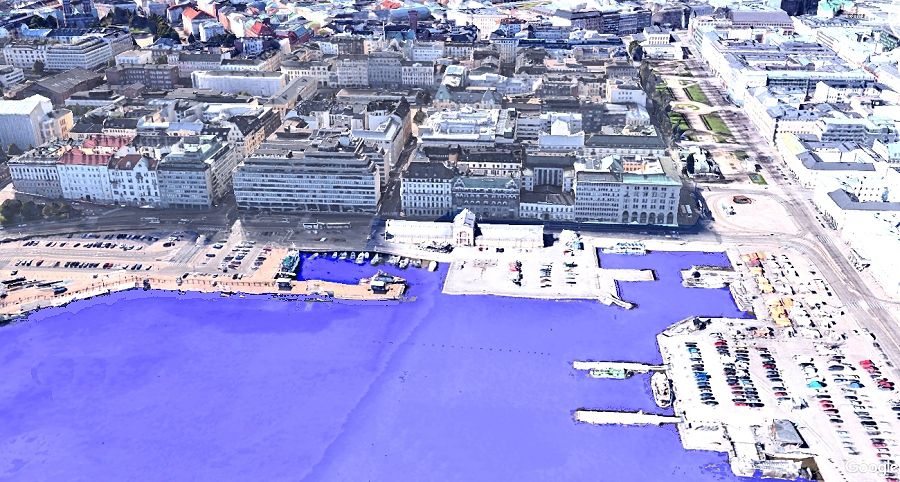
Finland maintains its leading position in terms of global happiness, with the title solidified for the seventh consecutive year, according to a report released by the UN on Wednesday. The Nordic countries dominate the top ten places in the rankings, with Denmark, Iceland and Sweden closely following Finland, while France comes in 27th.
On the other hand, Afghanistan, in the grip of a humanitarian crisis since the return of the Taliban in 2020, occupies last place among the 143 countries evaluated. For the first time in more than 10 years, the United States and Germany are not in the top 20 happiest nations, ranking 23rd and 24th, respectively. Costa Rica and Kuwait enter the top-20, positioning themselves in twelfth and thirteenth place.
None of the most populous countries in the world are among the top twenty in the ranking. According to the report, only the Netherlands and Australia in the top ten, and Canada and the United Kingdom in the top twenty, have more than 15 or 30 million inhabitants respectively.
The biggest declines in the happiness index since the period 2006-10 concern Afghanistan, Lebanon and Jordan while Serbia, Bulgaria and Latvia show the biggest increases.
What are the six key factors ?
The World Happiness Report, published annually since 2012 by the United Nations Sustainable Development Solutions Network, is based on an assessment of individual happiness as well as economic and social data. Six key factors are taken into account: social support, income, health, freedom, generosity and absence of corruption.
According to Jennifer De Paola, a researcher specializing in the subject at the University of Helsinki, proximity to nature and a good work-life balance are crucial elements for the satisfaction of Finns. In addition, trust in institutions, low corruption and free access to healthcare and education are also determining factors for happiness in this country.
The annual report also highlights higher levels of happiness among younger generations than older ones in most regions, although exceptions exist. For example, the happiness index has declined sharply among those under 30 in North America, Australia and New Zealand since 2006-2010, and is now lower than that of older generations in these regions. On the other hand, it increased in all age groups in Eastern Europe over the same period.
The generation gap has widened everywhere in the world except Europe, which concerns the report's authors. |
|
|
|
| Boby Dean for DayNewsWorld |
 |
PRESIDENTIAL VLADIMIR PUTIN PLEBISCENT FOR A FIFTH MANDATE | 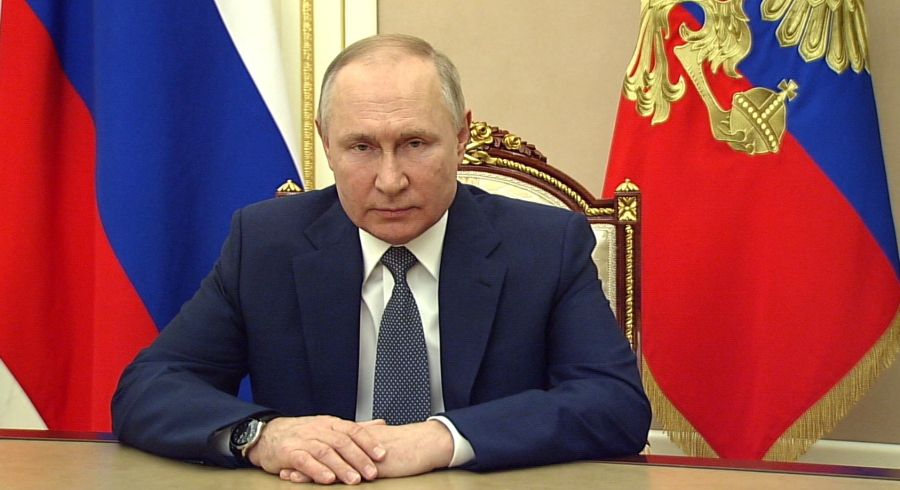
Vladimir Putin, the master of the Kremlin, in power for almost a quarter of a century, was re-elected in the presidential election on Sunday with more than 87% of the vote. Results worthy of a plebiscite.
A record for someone who had always received between 64 and 68% of the votes in previous elections.
The Russian authorities left no room for opponents of power: the three other candidates selected were all in line with the Kremlin, whether it was Ukraine or the repression which culminated in the death of Alexei Navalny in an Arctic prison in February.
Beforehand, the authorities had insisted that the Russian people must be "united" behind their leader, presenting the Ukrainian conflict as hatched by the West to destroy Russia. The assault on Ukraine, launched by the master of the Kremlin in February 2022, was the backdrop to the vote, especially as attacks on Russian territory have increased this week.
Addressing Russians at the end of the evening, Vladimir Putin thanked those who went to vote and who helped create the conditions for “internal political consolidation”. “I would like to thank you all, as well as all the citizens of the country, for your support and your trust,” he told his campaign team, before promising that Russia will stand up to all its adversaries.
"It doesn't matter who wants to intimidate us or how much, it doesn't matter who wants to crush us or how much, our will or our conscience. No one has ever succeeded in doing anything like this in history. This has not worked today and will not work in the future,” said the 71-year-old president.
Enough, according to Vladimir Putin, to create the conditions for “internal political consolidation”, two years after the start of the assault against Ukraine and the adoption of unprecedented sanctions by the West.
In his speech, Vladimir Putin, who will be able to run again after this new mandate to potentially remain in power until 2036, returned to the war in Ukraine by saluting the fighting soldiers who “risk their lives” to “protect historic territories of Russia.” He estimated that the Russian forces, on the offensive since the capture of Avdiivka in mid-February against a Ukrainian army lacking men and ammunition, had “completely the initiative” on the front.
The head of the Kremlin also attacked NATO and more specifically France in a press conference following the election, raising the possibility of a widening of the war. “It is clear to everyone that this conflict between Russia and NATO will be only a step towards a full-scale third world war. I don’t think this interests anyone,” he said, declaring that “NATO soldiers are present in Ukraine, we know it (…) they are being killed and in large numbers”.
After declarations by the President of the Republic Emmanuel Macron, opening the way to the possible sending of troops to Ukraine, Vladimir Putin sent a message to France “which only aggravates the conflict”.
He hopes "that she would rather do something to find peaceful solutions. France could play this role, all is not yet lost".
|
|
|
|
| Andrew Preston for DayNewsWorld |
 |
IN HAITI THEATER OF VIOLENCE BETWEEN GANGS AN AIR BRIDGE FOR HUMANITARIAN AID IS PUT IN PLACE | 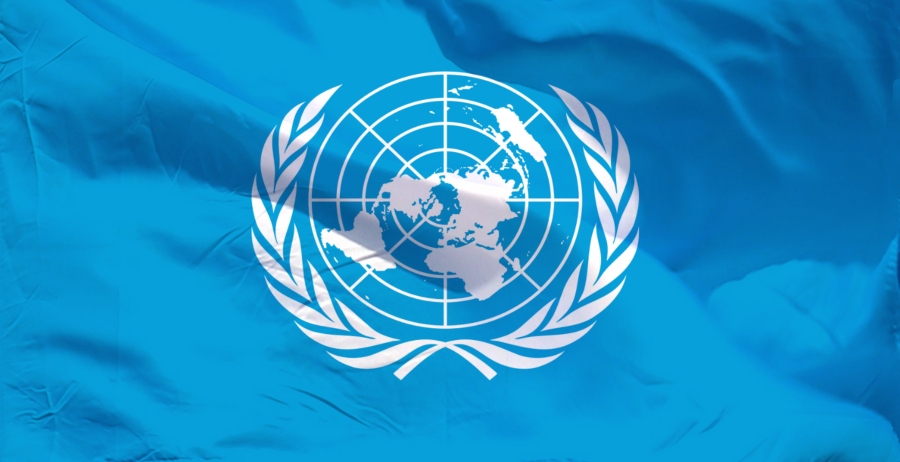
The United Nations will set up an "air bridge" between Haiti and the neighboring Dominican Republic to allow "the fluidity of humanitarian aid" to the country in crisis, announced the UN mission in Haiti on X, Wednesday March 13.
The UN mission also specified that a fraction of staff would be temporarily relocated "outside" the territory, while the arrival of other "crisis" staff was expected. This decision is not unique: the European Union announced on Monday that it had evacuated all of its personnel from Haiti. Foreign Affairs Minister Stéphane Séjourné also said France's "non-essential personnel" had been evacuated from the capital Port-au-Prince on Tuesday morning.
In addition, US Secretary of State Antony Blinken expressed hope on Wednesday that the new Haitian transition council could be formed "in the coming days", which would allow the deployment of a security force in the country plagued by gangs.
A country plagued by gangs
Indeed, since the end of February, the capital Port-au-Prince has been the scene of violence. Militias target strategic sites such as the presidential palace, police stations and prisons. Administrations and schools in the Haitian capital are closed due to clashes between the police and armed gangs, which increased during the weekend of March 9. Militias have attacked hospitals, forcing medical teams to flee with patients - including newborns - according to the International Organization for Migration (IOM). Since February 29, more than 160,000 civilians have been displaced in the Port-au-Prince region. Yanick Lahens, winner of the 2014 Femina Prize for her novel "Bain de Lune", has "never experienced such violence" in her country, which is going through an acute political and security crisis.
The departure of Ariel Henry, the Prime Minister, was one of the major priorities of the armed factions. In the absence of a president and Parliament - the last head of state, Jovenel Moïse, having been assassinated in 2021 - Haiti has not organized elections since 2016. Ariel Henry, accused by the Port-au-Prince prosecutor's office Prince of the murder of Jovenel Moïse, should have left office at the beginning of February. On February 28, he agreed to "share power" with the opposition, as part of an agreement stipulating elections within a year. However, this concession was not considered sufficient: Jimmy Chérizier, an influential gang leader nicknamed "Barbecue", had made threats on Tuesday March 5, referring to a "civil war leading to genocide" if Ariel Henry remained in power. .
Finally, the head of the Haitian government, who was stuck in the American territory of Puerto Rico, gave in to pressure from regional partners. His departure was announced during an emergency meeting bringing together Caricom members and UN representatives in Jamaica. “The government that I lead cannot remain indifferent to this situation. As I have always stated, no sacrifice is too great for our homeland, Haiti,” declared Ariel Henry.
A transitional governance agreement
Following the announcement of Ariel Henry's resignation, Guyana and Caricom President Mohamed Irfaan Ali said he was "happy" to announce "a transitional governance agreement paving the way for a peaceful transition of power ". According to him, this outcome should lead to “a short-term action plan in terms of security” and “free and fair elections”.
According to Haitian writer Yanick Lahens, the gangs "have national and especially international sponsors." Indeed, due to its geographical position, Haiti is an ideal place of passage for all traffic. “The less institutions function, the more it suits these people,” she says. She also denounces “a collusion between part of the political class” and the gangs.
However, there remains "hope", according to her, which is "outside Port-au-Prince, which is a monster which devours and hides the rest of the country". There is "another country in which there are very few police officers” or even “no police officers at all, and where things work". |
|
|
|
| Carl Delsey for DayNewsWorld |
 |
PORTUGAL A DARK BREAKTHROUGH
FROM THE EXTREME RIGHT | 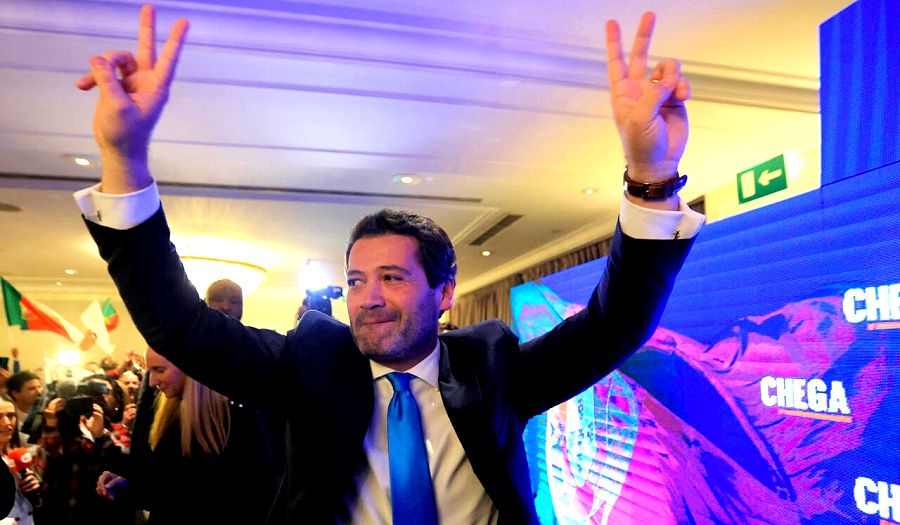
Early legislative elections recently took place in Portugal which saw Chega! (“Enough!”, CH)considerably improve its results by obtaining no less than 18.06% of the votes, which quadrupled the number of its deputies in Parliament, going from 12 to 48. Since March 10, 2024 CH therefore represents the third political force in Portugal, positioning itself behind the two main parties of center right (79 seats) and center left (77).
Since its founding on April 19, 2019, the Chega! continues to progress: it obtained its first seat in Parliament with its leader André Ventura during the legislative elections of October 2019; then 2 seats in the Legislative Assembly of the Autonomous Region of the Azores in October 2020; and finally, 12 seats in the national Parliament in the 2022 legislative elections, with nearly 7.38% of the votes.
An uninhibited Salazarism ?
André Ventura presented his political party in 2019 as a group of ordinary people, not an elite, individuals who suffer the consequences of the current system. He affirms that Chega's objective is not to restore Salazarism, but rather to be part of the right-wing populist trend which, for several years, has benefited many political groups in Europe. About Salazar, he said: “For the most part, Salazar has not solved the country's problems and has caused us to fall far behind in many respects. It did not allow us to have the development that we could have had, especially after the Second World War. » He adds: “You don't need a Salazar on every street corner, you need an André Ventura on every street corner. »
And yet there is a certain similarity between André Ventura (born in 1983) and António de Oliveira Salazar (1889-1975), who ruled Portugal with an iron fist from 1932 to 1968. In a worldview formulated in the slogan “God, homeland, family”, Ventura adds the word “work”.
In addition, Ventura seeks to seduce part of the electorate nostalgic for the new state. Whenever he can, he presents April 25, 1974, the day of the Carnation Revolution whose fiftieth anniversary is approaching, as the origin of the problems of Portuguese society.
During one of his speeches to Parliament in 2022, he defended the security forces, whom he considered discredited and silenced since that date, and described them as “heroes”. He also presents himself as a defender of the people, wishing to restore their “dignity”; In particular, he plans to highlight national workers and encourage the return of young expatriates.
Some analysts point out that although Ventura is not strictly "Salazarist", he does not hesitate to invoke the principles of Salazarism. Indeed, he adopts the ideological foundations of the new State: highlighting the family as the basis of society and publicly displaying his Catholic faith from 2020 - another key aspect of Salazarism - by showing himself at church alongside his wife Dina.
After his rise in Portugal, are European ambitions emerging for Chega ?
European ambitions
The Chega party embraces the themes of immigration and insecurity, central subjects in the programs of several of its European allies. From 2020, the Portuguese party joined the Identity and Democracy (ID) group in the European Parliament, which includes the Italian Lega, the French National Rally and the German AfD. Chega aspires to play the role of a “bridge” for the union of the rights, aiming in the long term to bring together all patriots within the same group.
Ventura focuses his criticism on Muslim immigration and what he calls "gender ideology", although he adapts them to the Portuguese situation. Portugal has recently experienced strong immigration (121,000 immigrants in 2022, 118,000 in 2023); a third of new arrivals come from Brazil but most of the others arrive from other countries outside the EU, notably India.
Ventura positioned himself in favor of stricter immigration control, proposing to create an offense of "illegal stay on Portuguese soil" and to impose annual quotas on the entry of foreigners based on their qualifications. and the needs of the Portuguese market.
It remains to be seen whether the leader of the right, Luis Montenegro, who won the legislative elections, will have to work with Chega to govern.
|
|
|
|
| Larry Ricky for DayNewsWorld |
 |
CHINA AN INCREASE IN THE MILITARY BUDGET CONTINUES IN A HOSTILE GEOPOLITICAL CONTEXT | 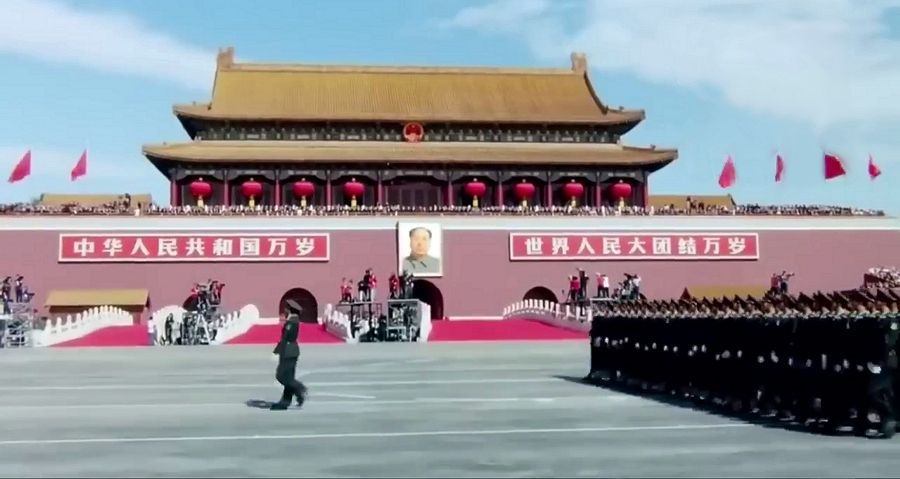
During the simultaneous annual meetings of the National Committee of the Chinese People's Political Consultative Conference and the National People's Congress, China revealed on March 5, 2024 an increase in its military budget, ranking it second in the world behind the United States, with growth of 7.2% in 2024, identical to that of the previous year. This increase was disclosed in the government activity report, distributed on the sidelines of the work of these two bodies linked to central power.
Beijing plans to allocate 1,665.5 billion yuan ($231.4 billion) for defense purposes, which is three times less than Washington's military spending. The Asian nation maintains a policy of "reasonable growth" of its military budget in order to "protect its sovereignty, security and development interests", said Lou Qinjian, spokesperson for the NPC session. In comparison, the United States retains the title of biggest defense spender, with $877 billion in 2022, according to the most recent data. China ($292 billion), Russia ($86.4 billion), India ($81.4 billion), Saudi Arabia ($75 billion), United Kingdom ($68. 5 billion), Germany ($55.8 billion), France ($53.6 billion), South Korea ($46.4 billion) and Japan ($46 billion) follow respectively.
In its proposed military budget, China's Finance Ministry stressed the need to focus resources on "key areas" considered "priorities" to boost technological advancement. This increase is part of "the full implementation of Xi Jinping Thought on military strengthening", specifies the document, adding that Beijing plans to provide "stronger financial guarantees to modernize national defense and armed forces in all areas, and to consolidate the integration of national strategies as well as strategic capabilities.
Chinese military spending has been increasing for several decades, broadly keeping pace with economic growth. However, this increase in the defense budget is in contrast to an unprecedented economic crisis that has shaken China for several years, thus underscoring the determination of the Chinese Communist Party (CCP) to continue its military efforts at all costs. Moreover, the country's official military spending figure is well below actual spending, a traditional practice of opacity in communist China, although this hardly fools observers. Last September, US Senator Dan Sullivan, a member of the Senate Military Committee in Washington, declared that China's "real" military budget was actually approaching $700 billion, according to analyzes by US intelligence services. i.e. more than three times the official amount announced by Beijing.
Military spending represents the largest item in the Chinese budget, absorbing around 40% of total central government spending. These expenditures are ten times higher than those devoted to education and almost five times higher than those allocated to science and technology. The Chinese government has stressed that military spending is "a priority", while spending in other sectors is all reduced "in accordance with the need for budgetary savings".
This military effort comes amid growing tensions between China and the United States since President Joe Biden took office in the White House in January 2022, as well as equally high tensions with Japan and other countries. from East Asia. The trend is viewed with suspicion by the United States, Australia, India and the Philippines, which are in dispute with China over control of islets and reefs in the South China Sea.
It also raises concerns in Taiwan, an island of 23 million inhabitants claimed by China, which hopes to "reunify" this island territory with the rest of the country, by force if necessary.
|
|
|
|
| Alize Marion for DayNewsWorld |
 |
THE RUSSIAN PRESIDENTIAL CAMPAIGN
THE WAR IN UKRAINE IS SILENCED | 
February 26 , 2024 marked the start of the first official debate of the Russian presidential campaign, broadcast on state television. A crucial date, when outgoing President Vladimir Putin, candidate for re-election, had announced, true to his habits during previous elections, that he would stand on the sidelines of the debates.
This 2024 electoral campaign is taking place in an unprecedented context: Russia has been immersed in a high-intensity war against Ukraine for two years; the Russian economy is suffering under the weight of heavy sanctions imposed by Western nations; several hundred thousand Russian citizens have fled the country; and the front swallowed up the lives of at least 75,000 Russian soldiers.
Faced with such circumstances, it would have been natural to expect the theme of war to dominate discussions during the electoral campaign. If one of the debates was actually devoted to this "special military operation", allowing the three candidates to present their vision of this crisis, with on the one hand an attachment to a total victory for the communist candidates (Nikolaï Kharitonov ) and nationalist (Leonid Sloutski), and on the other a desire to launch negotiations for the candidate presenting himself as liberal (Vladislav Davankov), the contours and conditions of these negotiations remained unclear.
The debates took an unexpected tangent, focusing on a range of diverse subjects: education, culture, economy, agriculture, demography, housing... The candidates themselves were not always present in person, being represented by members of their political party.
Soldiers' mothers and criticism of war
On the other side of the media prism, the war takes on a completely different reality. Within the Telegram channel "Le Chemin du Retour", bringing together members of the families of mobilized combatants and counting more than 70,000 subscribers, the second anniversary of the war is not an occasion for self-congratulations, but rather a commemoration day.
“It has already been two years since this special military operation mercilessly tears our hearts. It destroys our families, produces widows, orphans, and leaves our elders in isolation,” we can read in the poignant lines.
"Two years ago, all of Russia descended into chaos and horror. No more hope for a peaceful future. [...] We were all plunged into hell. Our families were the first to be crushed by the state machine, and your own families and friends risk suffering the same fate after our annihilation."
It was between September and October 2022, during the outbreak of the military mobilization which forced the Russian state to forcibly enlist and send to the Ukrainian front nearly 300,000 civilians, often poorly prepared for combat, that the first collectives of families of soldiers were born. Gathering in front of local administrations and sharing videos online, these women were not opposed to the principle of mobilization, but strongly criticized its chaotic implementation.
The central authorities then ordered local authorities to take into account the requests of these families and to endeavor to resolve the problems they raised. After several months of silence, the movement has regained vigor as the first anniversary of the mobilization approaches, at the end of summer 2023.
This inaugural anniversary was not only a symbolic moment: it also carried an expectation of demobilization.
Initially loyal and in favor of a new wave of mobilization to replace the first, the Telegram channel “Le Chemin du Retour” gradually evolved towards radicalization in the face of the refusal of the authorities to listen to calls for demobilization.
As the presidential campaign approaches, activists from women's groups have tried to contact candidates to share their demands. Only Boris Nadezhdine, opposed to the war, had given them a favorable reception, but was quickly prevented from appearing. During the televised debate on the "special military operation", candidate Davankov mentioned the families' wish to see an end to the war, without going any further. As for Vladimir Putin, he did not address the subject during his annual speech to the nation: the demobilization of fighters was not really on the agenda of this campaign.
This mobilization of mobilized women inevitably recalls the movements of the mothers of soldiers, born at the end of the war in Afghanistan: they were active and influential opponents of the two wars led by the Russian state in Chechnya, in 1994-1996 then in 1999-2004. Outside of periods of conflict, they have also saved thousands of conscripts from mistreatment, violence and mortal danger within the Russian army.
Soldiers' Mothers were one of the most powerful social movements in Russia in the 1990s and 2000s.
Are the wives of those mobilized taking up their torch, and can they influence the perception of the war in Russian society ?
The impossible public denunciation of the war
If the first years following the fall of the Soviet Union were marked by the emergence of the Soldiers' Mothers movements, a period of chaos and poverty, they were also distinguished by political pluralism and true freedom of expression. . Activists did not fear reprisals for expressing their opposition, and their demands were widely publicized by the media and supported by political actors.
However, few of these characteristic elements are found in the Russia of 2024. Although the movements of soldiers' mothers still exist, their leaders can no longer openly criticize the war. Any form of criticism is severely reprimanded. As the media space is strictly controlled, activists struggle to be heard outside of social networks.
The room for maneuver in discussions with military authorities is also very limited, because the army's action is itself restricted by the repressive context and the voracious demands of a resource-expensive war.
In addition, promises of financial support to fighters and their families paradoxically hinder the mobilized women's movement.
The attention of power
The dilemma proves just as thorny for the Russian authorities, which hesitate to adopt open repression against the women of those mobilized. The fighters on the front represent not only one of the pillars of the heroic narrative of the war, but also a sensitive and potentially dangerous group.
Just as the Kremlin has so far avoided sending conscripts aged 18 into combat to avoid provoking the anger of soldiers' mothers, it is currently sparing the wives of those mobilized.
It is imperative that the war narrative remains unchanged during the presidential campaign.
|
|
|
|
| Jaimie Potts for DayNewsWorld |
 |
OSCARS 2024 THE CROWN OF THE OPPENHEIMER FILM
AND CILLIAN MURPHY | 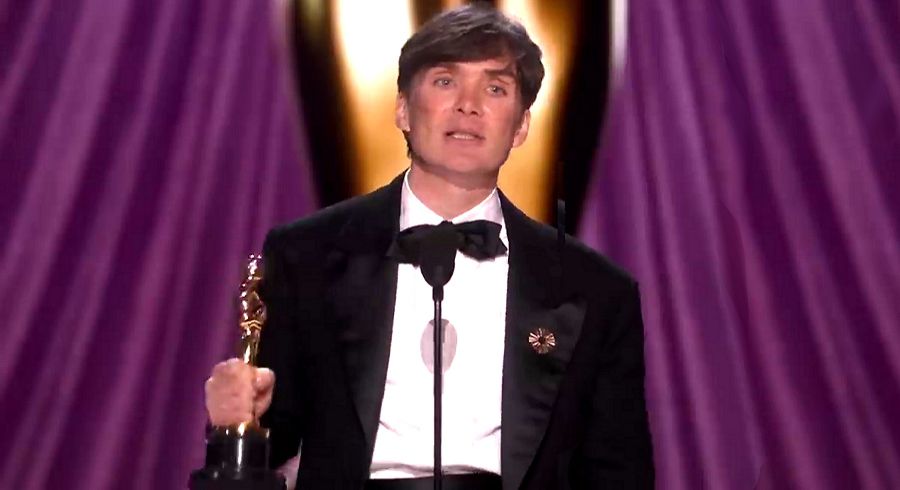
The predicted explosion really took place: “Oppenheimer” won the Oscar for best film on Sunday as well as six other statuettes, during an evening which also largely rewarded the film “Poor Creatures” by Yorgos Lanthimos.
As for the French film “Anatomy of a Fall”, it walked away with the Oscar for best original screenplay.
Acclaimed by critics and featuring a remarkable cast, Christopher Nolan's portrait of the father of the atomic bomb dominated the evening. “I would like to highlight the extraordinary team we have assembled for this film,” reacted the director, expressing his gratitude by winning the best director award and thanking all the actors.
With dozens of supporting roles, impeccably tailored costumes and characters tailor-made for a man of cinema whose acting intensity matches magnetic charisma, Cillian Murphy was named best actor for his portrayal of Robert Oppenheimer in the eponymous film by Christopher Nolan.
Between the actor and the director, a twenty-year collaboration was established, beginning in 2005 with “Batman Begins” and continuing with a series of cinematic successes, including “Inception” and “Dunkirk”.
A Palme d'Or, also, in 2006, for The Wind Rises by Ken Loach, a tribute to the Ireland of its roots. Not to mention a cult series called Peaky Blinders, in which he plays the main role. A beret, a cigarette and a steely look were enough to make the character of Thomas Shelby a leading figure on the small screen.
With “Oppenheimer”, Nolan finally offers his favorite actor a major lead role. "We made a film about the man who invented the bomb [...] so I want to dedicate this prize to peacemakers around the world," Murphy said, showing his Irish pride.
Robert Downey Jr, his on-screen antagonist, who plays a conservative bureaucrat orchestrating the public humiliation of the scientist, won the award for best supporting actor.
The film's triumph also resulted in other technical accolades: Jennifer Lame, the film's editor, who helped manage the film's extraordinarily complex plot, and cinematographer Hoyte van Hoytema, previously nominated for his work on Dunkirk by the same Christopher Nolan and composer Ludwig Göransson for best original music.
A complete triumph.
|
|
|
|
| Kate White for DayNewsWorld |
 |
THE OSCAR FOR BEST ACTRESS
FOR EMMA STONE IN POOR CREATURES | 
Emma Stone thought she couldn't live up to her character:
"I think because I had lived with her in my mind for so long and was so deeply in love with Bella, I was terrified that I wouldn't live up to the character." she said in an interview with Variety.
It is true that the actress delivered an unusual performance in the latest film Poor Creatures by Yorgos Lanthimos.
Bella Baxter's unbridled sexuality was already a challenge in itself for the 35-year-old actress.
And yet the interpreter of Mia in La La Land (2016) assured that “in a way, it was the easiest part because it was choreographed”.
He added, "Those scenes were quick. We knew exactly what we were doing. That was another aspect of it, as well as the way it was going to be filmed, with our incredible intimacy coordinator, our small crews and all the stay."
But what seemed infinitely more difficult for him to film was in particular his eating habits which made him downright nauseous "Learning to walk or eating 60 Portuguese cream tartlets, the first bite of which is delicious, but in the end, we really feels like throwing up,” she said.
An interpretation which earned her the Oscar for best actress.
|
|
|
|
| Kate White for DayNewsWorld |
 |
FIFTY YEARS OF GIGN
ELITE UNIT OF THE NATIONAL GENDARMERIE |
 "Save lives at the risk of your own”. On this Friday March 1st, the GIGN is celebrating its 50th anniversary. Specializing in high-risk operations, the elite unit of the national gendarmerie has built its reputation around spectacular interventions often linked to hostage-taking, sometimes of a terrorist nature. But the GIGN has much broader prerogatives. "Save lives at the risk of your own”. On this Friday March 1st, the GIGN is celebrating its 50th anniversary. Specializing in high-risk operations, the elite unit of the national gendarmerie has built its reputation around spectacular interventions often linked to hostage-taking, sometimes of a terrorist nature. But the GIGN has much broader prerogatives.
Creation of the GIGN in 1974
Although the GIGN was created in 1974, shortly after the Munich attack in September 1972, it was not the only affair that pushed the French Gendarmerie to think about creating a special force.
Two emblematic and painful cases, which took place one in 1969 and one in 1971, led us to realize that operations with people not trained for this led to tragedies.
The first of these cases was that of Cestas which took place in February 1969; A father who lost custody of his two children carries out his threats and kills them.
The other case, also widely publicized, took place in September 1971 in the Clairvaux remand center. Two inmates, Claude Buffet and Roger Bontems, take the nurse and a guard hostage. And slaughter them coldly.
These two tragedies had a painful impact on “the Gendarmerie as a whole but also at the level of public opinion where it was increasingly difficult to accept that the Gendarmerie did not have the means to intervene,” according to the founder of GIGN Christian Prouteau ON Cnew. “Despite everything, it was Munich which forced the decision” to create the GIGN.
Faced with this multiplication of tragedies, hostage-takings and plane hijackings (80 in 1969 alone), the idea of a special intervention force is gaining momentum.
Elite unit of the national gendarmerie
This elite unit of the national gendarmerie, specialized in dangerous missions and crisis management, carried out several significant interventions, from Loyada to Djibouti in 1976, with the hostage-taking of a student bus, in Ouvéa in 1988, passing through Marignane airport in 1994. More recently, the GIGN notably lent a hand to the RAID, during the assault on Dammartin-en-Goële in 2015, intended to neutralize the Kouachi brothers, guilty of the The attack on Charlie Hebdo on January 9 of this year. It was also the GIGN which was in charge during the negotiations with Radouane Lakdim, the murderer of Arnaud Beltrame in Trèbes in 2018, who was finally shot dead.
Before intervening, the GIGN must first be alerted by what is called a “first responder”.
Crisis management missions
The GIGN's missions are multiple: hostage taking, intervention on trains, sensitive sites such as nuclear power plants, close protection, surveillance of dangerous individuals, flagrante delicto operations, extortion of funds... Actions which are part of all areas such as air and maritime counter-terrorism... Since the beginning, the men of the GIGN have carried out famous operations in multiple crisis zones in France and abroad, freeing or evacuating more than 600 hostages and 700 French nationals and foreigners under threat.
The unit is also involved in the protection of the President of the Republic through the GSPR (Security Group of the Presidency of the Republic).
More discreetly, the GIGN has an intelligence section and has specific means to carry out these missions.
Finally, the GIGN's action extends abroad where it participates in training and shares the expertise of the national gendarmerie in war zones. The GIGN also ensures the security of all French embassies throughout the world. The military even has an intervention capacity in the event that something happens there.
A prerogative made possible by the extraterritoriality of these embassies. |
|
|
|
| Jenny Chase for DayNewsWorld |
 |
SUPER TUESDAY
TOWARDS A TRUMP / BIDEN DUEL
|
|
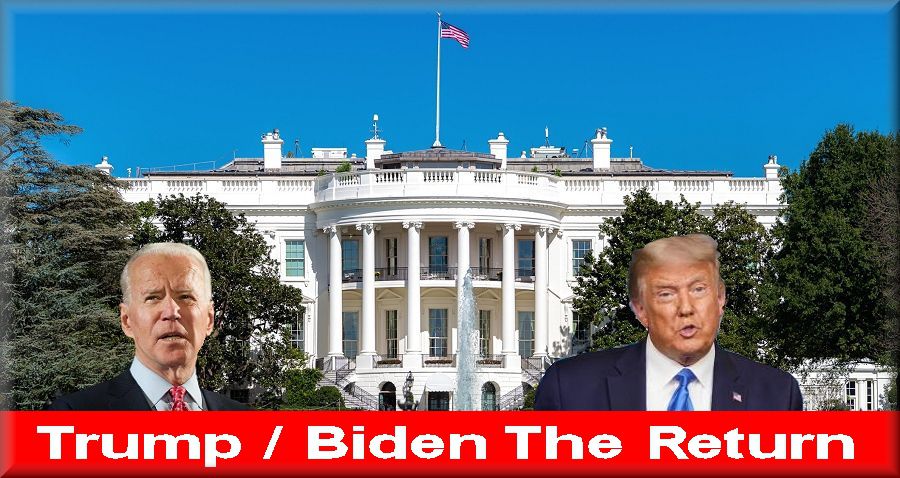
The campaign for the November presidential election in the United States is accelerating today, on the occasion of “Super Tuesday”. A crucial day during which 15 states and one American territory simultaneously organize Democratic and Republican primaries.
And there is no doubt that we are heading towards a Trump/Biden duel.
Indeed, the Supreme Court ruled on Monday March 4 by overturning a judgment excluding it from the ballot in Colorado. The decision, made public this Monday, thus cancels that of Colorado which, last December, had recognized the ex-president ineligible for the presidency due to his participation in an “insurrection” on January 6, 2021. American states cannot prevent Donald Trump from running for the White House.
“GREAT VICTORY FOR AMERICA!!!”, wrote Donald Trump on his social network just after the announcement of the Supreme Court decision.
Without ruling on his involvement in the assault on the Capitol, the justices agreed that only Congress had the power to enforce section three of the Fourteenth Amendment. According to them, “it would be incongruous to read this specific amendment as granting states the power to disqualify a candidate for federal office.”
The Supreme Court also justified its decision by warning of the risk of a “chaotic patchwork according to the States, in contradiction with the principles of the federalism of our nation”. Maine and Illinois had, like Colorado, declared Donald Trump ineligible. The judges therefore also invalidate the decisions of these two States.
Among the 15 states voting today, there are two demographic juggernauts: Texas and California. |
|
|
|
| Britney Delsey for DayNewsWorld |
 |
WAR IN UKRAINE
LEAK FROM A SECRET CONVERSATION
BETWEEN GERMAN OFFICERS | 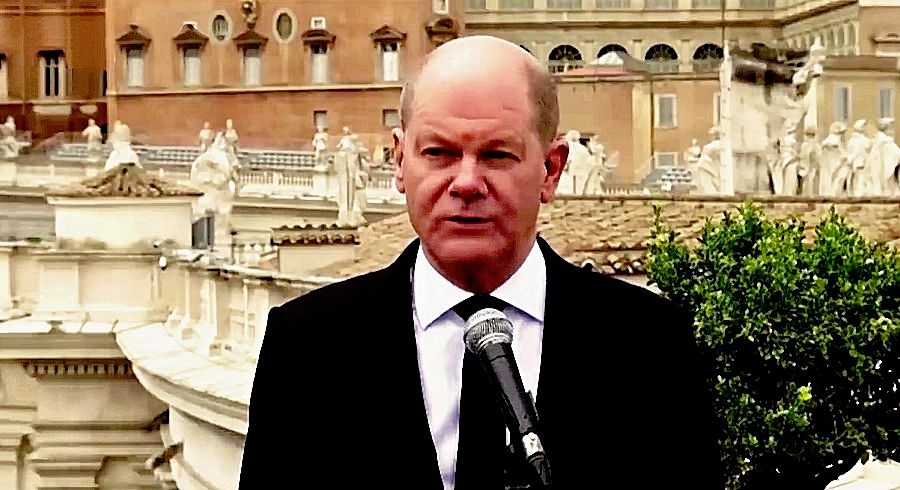
On Saturday March 2, 2024, Chancellor Olaf Scholz announced that Germany was investigating the leak of an audio recording from a discussion between army officers about the war in Ukraine.
German Chancellor Olaf Scholz, who was in Rome on Saturday, called the matter "very serious" and said German authorities were working to clarify the matter "very carefully, very intensively and very quickly." His comments were picked up by German news agency DPA. The German army, for its part, announces suspicions of illegal listening to exchanges with very embarrassing content, broadcast on social networks in Russia. The Wall Street Journal recently had access to this recording.
In the 38-minute recording, German military officers appear to discuss how long-range Taurus cruise missiles could be used by Ukraine. A debate is taking place in Germany over whether to provide the missiles, as Ukraine faces battlefield setbacks after two years of war and U.S. military aid is blocked in Congress.
A delivery much requested by Ukraine, but refused until now, to avoid an escalation of the conflict. According to the audio recording, Defense Minister Boris Pistorius plans to study the issue carefully.
The destruction of the Kerch bridge as a goal
According to the American media, the real question surrounding these missiles concerns the destruction of the Kerch bridge, which separates Ukraine from Crimea, an objective that kyiv is struggling to achieve. Reports indicate that a dozen Taurus missiles could be enough to destroy this structure. With 500 operational missiles available, Germany plans to provide around a hundred to Ukraine.
Limits set by the German government
“However, this will not fundamentally change the course of the war, we must be frank about this,” General Gerhartz explains in leaked audio. Even if these missiles were delivered, they would not be ready for use for eight months. According to him, the destruction of this bridge is of strategic importance, but Ukraine does not have the necessary capabilities to launch a ground offensive or to maintain its positions.
General Gerhartz also deplores the extravagant rumors circulating about these missiles, denouncing the spread of “nonsense”.
The officers further believe that this would constitute an excess of the limits set by the German government. “Any missile launched must be used without direct involvement of the Berlin armed forces,” explains General Gerhartz. He said U.S. military personnel in Ukraine could help train local troops to use the Taurus.
"There are a lot of people speaking with an American accent who travel in civilian clothes in Ukraine", he quips. |
|
|
|
| Emily Jackson for DayNewsWorld |
 |
ASIAN ELEPHANTS BURY THEIR DEAD ANDMOURN THEM
|

When a calf dies, Asian elephants bury it and mourn it by trumpeting around its remains, shows a study published in the Journal of Threatened Taxa. The research was carried out in North Bengal, India.
Researchers from two Indian universities identified five sites where baby elephants, aged between three months and a year and who died of organ failure, were buried by their herd. The adults carry the young by the trunk and legs and lay it on its back, in the irrigation canals of tea plantations, a few hundred meters from human settlements.
The herd does not return to the burial site
“Through timely observations, digital photographs, field notes and autopsy reports, we suggest that the remains were buried in the eerie manner of a recumbent figure, whatever the reason for the child's death.” , indicates the study.
In one case, the herd was observed trumpeting around the buried calf. Each time, the elephants left the scene "within 40 minutes of burial" and avoided returning to the same place. Only young ones are buried in this way, as transportation of adults is not possible. On the other hand, we already knew that elephants visit the remains of their conspecifics at different stages of decomposition.
Authors Parveen Kaswan and Akashdeep Roy said their research revealed "no direct human intervention" in the burial of each of the five baby elephants.
Clear footprints of 15 to 20 elephants were observed around the burial sites and on the earth under which the remains were buried.
Elephants are known for their social and cooperative behavior, but burying calves had only been "briefly studied" among African elephants. The phenomenon was still unexplored among their Asian cousins, according to the study.
Wild African and Asian elephants are known to visit the remains of their adult counterparts at different stages of decomposition, but this study revealed different behaviors. In all five cases, the herd "fled the site within 40 minutes of burial" and then avoided returning to the area, instead taking parallel migration routes.
Asian elephants are on the list of endangered species compiled by the International Union for Conservation of Nature. An estimated 26,000 of them live in the wild, mainly in India but there are also a few in Southeast Asia.
Outside of captivity, they live on average 60 to 70 years.
|
|
|
|
| Jaimie Potts for DayNewsWorld |
 |
THE MEDIA WAR WAGED BY HAMAS AGAINST ISRAEL
|
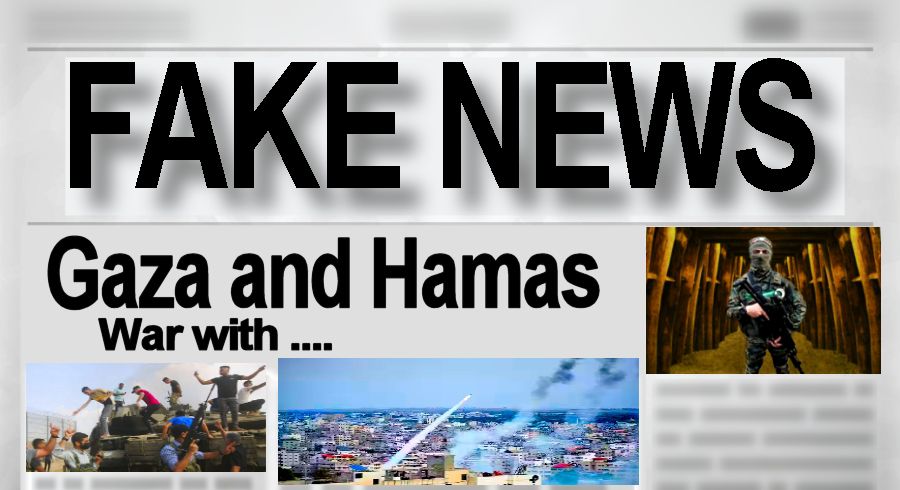
The Islamic Republic is engaged in a proxy war against Israel; a country whose very right to exist it goes so far as to deny. If Iran refrains from carrying out direct military actions on Israeli territory, it finances a network of armed organizations outside its borders which it calls the "axis of resistance" against Israel.
And just after Iran and its nuclear program, two organizations appear on the podium of threats, considered from Tel Aviv: Palestinian Hamas and Lebanese Hezbollah, which reportedly has "100,000 rockets" ready to be launched against the Jewish state. .
Hamas, with the atrocities committed in Israel on October 7, 2023, has not lost its reputation. And he knew how to use the media to spread the horror of their actions.
“We are fighting a battle, and more than half of this battle takes place on the media stage. We are therefore engaged in a media battle to win the hearts and minds of the members of our community,” Ayman already proclaimed in 2004 al-Zawahiri, formerly number two in Al-Qaeda and then leader after the elimination of Osama bin Laden in 2011, on the crucial role of the media sphere as an autonomous battlefield.
Al-Zawahiri's message in 2004 encouraged Iraq to mobilize all Muslims in a global jihad against what he perceived as a new American "crusade" against Islam. Al-Zawahiri emphasized the need to move al-Qaeda sanctuaries from rural areas to urban centers to exploit the media potential of urban conflicts.
Media use by civilians
This geographical shift was based on a strategic observation: the city, in contemporary asymmetrical conflicts, has become a real catalyst capable of fueling the “media war”. The destruction committed there by the enemy is more spectacular than in rural areas, the presence of thousands of civilians can make the attacker hesitate when launching his attacks, the number of collateral victims higher, the quantity of photos and videos taken there is more important – all elements which make it possible to better mobilize distant audiences against the army leading the offensive.
It is difficult not to see in the operating methods of Hamas currently implemented in Gaza a logic similar to that used by Al-Qaeda in Iraq in Fallujah (some 300,000 inhabitants) in 2004.
Moreover, by concentrating the defensive bastions either around a strategic mosque or around the Fallujah hospital, the terrorists not only benefit from the protection of human shields but also transform the operation into a real desecration in the eyes of the Muslim populations, the mosque taking on a sacred character. The desired objective: to awaken in the Umma the “reflex” of so-called “defensive” jihad.
This strategic approach persists in Hamas's current tactics in Gaza, implementing methods similar to those employed by Al-Qaeda in Iraq, such as the use of human shields and the concentration of operations in densely populated urban areas. The objectives are to maximize civilian casualties in the event of a strike, thereby provoking an emotional response and increased support from the local population.
Raising “the Arab street” and weakening Israel’s Arab partner regimes
Unlike Al-Qaeda, Hamas does not seek a priori to arouse jihadist vocations, but rather to raise "the Arab street", to radicalize it in order to weaken the Arab partner regimes of Israel and to isolate a Hebrew state keen to normalize its relations with its neighbors. Al-Qaeda strategists have also theorized the vocation of Palestinian jihad to undermine the legitimacy of Arab regimes at peace with Israel.
After two years of the signing of the Abraham Accords which helped to relax relations with other Arab countries - Egypt, Jordan, Saudi Arabia and the Gulf countries - with the exception of Qatar, which supports the Muslim Brotherhood and Palestinian Hamas, which is an emanation of it - Israel's response against Gaza to Hamas attacks has seriously undermined the efforts of both sides...
The ideological and strategic connection between Al-Qaeda and Hamas sheds light on the ongoing conflict in Gaza, highlighting the importance of the media battlefield and the manipulation of the media to influence public opinion.
|
|
|
|
| Alize Marion for DayNewsWorld |
 |
MACRON DISAVOIZED BY HIS NATO ALLIES
ON THE SENDING OF WESTERN TROOPS IN UKRAINE | 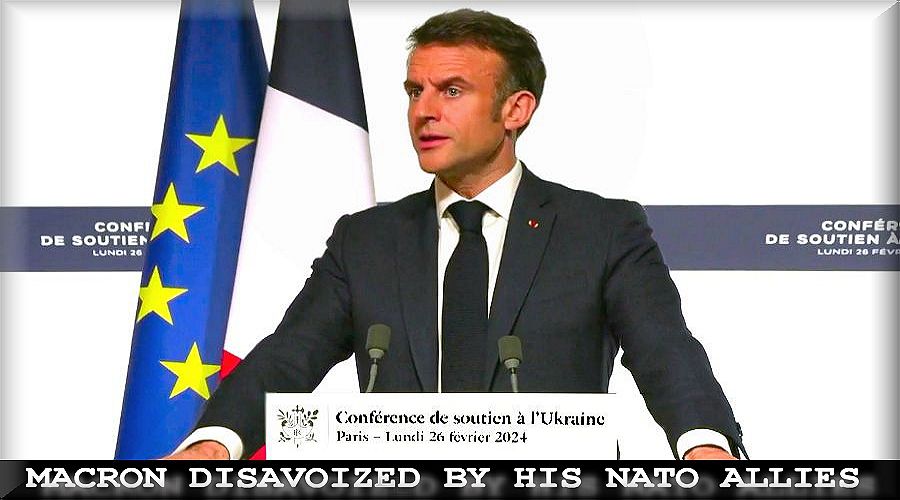
What does Emmanuel Macron really want ?
Dragging France, and with it the Atlantic Alliance, into a military, and therefore potentially nuclear, escalation with Russia ?
The declarations of the President of the Republic on the occasion of the impromptu summit on Ukraine on February 27, 2023 in Paris were enough to surprise him who, from now on, does not rule out sending ground troops to Ukraine.
Publicity stunt, amateurism some would say...
Emmanuel Macron surprised, shocked and worried by evoking the possibility of sending "ground troops" to help Ukraine face Russia. The spokesperson for the Russian embassy in France, Alexander Makogonov, estimated that sending Western troops will be the red line because it can trigger the Third World War, and it will be the war between the nuclear powers.
The reaction of the German government was not long in coming. Its representatives, like those of most other European countries, have denied that a sending of troops is on the agenda. And the vice-chancellor, the Green Robert Habeck, counterattacked by ordering France to increase its aid to Ukraine to match what Germany has been doing since the start of the conflict.
The Europeans let Jo Biden take leadership with NATO of Ukrainian policy. Washington also firmly dismissed on Tuesday a hypothesis raised the day before by Emmanuel Macron. The United States has in fact ruled out any idea of sending troops to Ukraine.
“Joe Biden has been clear that the United States will not send troops to fight in Ukraine,” said Adrienne Watson, deputy spokesperson for the National Security Council (NSC). The American president believes that “the path to victory” will go through military aid currently blocked by Congress, she added.
Did Emmanuel Macron want to break a taboo, which since the start of the Russian offensive has meant that weapons can be supplied to Ukraine, but that they can only be used to defend itself on his territory ?
The German Chancellor, Olaf Scholz, is still opposed to the delivery of long-range Taurus ballistic missiles to the Ukrainian army, the equivalent of Franco-British scalps, so as not to risk being directly involved in the conflict if the Ukrainians used them against targets in Russia.
Or perhaps driven by a feeling of frustration in the face of the Europeans' inability to provide sufficient weapons to the Ukrainians and the blocking in Congress of American aid promised by President Biden, could the French President's words have gone beyond his thoughts ?
Difficult to follow...
Macron excels in inappropriate formulas in the context of relations between European states. Who does not remember his proposal to use the international coalition against Daesh, the Islamic State, against Hamas in Gaza ?
A strategic question
But this time he had to send his Minister of the Armed Forces Sébastien Lecornu manu militari, on a mine-clearing operation
Tuesday, during a hearing by the Defense and Armed Forces Committee of the National Assembly, Sébastien Lecornu provided clarification on this proposal from the Head of State.
Recalling that "we are not at war with the Russian people or the Russian Federation", he rejected France's intention to deploy ground combat units. Rather, they would be advisors, deminers, trainers, cyber experts or technicians specializing in the maintenance of military equipment.
"A certain number of countries (...) have put a certain number of ideas on the table, in particular, around demining and around training - not training on Polish territory as we do today, but on training on Ukrainian territory behind the lines", explains Sébastien Lecornu.
“By making this proposal, Emmanuel Macron raises a strategic question noted Sébastien Lecornu.
"How can we do better and differently [to help Ukraine] and ensure that Russia does not win?".
|
|
|
|
| Alize Marion for DayNewsWorld |
 |
AMERICAN PRESIDENTIAL
NEW CRUSHING VICTORY FOR TRUMP
IN SOUTH CAROLINA |  Nothing seems to be able to prevent the former Nothing seems to be able to prevent the former head of state from being a presidential candidate. Nothing seems to be able to prevent the former Nothing seems to be able to prevent the former head of state from being a presidential candidate.
Donald Trump's victory was projected by the American media just a few seconds after the polling stations closed. Saturday February 24, the septuagenarian billionaire inflicted a scathing defeat on his last Republican rival, Nikki Haley, during the South Carolina primary. With almost all the ballots counted at 7:00 a.m. local time (12:00 p.m. GMT) on Sunday, the main American media gave the former real estate magnate well ahead, with around a little less than 60% of the votes. In his first victorious declarations after the South Carolina vote, he simply ignored Nikki Haley, preferring to designate the current tenant of the White House as his main opponent. “Joe (Biden), you’re fired!” he said from Columbia.
Governor of South Carolina for six years, Nikki Haley was nevertheless playing at home for the Republican primary organized in this state, this Sunday, February 25 in the United States.
However, Nikki Haley, 52, is hanging on, refusing for the moment to leave the race for the Republican nomination. “The fight continues. See you in Michigan,” the candidate posted on X (formerly Twitter) shortly after her defeat. Nikki Haley, who embodies a more moderate wing of the party, is Donald Trump's latest Republican rival.
At a meeting in Charleston, she promised to continue “fighting for America.” “We will not survive four more years of Trump’s chaos,” she assured. I am not giving up this fight.”
On Tuesday, the two rivals should therefore face each other in Michigan. Republicans from Idaho, Missouri and North Dakota will then vote in turn, a well-orchestrated ballet that will lead the candidates to one of the biggest political events of the year: Super Tuesday. On March 5, around fifteen states, including Texas, California, Colorado and Virginia, will simultaneously organize their polls during this major election day.
If the fifty-year-old remains in the race, it is undoubtedly because she believes that her opponent could be knocked out of the game by a court decision... |
|
|
|
| Jaimie Potts for DayNewsWorld |
 |
A POSSIBLE TRUCE IN THE MIDDLE EAST
ACCORDING TO JOE BIDEN | 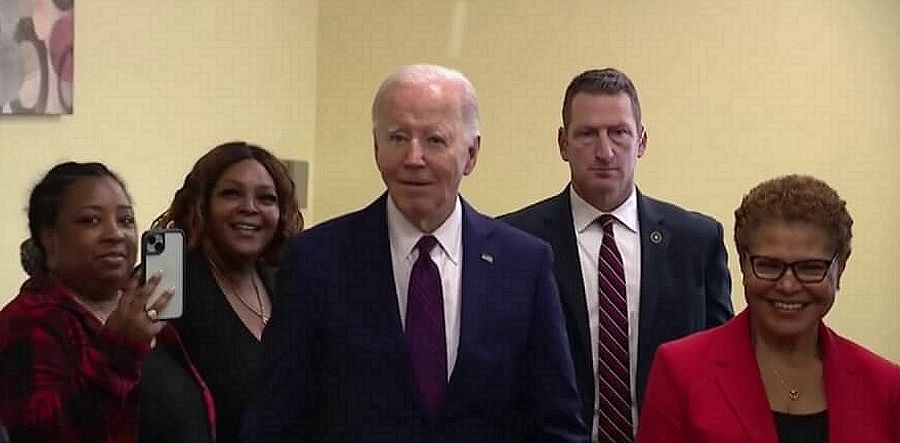
After almost five months of war, a lull could be looming in the Middle East. US President Joe Biden said on Monday that Israel was prepared to cease its military operations in Gaza during Ramadan, to allow the release of all hostages "Ramadan is coming and there was an agreement from the Israelis that they will not "would not engage in operations during Ramadan, in order to give us time to get all the hostages out" still on site, he said, interviewed Monday on the American television channel NBC.
Behind the scenes, negotiations launched several weeks ago are continuing under the leadership of the United States, but also Egypt and Qatar, while the Israeli offensive launched in retaliation for the deadly attack of October 7 is reportedly approaching 30,000 dead in the Palestinian enclave, according to the Islamist group's Ministry of Health. But the two camps still seem reluctant to put in place an agreement.
According to Israel, 130 hostages are still being held by Hamas in Gaza, 31 of whom are believed to have died, after the release of 105 hostages and 240 Palestinians detained by the Jewish state during a previous truce at the end of November, the only one that took place since the start of the conflict.
The mediators hope to obtain a break in the fighting before the start of Ramadan, the month of fasting for Muslims, which is due to begin this year on March 10 or 11. Delegates from Egypt, Qatar, and the United States, as well as representatives from Israel and Hamas, gathered in Doha on Sunday to resume discussions, which AlQahera News reports will be followed by meetings in Cairo.
These talks aim to follow the progress made during previous discussions held in Paris, where the head of Mossad, the Israeli intelligence agency, David Barnea, visited last Friday.
The Emir of Qatar in Paris
Talks continue in the French capital at the start of the week, marked by the arrival this Tuesday of the Emir of Qatar, a central player in the negotiations since the start of the conflict. Tamim bin Hamad Al-Thani is scheduled for dinner this evening with Emmanuel Macron at the Élysée. According to Qatar's official news agency, the emir recently met Hamas leader Ismail Haniyeh in Doha to discuss efforts to obtain an immediate and permanent ceasefire agreement.
Both camps far from an agreement
Recent statements by Prime Minister Benjamin Netanyahu could dampen hopes. In particular, he is maintaining his plan for a ground offensive on the densely populated town of Rafah, in the south of Gaza, where according to the UN, nearly a million and a half Palestinians have found refuge. Despite the concerns of the international community, he affirmed with certainty that this operation targeting the "last bastion" of Hamas would result in a "total victory" over the organization in "a few weeks". He stressed on Sunday that any truce would only "postpone" this offensive, emphasizing the possibility of an evacuation of civilians towards the "north of Rafah", outside the conflict zones.
For its part, Hamas has not yet officially commented on the truce proposal.
Abdel-Hadi accuses Reuters of the leak on the question of negotiations, believing that Biden's remarks amount to a form of "psychological warfare" on the part of the United States.
|
|
|
|
| Garett Skyport for DayNewsWorld |
 |
RACHIDA DATI ASKS FOR RANKING
FROM THE EIFFEL TOWER
TO HISTORICAL MONUMENTS | 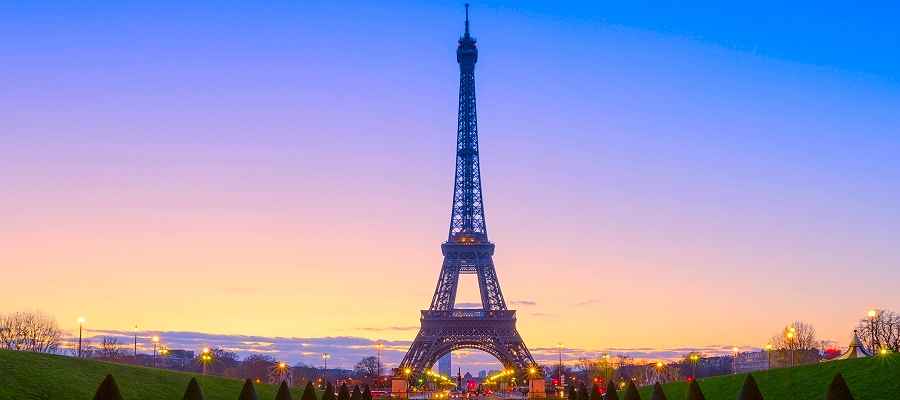
Rachida Dati, current Minister of Culture, took advantage of hot news around the Eiffel Tower to attack her long-time adversary, Anne Hidalgo.
The famous Iron Lady has been closed since Monday February 19 due to a strike, with employees and unions accusing the Paris town hall of poor financial management of the monument. The minister also wrote on Twitter on Thursday that it would be necessary to request the classification of the Eiffel Tower as a historic monument, claiming not to understand why the mayor of Paris did not take this initiative.
A classification which seems urgent given the current state of disrepair of the Eiffel Tower.
The Eiffel Tower has been listed as a historic monument since June 24, 1964.
Historical monuments were born around 1830, when the State began to preserve the great heritage of France. The first list of historic monuments was published in 1840. Only prehistoric monuments, ancient and medieval buildings appear. The definition will evolve over the centuries to expand.
In 1925, a second category was created: registration in the supplementary inventory of historical monuments, which was opened to more recent heritage. The Eiffel Tower was therefore included in this inventory in 1964, even though it was only 75 years old.
However, it is not classified and buildings that are benefit from tax advantages, subsidies for preservation work, and may be subject to strict conservation obligations to ensure the protection of heritage. To be eligible for this classification, it must be of public interest on a historical and artistic level. The Gustave Eiffel Tower corresponds perfectly to these criteria. Today it is simply listed in the inventory.
An opportunity for the future candidate for mayor of Paris in 2026 to point out for the umpteenth time the incompetence of her rival Anne Hidalgo.
|
|
|
|
| Emily Jackson for DayNewsWorld |
 |
EU RUSSIAN DIAMONDS BECOME
"BLOOD DIAMONDS" | 
The diamond market made in Russia generates no less than 4.5 billion dollars in revenue per year.
However, the EU has added the world's largest diamond producer, Alrosa, to its blacklist of personalities subject to personal sanctions (freezing of assets and ban on stay in the European Union).
Pavel Alekseevich Marinychev, the boss, produces 90% of Russian diamonds. Anton Siluanov, Russia's finance minister, chairs Alrosa's supervisory board.
The state-owned company also finances a military submarine that bears its name in the Black Sea.
By sanctioning the world's largest diamond mining company, the European Council hopes to put a dent in war finances.
“The company constitutes an important part of an economic sector which provides substantial income to the government of the Russian Federation,” the Council said in a press release.
But this decision could be a sword in the water to the extent that Russia can still count on Asian customers who are very demanding of Russian stones and that most Russian diamonds are cut and polished in India and therefore considered as Indians.
It is clear that the Kimberley system, established in 2003 by the UN to eliminate the trade in "blood diamonds" mined in war zones, is more easily applicable to rebel groups who finance themselves through this industry. than to governments. |
|
|
|
| Kate White for DayNewsWorld |
 |
EUROPE IN SEARCH OF SHELLS
FOR THE WAR IN UKRAINE |  As Ukrainian forces withdrew from the strategic town of Avdiivka in the east of the country over the weekend, Ukraine is critically short of artillery ammunition to repel Russian forces. As Ukrainian forces withdrew from the strategic town of Avdiivka in the east of the country over the weekend, Ukraine is critically short of artillery ammunition to repel Russian forces.
The European Union recently admitted that it would not be able to provide Ukraine with the million artillery shells it had promised by March. Around 524,000 shells will be delivered to Ukraine on schedule, representing around 52% of the target, EU foreign policy chief Josep Borrell told reporters last month.
Other strategies are being put in place.
Denmark will send its entire ammunition stock to kyiv, announced Danish Prime Minister Mette Frederiksen, becoming the first country to do so and calling on other European nations to do more to help Ukraine.
According to the Danish Prime Minister, European leaders often cite production problems as obstacles to increasing supplies.
“It is not just a question of production, because we have weapons, ammunition, air defense systems that we do not need to use ourselves at the moment and which must be supplied to Ukraine,” she argued.
“They [the Ukrainians] are asking us for ammunition now. Artillery now. As for Denmark, we have decided to donate our entire artillery,” Frederiksen said on Sunday (18 February) at the Munich Security Conference.
“I am sorry to tell you, dear friends, that there is still military equipment in stock in Europe,” she said. Copenhagen has so far promised military aid of 8.4 billion euros.
Buy ammunition outside the EU
The Czech Defense Ministry, for its part, has identified 800,000 units of available ammunition which could be delivered to Ukraine in the coming weeks, Czech President Petr Pavel announced on Saturday (February 17).
The Czech Republic is therefore studying the possibility of purchasing ammunition outside the EU.
“Our Ministry of Defense and our companies active in the defense sector have, through their contacts, an overview of where equipment and ammunition are available,” Mr. Pavel said during the a press conference in Munich after attending a security press conference.
According to Pavel, Czech authorities have identified a significant quantity of 155mm artillery shells, which meet NATO standards, and 122mm shells, often used in the former Soviet Union.
“As far as I know, our companies have identified, in various locations around the world, up to 500,000 155mm NATO shells and up to 300,000 122mm shells,” Mr. Pavel said.
“In cooperation with our partners, mainly Denmark, the Netherlands and Canada, we are bringing together the necessary financial resources to cover the transaction. Then we will transport the equipment and ammunition to Ukraine using our own resources,” he added.
This information was later confirmed by who added that the Czech Republic could ensure the delivery of ammunition to Ukraine if financing was ensured. The minister said the issue had already been discussed at the meeting of NATO defense ministers held last week.
Mr. Pavel and Czech Defense Minister Jana Černochová, however, refused to reveal from which countries the munitions could be purchased in bulk.
|
|
|
|
| Alize Marion for DayNewsWorld |
 |
UKRAINE "QUESTION OF LIFE OR DEATH" ACCORDING TO PUTIN
|
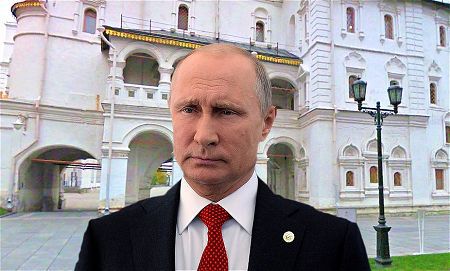 The Russian president assured that "what is happening" in Ukraine is a "question of life and death" for Russia, while for the West it is only a question of "improving (its) position tactics", in an interview broadcast on Sunday. The Russian president assured that "what is happening" in Ukraine is a "question of life and death" for Russia, while for the West it is only a question of "improving (its) position tactics", in an interview broadcast on Sunday.
Vladimir Putin said it was "important" for Russians and foreigners alike "to understand our state of mind, to understand how sensitive and important what is happening around Ukraine is for our country."
"For (the West), it is an improvement in their tactical position. But for us, it is our destiny, it is a question of life and death," he said during from an interview with journalist Pavel Zaroubine, published on social networks. .
In addition, on Saturday evening, Russia claimed "total control" of Avdiivka, in eastern Ukraine, after Kiev withdrew due to lack of sufficient military resources.
The White House has also established a link between this symbolic success conceded to Russia by the Ukrainians and the blocking - by the Republicans - of additional military aid to kyiv by the American Congress. “I spoke to Zelensky this afternoon to let him know that I was confident that we are going to have this money,” however, the President of the United States, Joe Bien, wanted to reassure on Saturday evening.
"I will fight so that they (the Ukrainians) have the ammunition they need," he assured. |
|
|
|
| Boby Dean for DayNewsWorld |
 |
THE FORMER BOSS OF FRONTEX
IN THE COLORS OF THE NATIONAL GATHERING
FOR EUROPEANS | 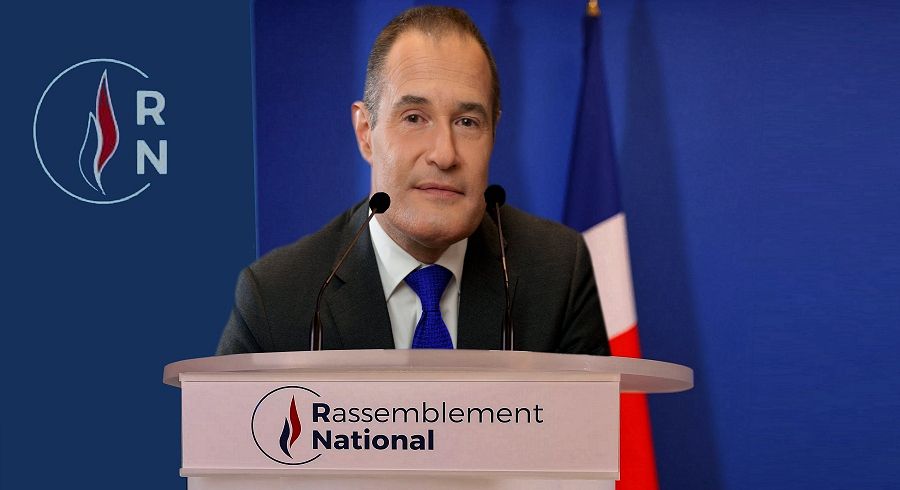 A real war prize for the RN: Fabrice Leggeri, former boss of Frontex joins Jordan Bardella for the Europeans. Fabrice Leggeri, former director of Frontex, the EU agency responsible for border control, announced Saturday February 17 in an interview with JDD that he was joining the National Rally for the European elections in June. He will be third on Jordan Bardella's list. A real war prize for the RN: Fabrice Leggeri, former boss of Frontex joins Jordan Bardella for the Europeans. Fabrice Leggeri, former director of Frontex, the EU agency responsible for border control, announced Saturday February 17 in an interview with JDD that he was joining the National Rally for the European elections in June. He will be third on Jordan Bardella's list.
“The European elections on June 9 represent a unique opportunity to put France and Europe back on the right path,” he declared. In his interview, the 55-year-old senior French civil servant explains his choice. According to him, "the RN has a concrete plan and the capacity to carry it out. We are determined to combat migratory overwhelm, which the European Commission and the Eurocrats do not consider as a problem, but rather as a project", believes -he.
Appointed in 2015 on the proposal of Bernard Cazeneuve, then Minister of the Interior, he fundamentally transformed Frontex, from a small humanitarian structure into a border police force. But following a disciplinary investigation, this senior official resigned. He was targeted by the European Anti-Fraud Office. The organization accused him of "not having respected procedures, of having demonstrated disloyalty towards the European Union" and of being responsible for "poor personal management".
“Regarding these accusations, it is important to note that neither the European Parliament nor the Frontex board of directors have found concrete evidence to support them,” says Fabrice Leggeri in the JDD. He added during the interview that: "in reality, for wanting to control immigration, I was pressured and I felt general abandonment. The French government pressured me to resign. Germany was not inclined to support me. The European Commission, clearly hostile towards me, wanted me to leave
Placed third on the list, this former senior official is an additional asset for the credibility of the immigration movement.
Jordan Bardella, president of the RN, is leading the voting intentions around 30% for this European election. He is currently around ten points ahead of the Macronist majority.
|
|
|
|
| Britney Delsey for DayNewsWorld |
 |
FOR TRENDY BEAUTIFUL NAILS !
|
|

First get a manicure for this either you go to a nail bar or at home.
Remember grandmother's recipes:
they are effective and remarkable.
For yellow nails, there's nothing better than soaking the varnish-free nails in a bowl of warm, lemony water for a good 10 minutes.
Guaranteed effect.
Are your nails breaking ?
THEN dip them in olive oil otherwise buy hardener found in the supermarket or pharmacy (the best is the hardener from Mavala). Oh you bite your nails ?!
So go to the pharmacy where you can find the best tangy products but above all the best thing is to spot the moments when you compulsively chew them and analyze the cause of this nasty habit.
And think of the photos in our article with all the pretty nails that you would love to have. Otherwise in the nail bars that you find everywhere you even have a manicure for a bluff effect for thirty euros.
Already with sufficient length apply permanent varnish, you will have impeccable nails for three weeks. Adding a drawing sometimes. The only problem: you have to go back to their place to remove it. If you are short on length we can give you false nails which are capsules or gel which looks more natural.
And there for the spring-summer season we can have designs on French manicure nails in the nail bar.
Big news that we are starting to notice on American stars.
It's the Flip Manicure: one color on the back of your nails and another color on top.
Like for example glittery blue on top and red below it can be nice even for Valentine's Day in February !
Phenomenon copied from a famous Louboutin shoe. |
|
|
|
| Mia Kennedy for DayNewsWorld |
|

|
|
DEATH OF RUSSIAN OPPONENT IN PRISON
ALEXEI NAVALNY | 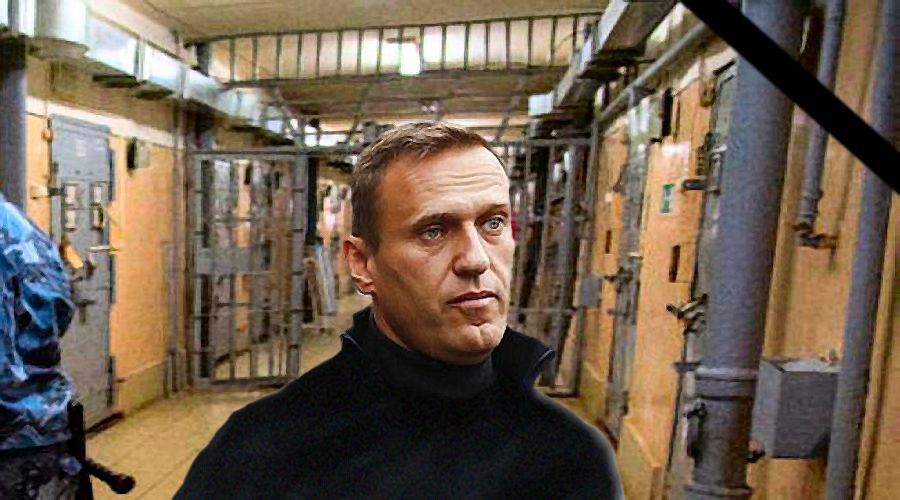 This Friday, February 16 2024, Russian media announced the death of Russian opponent Alexeï Navalny, which occurred in the prison where he was serving a 19-year sentence. This Friday, February 16 2024, Russian media announced the death of Russian opponent Alexeï Navalny, which occurred in the prison where he was serving a 19-year sentence.
“On February 16, 2024, in penitentiary center No. 3, prisoner Navalny AA felt unwell after a walk and almost immediately lost consciousness,” said the penitentiary services (FSIN) of the Arctic region of Iamal in a press release "All the necessary resuscitation measures were carried out but did not give a positive result. The emergency doctors noted the death of the patient. The causes of death are being established", added the FSIN in this terse press release. The Russian president would have been informed of his death, according to his spokesperson Dmitri Peskov.
Alexei Navalny, 47, was serving a 19-year prison sentence for "extremism" in a remote Arctic penal colony, where conditions were notoriously harsh. His ordeal began after being poisoned in January 2021 upon his return to Russia from convalescence in Germany, an act he attributed to the Kremlin. The multiple trials he faced were widely seen as politically motivated.
During his various video appearances during his trials in recent months, Navalny appeared weakened and aged. His health had been seriously affected by a hunger strike and the poisoning which he miraculously survived in 2020.
The remote Arctic colony nicknamed "Polar Wolf" where he was recently transferred, is an establishment inherited from the Soviet gulag. The detainees work there in particular on tanning and sewing reindeer skins, used by the local indigenous populations.
Ivan Zhdanov, one of his close collaborators, accused the Russian authorities of seeking to isolate him in the run-up to the presidential election. According to him, Navalny was detained in one of the northernmost and isolated colonies in Russia under particularly difficult conditions.
Alexeï Navalny's movement had been systematically repressed by the government in recent years, leading to the exile or detention of his collaborators and allies.
On February 1, in a message broadcast by his team on social networks, Alexeï Navalny called for demonstrations across Russia during the presidential election scheduled for March 15 to 17. A re-election of the Russian president which seems assured in the current context.
Many Russian opponents, including Yulia Navalnaïa, the wife of Alexei Navalny, have directly accused the Kremlin. The United States, through its vice-president, Kamala Harris, denounced “a new sign of brutality” from Moscow.
“In today's Russia, we put free spirits in the gulag,” said the French head of state, after the announcement of the death of Vladimir Putin's main political adversary.
|
|
|
|
| Andrew Preston for DayNewsWorld |
 |
BUT WHO TO SAVE MACRONIA
TO EUROPEANS | 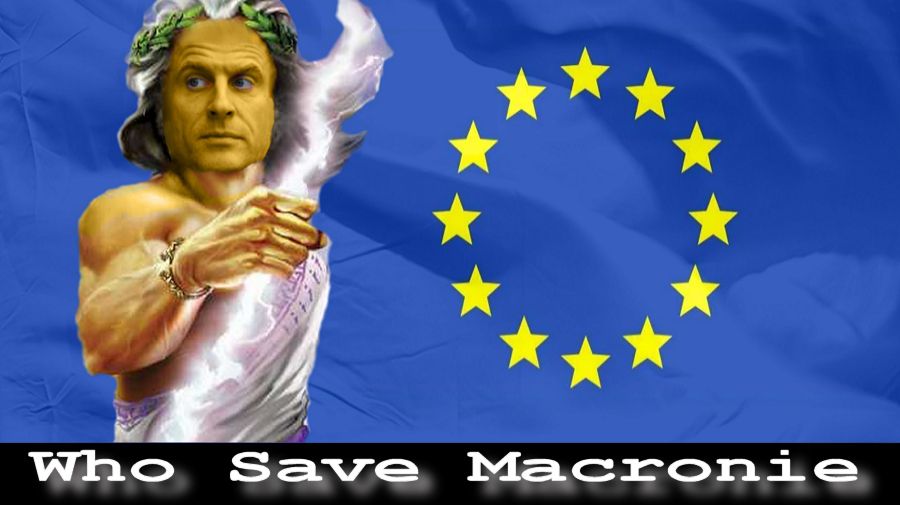 All political parties have their head lists for the European elections and have already attacked their campaign. François-Xavier Bellamy (LR), Manon Aubry (LFI), Raphaël Glucksmann (Place publique, PS), Marie Toussaint (ELLV) and even Marion Maréchal (Reconquête!) crisscross France. Jordan Bardella has been leading the polls since his appointment on September 3. All political parties have their head lists for the European elections and have already attacked their campaign. François-Xavier Bellamy (LR), Manon Aubry (LFI), Raphaël Glucksmann (Place publique, PS), Marie Toussaint (ELLV) and even Marion Maréchal (Reconquête!) crisscross France. Jordan Bardella has been leading the polls since his appointment on September 3.
The president of the RN even widens the gap with the list of the presidential majority, ahead of it by more than 10% in an Ifop survey of February 11 collecting 29% against 19 for a headless presidential majority. But who will carry the flag of Renew, the Renaissance political group, in the European elections on June 9 ?
This strategy of late announcement of the head of the Renaissance list would be desired according to a Renew MP:
“Since we don’t have a face, she avoids criticism.”
With the risk of letting opponents take the spotlight, like Raphaël Glucksmann, who can recover the votes of the Renaissance left wing, disappointed with the turn to the right of the new Macron government
But the truth would seem less rosy for Macronie.
Famous personalities refused the offer. European Commissioner Thierry Breton, Julien Denormandie, former Minister of Agriculture, have already said no and former ministers Olivier Véran and Clément Beaune seem to be left behind.
According to Ifop, the best defense against Jordan Bardella would be MEP Valérie Hayer, new president of the Renew group in the European Parliament and daughter... of a farmer. Yesterday morning, it was the former journalist and Renaissance MEP Bernard Guetta who applied.
A default choice that the President of a puppet party must ultimately make.
|
|
|
|
| Alyson Braxton for DayNewsWorld |
 |
KANSAS CITY THE SUPER BOWL PARADE
DEADLY SHOOTING |  A shooting broke out in Kansas City, Missouri, this Wednesday, February 14, 2024, during the parade celebrating the Chiefs' Super Bowl victory. A shooting broke out in Kansas City, Missouri, this Wednesday, February 14, 2024, during the parade celebrating the Chiefs' Super Bowl victory.
The shooting broke out at the end of the parade of the Kansas City Chiefs (Super Bowl winners), in this Missouri city located in the center of the United States.
One person died following this attack and at least 21 others were injured, according to a provisional report communicated by the emergency services.
Eight life-threatening patients were taken to hospital within 10 minutes of the shooting, Chief Ross Grundyson said at a news conference.
Stacey Graves, the Kansas City police chief, said that three people in total had been arrested in connection with the shootings.
Children's Mercy Pediatric Hospital said it had just treated 12 injured people from the gathering, including 11 children.
“Nine have injuries caused by firearms,” detailed a spokesperson for the establishment.
Tens of thousands of people celebrated the Chiefs, who paraded through the streets of Kansas City to celebrate their victory on Sunday in the Super Bowl, the annual high mass of American football.
The traditional convoy of double-decker buses traveled up Grand Boulevard towards Union Station. The shooting took place near the Union Station parking lot as the parade was winding down.
“I thought they were fireworks,” John O’Connor told our colleague from the daily The Kansas City Star, explaining that he heard “between 15 and 20 shots in a short period of time.”
The police indicated a few minutes later on the social network
The police managed to arrest two armed people "for further investigation", they said for the moment without further details.
Police also said "Anyone in the vicinity should leave the area as quickly and safely as possible" to facilitate the treatment of gunshot victims, also advising people to avoid the Union Station parking lot for allow first responders to pass.
In a statement, the Kansas City Chiefs said they were “saddened” and condemned a “senseless act of violence,” adding that all of their players, coaches and staff members, as well as their families, were safe.
Chiefs star quarterback Patrick Mahomes said "pray for Kansas City" in a post on X.
According to Kansas City Mayor Quinton Lucas, authorities have been in contact with the White House, which has offered federal assistance.
The latter specified that President Joe Biden had been informed of the situation.
The mayor of Kansas City, who was present with his family during the parade, said he was "angry".
A parade to celebrate a Super Bowl victory, "it's a day that many people hope to remember for the rest of their lives; and what they shouldn't have to remember is the threat posed by gun violence,” Quinton Lucas said at a news conference.
About 49,000 people died from gunfire in 2021, compared to 45,000 in 2020, which was already a record year.
This represents more than 130 deaths per day, more than half of which are suicides. However, it is the shootings with many victims that mark people’s minds the most.
However, let's not stop only at firearms!
As proof, a simple van which rushes into a pedestrian lane during a festive demonstration and it becomes a horror, a massacre with multiple deaths, such as for example the case of Nice in France on July 14, 2016, 86 dead and hundreds of injured, all without firearms!!.
However, all this should not make us forget that these criminal acts are the work of a handful of people with failing mental and moral health, but also the result of the loss of bearings, often caused by a malaise which takes root at the heart of an increasingly suffering population.
It would therefore be urgent to put in place an action plan for real improvement, because we must never forget that crimes, and in particular mass murders, are the work of human beings; weapons, whatever their nature, are only the tools to carry out a massacre. |
|
|
|
| Pamela Newton for DayNewsWorld |
 |
PRESIDENT JOE BIDEN’S MENTAL HEALTH BECOMES A SERIOUS DISABILITY
FOR THE PRESIDENTIAL | 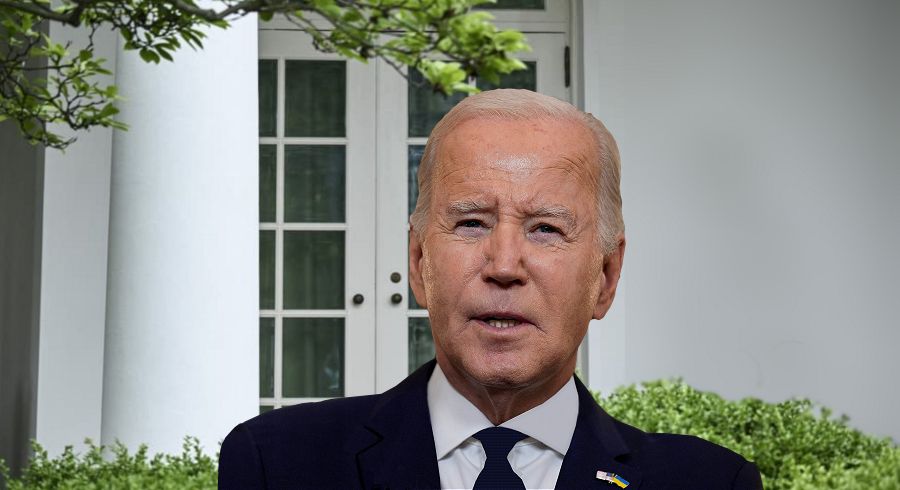 On Thursday, American President Joe Biden assured that he had a “very good memory”. On Thursday, American President Joe Biden assured that he had a “very good memory”.
This speech came shortly after the release of a 388-page summary in which special counsel Robert Hur highlighted the deterioration of the mental health of the tenant of the White House, while recommending not to engage prosecution in the case of classified documents. For investigator Robert Hur, Joe Biden turns out to be “an elderly, friendly, well-meaning man but with a bad memory”.
The report also recalled forgetting the date of death of her son, Beau.
“How the hell dare he?” “, castigated the head of state, before getting stuck in an embarrassing sequence. Asked about the humanitarian corridor separating the Gaza Strip and Egypt, Joe Biden referred to Egyptian President Abdel Fattah al-Sisi as the "president of Mexico."
Joe Biden also recently confused Emmanuel Macron with “Mitterrand of Germany” during a meeting.
The repeated omissions and blunders of the oldest American president in history fuel criticism and deal a serious blow to the image of the president, a candidate for his own re-election.
Biden's age, at 81 the oldest American president in history, is a concern for more than three-quarters of voters, including half of Democrats, and a favorite angle of attack for Republicans, who present him as a senile old man.
A duel with Donald Trump in perspective
The Democratic Party is dramatically worried. Joe Biden is the only real Democratic candidate, with both candidates being complete unknowns to voters. Traditionally, it is always an advantage to have the incumbent president running again because he is not exposed to real primaries and he campaigns at the same time as he governs.
A few months before the presidential election, he nevertheless appears to be the only one who can block the path of former president Donald Trump.
Largely ahead of the Republican primaries, the real estate mogul has his popularity intact, despite his legal troubles, particularly linked to the assault on the Capitol, in 2021.
|
|
|
|
| Jaimie Potts for DayNewsWorld |
 |
A SITUATION IN UKRAINE
EXTREMELY COMPLEX AND TENSE
ACCORDING TO HIS COMMANDER IN CHIEF | 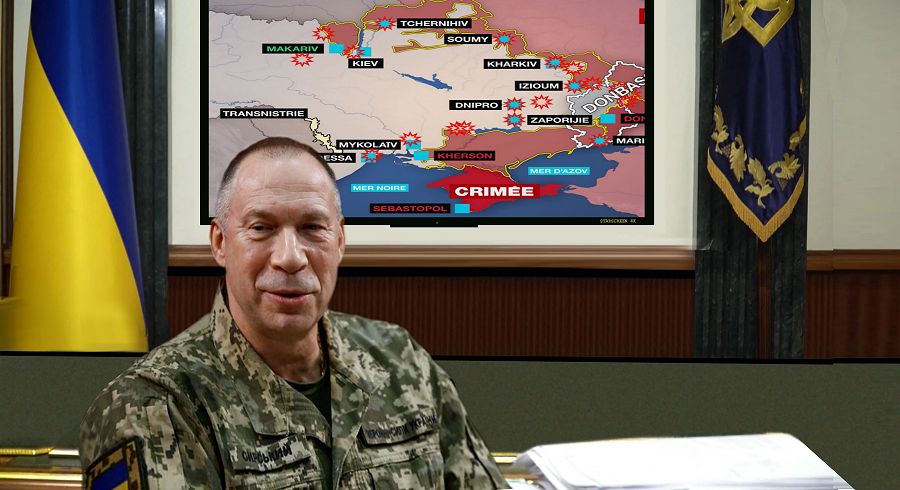 The Ukrainian army has a new commander-in-chief. The most experienced general in Ukraine" according to Volodymyr Zelensky or a blow in the water in the eyes of Moscow, the appointment of Oleksandr Syrsky, former head of the land army, to the post of commander-in-chief of the forces Ukrainians, should bring change and action in a conflict that is getting bogged down. At least that's what the Ukrainian president hopes. According to several senior sources, President Zelensky was starting to get impatient with the lack of progress on the front. The Ukrainian army has a new commander-in-chief. The most experienced general in Ukraine" according to Volodymyr Zelensky or a blow in the water in the eyes of Moscow, the appointment of Oleksandr Syrsky, former head of the land army, to the post of commander-in-chief of the forces Ukrainians, should bring change and action in a conflict that is getting bogged down. At least that's what the Ukrainian president hopes. According to several senior sources, President Zelensky was starting to get impatient with the lack of progress on the front.
The new leader of the Ukrainian army already has some great exploits under his belt: the defense of kyiv at the start of the Russian invasion almost two years ago, and the counter-offensive in the fall of 2022 which had liberated the Kharkiv region. And yet even greater challenges await him as he himself testified this Wednesday, February 14, 2024, after traveling to the hottest areas of the Eastern Front with the Minister of Defense, Roustem Oumerov: the situation on the terrain “extremely complex and tense”.
The Russian occupiers continue to increase their efforts and outnumber the Ukrainian forces, Oleksandr Syrsky said on Telegram, as Ukraine struggles to replenish the ranks of its army. The army has lost, according to American estimates, 70,000 men killed and 120,000 injured in two years. Valery Zalouzhny had asked the government to mobilize 500,000 people, but the decision was considered too unpopular by Ukrainian leaders. A bill aimed at broadening mobilization, the subject of much criticism, is currently being examined in Parliament.
In addition, the American military aid that the country needs to face the Russians remains blocked. “We are doing everything possible to prevent the enemy from advancing on our territory and to hold our positions,” underlined the new commander-in-chief of the Ukrainian armies. A titanic task, the front line being approximately 1,000 kilometers long and permanently under Russian fire, particularly in the East, at Avdiïvka and Koupiansk.
Finally, control of the sky is another challenge, as complex as it is vital for the continuation of the conflict.
“Only change and continuous improvement of the means and methods of warfare will allow us to succeed,” General Syrsky said on Telegram in his first public speech as commander-in-chief. A challenge that Oleksandre Syrsky will have to take on for the victory of his country. |
|
|
| | Alize Marion for DayNewsWorld |
 |
NETHERLANDS DUO EUTHANASIA OF A FORMER PRIME MINISTER AND HIS WIFE |  Former Prime Minister of the Netherlands Dries van Agt died on Monday February 5 in Nijmegen (Netherlands) at the same time as his wife Eugénie van Agt-Krekelberg as part of an assisted suicide procedure, reports the Dutch daily From Telegraaf. Former Prime Minister of the Netherlands Dries van Agt died on Monday February 5 in Nijmegen (Netherlands) at the same time as his wife Eugénie van Agt-Krekelberg as part of an assisted suicide procedure, reports the Dutch daily From Telegraaf.
Prime minister between 1977 and 1982 and first leader of his political party, the Catholic People's Party (KVP), which has since become the Christian Democratic Appeal (CDA), Dries van Agt was ambassador of the European Union to Japan and the United States -United in the 1980s. A lawyer by training, he practiced in Eindhoven, before becoming a law professor at the Catholic University of Nijmegen from 1968 to 1971. He left his teaching position to join the government.
He suffered a brain hemorrhage in 2019 and had since been very weakened.
The announcement of the “duo” euthanasia of the Agt couple was made by the Rights Forum, a research center on Israel and the Palestinians, which the former Dutch Catholic prime minister had founded. The Rights Forum specified that Dries van Agt had left “hand in hand with his wife” to Nijmegen. Their funerals were organized in family privacy, without further details of their deaths being communicated. Assisted suicide has been legal since 2002 in the Netherlands.
They “couldn’t live without each other”
Questioned by the Dutch television channel NOS, the director of the Rights Forum, Gerard Jonkman, indicated that Dries and Eugénie van Agt, both 93 years old, were very ill but “could not live without each other” after having lived together for seventy years.
Outgoing Prime Minister Mark Rutte said he was saddened by the death of the man he called his “practicing great-great-grandfather”.
“The death of Dries van Agt and his inseparable Eugénie, with whom he was united in love until the end, is sad. Dries van Agt remained completely authentic throughout his life,” responded the Dutch head of government. |
|
|
|
| Kate White for DayNewsWorld |
 |
FACED WITH THE INFLUX OF ILLEGALS AND EXCEPTIONAL DELINQUENCY
THE END OF LAND RIGHTS IN MAYOTTE | Will the latest announcement be enough to restore a feeling of security to the inhabitants of Mayotte? Arriving this Sunday in Mayotte, Gérald Darmanin announces his desire to put an “end to land rights” on the island facing a major migration crisis. “It will no longer be possible to become French if you are not the child of French parents, we will reduce the attractiveness of the archipelago,” explained the Minister of the Interior.
"We are going to take a radical decision, which is the inclusion of the end of land law in Mayotte in a constitutional revision that the President of the Republic will choose [...] It is an extremely strong, clear, radical measure, which obviously will be limited to the Mayotte archipelago", he indicated. In addition, he specified, the abolition of land rights in Mayotte will make it possible to "put an end to the territorialized visa", a device which prevents holders of a Mayotte residence permit from coming to France and the removal of which is one of the demands of the "citizen collectives", who have paralyzed the island for three weeks with roadblocks installed to protest against insecurity and uncontrolled immigration. According to the minister, the abolition of territorialized residence permits must be recorded in a Mayotte bill which will be studied in the National Assembly "in the coming weeks".
More than 150,000 illegal immigrants
The exceptional measure announced by Gérald Darmanin intends to calm the anger of some of the island's inhabitants who have been blocking traffic on major roads since January 22. The collective of “Forces vives de Mayotte” maintains blockades in the four corners of Mayotte, on the roads and at the port, paralyzing traffic and disrupting the economic life of the department.
They stand up against insecurity and delinquency, linked to illegal immigration which they consider uncontrolled. More precisely, they demand the expulsion of refugees from Great Lakes Africa, installed in a makeshift camp around the Cavani stadium, in Mamoudzou, and demand an end to acts of delinquency and clashes. This anger also shows the failure of Operation Wuambushu launched in spring 2023, during which hundreds of additional police and gendarmes were deployed in Mayotte to stem the flow of arrivals of migrants from the Comoros and combat delinquency and housing. unsanitary.
Mayotte, which became the 101st French department in 2011, attracts thousands of migrants each year, arriving by sea in "kwassa kwassa", makeshift boats, from the neighboring Comorian island of Anjouan, but also from Western Africa. Great Lakes and increasingly Madagascar.
Nearly half of Mayotte's estimated 350,000 inhabitants do not have French nationality, according to INSEE, but a third of foreigners were born on the island. In its February 2019 report, INSEE indicated that between "significant immigration from the Comoros" and the departures of "natives of Mayotte to the outside world", 48% of the department's population was foreign in 2017, a figure up 8% compared to 2012. And since then the situation has only deteriorated.
Comorian governments exploit their migrants whose remittances officially represent 20.5% of GDP. The Comoros is the fourth country in the world most heavily dependent on these transfers.
Insecurity and “extraordinary” delinquency
These illegal migrants, settled in particularly unsanitary neighborhoods, “bangas”, are prey to violence and trafficking.
In its report “Living environment and security in Mayotte” from November 2021, INSEE describes “extraordinary delinquency”. Over the period 2018-2019, in each area – burglaries, thefts, physical or sexual violence, etc. – Mahorese delinquency clearly exceeds the figures for mainland France.
This year, personal attacks have increased by 50%.
"The inhabitants of Mayotte are personally three times more victims of theft with or without violence", indicates INSEE, and the feeling of insecurity "far exceeds all the standards of the metropolis or other Drom (Departments and regions of Overseas)". 48% of Mahorais feel unsafe at home (52% in their neighborhood), i.e. five to six times more than in France. All these numbers are increasing year after year.
For six months, the island has also been suffering from a terrible drought which has forced the authorities to put in place water restrictions. Thanks to a recent improvement in the weather situation, and therefore to rainfall, water cuts were reduced in mid-January to every other day. Since the end of August 2023, running water has only been available one day out of three in Mayotte due to a historic drought, coupled with a lack of infrastructure and investment.
The Mayotte archipelago is the department where the National Rally scored its biggest score in the first round of the presidential election. Marine Le Pen received 59.10% of the votes, far ahead of the other candidates, but also very far from her score in 2017.
In a department undermined by insecurity and illegal immigration, the RN is attractive. |
|
|
|
| Kelly Donaldson for DayNewsWorld |
 |
SUPERBOWL A RECORD SPECTATORS
WITH THE TAYLOR SWIFT-TRAVIS KELCE ROMANCE | What happens when you bring together the world's biggest pop star and a two-time Super Bowl champion ?
Lots of excitement, as shown by the romance between Taylor Swift and Travis Kelce.
The Taylor Swift effect can be seen everywhere, right up to the Super Bowl. 123.4 million viewers in the United States watched on Sunday, on their television or in streaming, the Kansas City Chiefs win the Super Bowl, with popstar Taylor Swift in the stands, announced the CBS network which claims the largest audience ever achieved by a single network.
“CBS Sports' coverage of the 58th Super Bowl was the most-watched in history with a total audience of 123.4 million viewers across all platforms, including CBS Television Network, Paramount+, Nickelodeon, Univision, and CBS Sports , Univision and the NFL's digital properties, including NFL +,” CBS Sports said in a statement, saying it was based on audience measurements from the Nielsen company.
The Chiefs' victory last night to reach the Superbowl was followed worldwide, not that American football is breaking through across borders, just that the community of "Swifties" is watching.
On the night from Sunday to Monday, the Kansas City Chiefs won over the Baltimore Ravens and qualified for the Superbowl, the grand final of American football. Usually, this sport only ignites the United States and struggles to raise an eyebrow of interest in a European. But this victory for the Chiefs has, this time, gone well beyond American borders, celebrated on a global scale by the “Swifties”, fans of the singer Taylor Swift.
Taylor Swift has given the NFL a unique opportunity to expand its appeal to a demographic – young women – who may not have been interested in American football before. The "Swifties", as the singer's fans are called, are excited at the idea of seeing the pop icon fall in love.
So, every time she goes to a stadium to cheer on her new lover, the Kansas City Chiefs star who plays tight end, which she has done four times in the last two months and she could well do it again soon, the media are having a field day. Her romance with Travis Kelce brought the attention of "Swifties" to the sport - and this team in particular. Especially since Travis Kelce is very appreciated and validated by the ''Swifties.
But amid all the cheers and Instagram shares, the situation provides some useful insights into marketing and big money. In a snap of her fingers Taylor Swift received at least 75 million dollars for the broadcast rights to the film Taylor Swift: The Eras Tour, the full recording of her last tour which was recently a hit in cinemas with 260 million collected at the box office -world office.
Which will make many “Swifties” dream of. |
|
|
|
| Kate White for DayNewsWorld |
 |
RUSSIA THE CANDIDATURE OF BORIS NADEJDINE
IN THE PRESIDENTIAL ELECTION REJECTED | 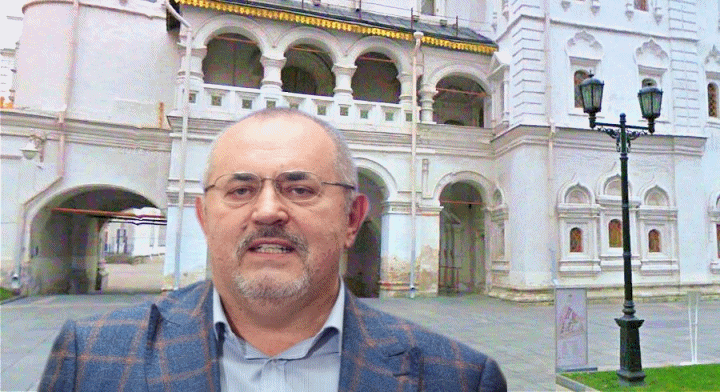
Boris Nadezhdine, anti-war candidate and opponent of Vladimir Putin, announced Thursday that he is not authorized by the Central Electoral Commission (CEC) to be a candidate in the presidential election next March in Russia and that he would contest this decision before the courts He had to rely on the signatures of 100,000 citizens to see his application validated, but the Commission rejected enough of the 105,000 submitted, under various pretexts ranging from the poorly completed form to errors in the addresses of the signatories.
According to Tass, the regime's official news agency, the Electoral Commission rejected nearly 10,000 sponsorships. Thus, it considers "as authentic 95,587 signatures out of nearly 105,000 in favor of the candidate of the Civil Initiative party, Boris Nadejdine". “This does not allow him to be registered as a candidate,” adds Tass, which recalls that the limit is 5% of rejected sponsorships.
Earlier, the Central Election Commission (CEC) had already rejected the candidacy of the leader of the Communists of Russia, Sergei Malinkovich, "due to the high percentage of defects in the signatures of voters that he collected for his support."
Few political analysts will believe that these decisions were made without instructions from the Kremlin.
Born in 1963, Boris Nadejdine is a physicist by training and began to take an interest in the problems of his country at the age of 17, before launching into politics. Unknown to the general public, the candidate is nevertheless well established. He began his career in the municipal council of Dolgoprudny, an oblast of the city of Moscow, in 1990. After an initial failure to be elected to the Duma - the Russian Federal Assembly - he became an advisor to Deputy Prime Minister Boris Nemtsov - assassinated in 2015 - before finally obtaining a seat in the Duma in 1999. He joined the Union of Right Forces group there.
Opposition program
It is through his position on the war in Ukraine that Boris Nadejdine stands out. Firmly opposed to the “special military operation” launched by Vladimir Putin in February 2022, his position stands out.
Beyond his anti-war speech, Boris Nadejdine wants to refocus on the country's internal problems and promises amnesty to political prisoners. The candidate would also like to establish direct suffrage for local representatives.
He criticized the Sino-Russian rapprochement initiated by Vladimir Putin, while advocating a strengthening of ties with Western Europe. On societal issues, Boris Nadejdine described the anti-LGBT law as a "return to the Middle Ages", and spoke out for a relaxation of the rules on abortion.
Positions which have earned him the support of opponents of the leading Russian president. The anti-corruption collective founded by Alexeï Navalny, the fierce critic of Russian power currently in prison, is in favor of him. Mikhail Khodorkovsky, the anti-Putin billionaire in exile, also spoke in his favor. Just like Ekaterina Dountsova, journalist and opponent of Vladimir Putin, who has just seen her own candidacy for the presidential election rejected for “formal defects” by the electoral commission.
The Kremlin in action?
Dmitri Peskov, Kremlin spokesperson, declared on Wednesday January 24: this candidate “does not scare us”. Some of the opponents of the master of the Kremlin also find the new champion of their cause too perfect to be honest, surprising that he was able to express himself so freely to criticize Vladimir Putin without being worried and playing the useful idiot of the Kremlin. Others before him went to prison for such comments.
To be able to let Boris Nadejdine compete allowed him to take advantage of an open political game, even in times of crisis. But he could also fear that this opponent would not be a little convincing in his criticism of the very principle of the special operation in Ukraine.
Following this ousting, the presidential election on March 7 promises to be the most tightly controlled in the country's history since the fall of the USSR.
Only 3 or 4 candidates from “accredited” opposition parties – the Communist Party and two nationalist parties – are allowed to compete, these parties criticizing the government in a measured manner and not opposing the current military operation. |
|
|
|
| Garett Skyport for DayNewsWorld |
 |
AMERICAN PRESIDENTIAL
TOWARDS A BIDEN-TRUMP DUEL | 
The long primary season, where Republicans and Democrats choose their champion for the presidential election in November, has only just begun in the United States. However, after the New Hampshire vote on Tuesday, it seems to have lost all its spice, due to lack of suspense.
The day after the New Hampshire primaries, the gap between Donald Trump and Joe Biden is already widening.
It seems increasingly certain that they will win their respective party's nominations this summer, preparing to face each other again on November 5.
Donald Trump, 77, confirmed his landslide victory the previous week in the Iowa caucuses by relegating the only strong competitor still in the running, Nikki Haley, to a significant distance. In the Atlantic coast state, where unaffiliated voters could participate in the primary, he won a landslide victory with 54.6 percent of the vote to Haley's 43.2 percent.
The particularism of this state allowed Haley, aged 51, whom the extremism of the populist billionaire qualifies as moderate, to achieve a respectable score. However, this proved largely insufficient to worry Trump, who is confirming his status as "boss" of the Republican Party thanks to the unwavering support of the populist faction known as "Maga" (Make America Great Again).
Defeated for the second time in eight days, Donald Trump's challenger, Nikki Haley, however, maintains that "the race for the Republican Party nomination is far from over."
“The competition is far from over,” asserted the former governor of South Carolina with confidence, following the announcement of the results from New Hampshire. However, in her own state, where elections will take place next month, she is presumed to lose, with local political elites having already rallied to Trump's camp.
The former President expressed his annoyance at Haley's refusal to step down, telling supporters gathered in Nashua, "What a shame!" Before qualifying her, with her usual rudeness, as a “bird brain” on social networks.
On the Democratic side, 81-year-old Joe Biden won an easy victory against Minnesota Representative Dean Phillips (51.6% to 19.7%) and writer Marianne Williamson (4.7%). , even though his name did not appear on the ballots due to a dispute between the Party and its local branch. His supporters had to register it “manually”.
The outgoing President is only preparing to enter the campaign and intends to "kill" the semblance of competition on February 3 during the Democratic primary in South Carolina, where he took a significant lead during the 2020 primaries.
Could the conclusion of the primaries mean that the poster for November 5, marking the re-edition of the Biden-Trump duel of 2020, is already established ?
Uncertainties however
In each state, candidates are accumulating delegates who will exert their influence at each party's conventions, scheduled for this summer. At this point, Trump has 62, while Haley has 17. The former President, if he succeeds in winning all the delegates, could collect the necessary 1,215 of the 2,429 as early as March, after Super Tuesday, where Simultaneous primaries will be held in 16 states. The same opportunity presents itself for Biden.
On a political level, the outcome seems predictable: almost no one now contests the victory of the two favorites. “We now need to focus on Joe Biden, not Nikki Haley,” said Tim Scott, a South Carolina senator and former candidate who briefly rallied to Trump.
Reacting to the New Hampshire results in a press release, Joe Biden also seems to have turned the page on the primaries: “It is now clear that Donald Trump will be the Republican candidate. Our democracy, our individual freedoms, our economy... Everything is in question. game."
However, other types of extra-political uncertainties persist. The hypothesis of a health problem or the incapacity of one of the candidates seems more and more plausible, taking into account the fact that Trump and Biden, the two oldest candidates in American history, have sometimes showed signs of confusion without a teleprompter.
Less theoretical, the legal setbacks of Donald Trump, faced with four separate cases (bank fraud, theft of secret documents, attempted subversion of the 2020 presidential election and incitement to the Capitol riot), could disrupt the game.
His candidacy, contested in several states under the 14th Amendment to the Constitution, must still be validated by the Supreme Court, probably by March. |
|
|
|
| Jaimie Potts for DayNewsWorld |
 |
KING CHARLES III WITH CANCER
|
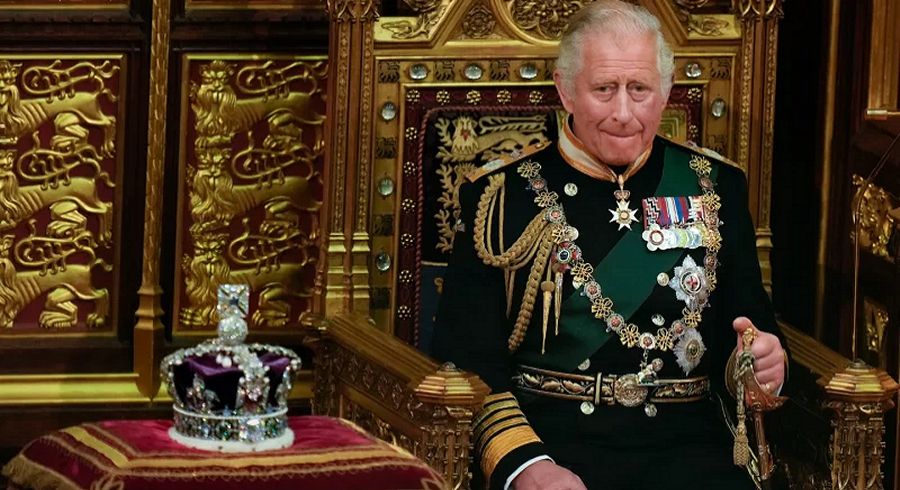
King Charles III, aged 75, is suffering from a “form of cancer”, Buckingham Palace announced Monday February 5 in a press release. The palace did not specify what cancer it was, only saying it was not prostate cancer. The sovereign was hospitalized for three days in a private London clinic for prostate surgery, then was released on January 29.
“During the king's recent hospital procedure for benign enlargement of the prostate, a separate problem was noted” and “subsequent tests identified a form of cancer,” the palace explained in its statement. According to Buckingham Palace, the king "remains completely positive about his treatment and hopes to return to full public duties as soon as possible."
The king has “chosen to share his diagnosis to avoid speculation and in the hope that it can help the public understand all those around the world affected by cancer”, also specifies Buckingham Palace.
The King of England says he has informed his loved ones, including his youngest son, Harry, who will return to England for a few days to visit his father. In the wake of the press release announcing the cancer of Charles III, the British Prime Minister wished, on his account X, a “speedy and complete recovery” to the sovereign.
King Charles, aged 75, began treatment today and will suspend his public appearances, the Palace said.
During this period, he will continue to fulfill his duties as head of state and receive the famous “red box” containing all official documents. His weekly audiences with the Prime Minister are also maintained. According to Buckingham, it is still too early to know when he will fully resume his public engagements.
His eldest son, the Prince of Wales, William, 41, is expected to replace the king for many of his engagements. Queen Camilla and Princess Anne, aged 76 and 73 respectively, will continue their commitments. However, they will not be able to be supported immediately by Kate, the Princess of Wales having just undergone a serious abdominal operation at the end of January. Buckingham Palace has no plans for her to appear in public in the coming weeks – not until Easter.
A speedy recovery to King Charles III. |
|
|
| | Kate White for DayNewsWorld |
 |
GRAMMY AWARDS
THE ABSOLUTE TRIUMPH OF TAYLOR SWIFT
MOST AWARDED ARTIST FOR HER ALBUMS
|

The singer triumphed at the 66th Grammy Awards ceremony by winning two awards including the very prestigious one for best album of the year for Midnights. Taylor Swift thus enters the history of the music industry: she is the first artist to be awarded four times in this category. In front of Frank Sinatra, Stevie Wonder and Paul Simon. .
To present her with this new trophy, Céline Dion made a surprise appearance, an event as the Canadian singer has become rare since the announcement of her illness in 2022.
On the stage of the Crypto.com Arena, she did not hide her emotion “I would like to tell you that it is the best moment of my life, but I also feel happy when I finish a song, when I decipher the code of a bridge that I like, when I shoot a music video, when I rehearse with my team or when I prepare to go to Tokyo for a concert. […] Thank you so much for giving me the opportunity to do what I love so much, I’m blown away! » Before Midnights, Taylor Swift's albums Fearless, 1989 and Folklore had already won awards.
Taylor Swift was also rewarded at the start of the evening with the prize for best pop album with Midnights, and then took the opportunity to achieve a major marketing coup, by announcing the release of a new album on April 19, entitled The Tortured Poets Department . “It’s called The Tortured Poets Department. I'm going to post the cover right away backstage! " No sooner said than done.
Nice marketing stunt for the release of a new album
The cover of The Tortured Poets Department was immediately posted on the star's social networks, captioned with a few lines that seem to form the lyrics of a song: “And so I enter into evidence / My tarnished coat of arms / My muses, acquired like bruises / My talismans and charms / The tick, tick, tick of love bombs / My veins of pitch black ink / All's fair in love and poetry…” All concluded with an enigmatic signature: “Sincerely, The Chairman of the Tortured Poets Department. »
The 34-year-old singer won against other pop stars like Lana Del Rey and Olivia Rodrigo.
The singer continues her extraordinary trajectory: hailed as the personality of the year 2023 by the prestigious Time magazine, she seduces a global audience with her breathtaking tour entitled “The Eras Tour”. Its financial triumph is equally impressive, generating revenues that exceeded the astronomical billion-dollar threshold over sixty performances last year. An unparalleled financial feat in the history of the music industry.
Women in the spotlight
The 66th edition of the Grammy Awards also highlighted the omnipresent influence of women in the American musical landscape, marking a resolutely feminine ceremony
Billie Eilish added another accolade to her already impressive collection, winning the Grammy for Song of the Year for her melancholic ballad "What Was I Made For?", a captivating composition created for the soundtrack of the movie Barbie. Greta Gerwig's film project, which was one of the stars of the evening, received eleven nominations, mainly for its remarkable soundtrack.
The evening was marked by significant victories for female artists, including Miley Cyrus, winner of the award for Best Pop Solo Performance for her hit "Flowers", which she performed passionately on stage. All-female band Boygenius also shined, taking home three trophies in the rock categories at the pre-ceremony, which saw most of the more than ninety Grammys presented.
Tracy Chapman was warmly cheered with a standing ovation during her rare appearance on stage, where she performed her iconic hit "Fast Car" in a duet with Luke Combs.
This poignant moment marked the start of the evening, and the country singer also received a nomination this year for this cover of 1988.
The Grammy Awards also paid tribute to Joni Mitchell, emblematic figure of the Woodstock generation. At 80, the Canadian made her debut on the ceremony stage, winning the award for Best Folk Album, well-deserved recognition for her exceptional contribution to the music industry.
The 2024 Grammy Awards list
Album of the year: Midnights, by Taylor Swift
Record of the Year, awarded for overall performance of a song: “Flowers,” by Miley Cyrus
Song of the year, attributed to authors and composers: “What Was I Made For?” » (from the film Barbie), by Billie Eilish & Finneas O'Connell, authors
Revelation of the year: Victoria Monét
Best Rap Album: Michael, from Killer Mike
Best rock album: This is Why, by Paramore
Best pop album: Midnights, by Taylor Swift
Best R'n'B album: Jaguar II, by Victoria Monét
Best Country Album: Bell Bottom Country, by Lainey Wilson
Best alternative music album: The Record, by Boygenius
Best World Music Album: This Moment, by Shakti
Best R'n'B Song: “Snooze,” by SZA
Best Rap Song: “Scientists and Engineers,” by Killer Mike
Best pop solo performance: Miley Cyrus, for “Flowers”
Best Pop Duo or Collective Performance: “Ghost in the Machine,” by SZA and Phoebe Bridgers
Best Music Video: “I’m Only Sleeping,” by The Beatles
Producer of the Year: Jack Antonoff
Congratulations again to the beautiful Taylor Swift. |
|
|
|
| Boby Dean for DayNewsWorld |
 |
SALVADOR NAYIB BUKELE THE COOL DICTATOR RE-RENEWED PRESIDENT
|
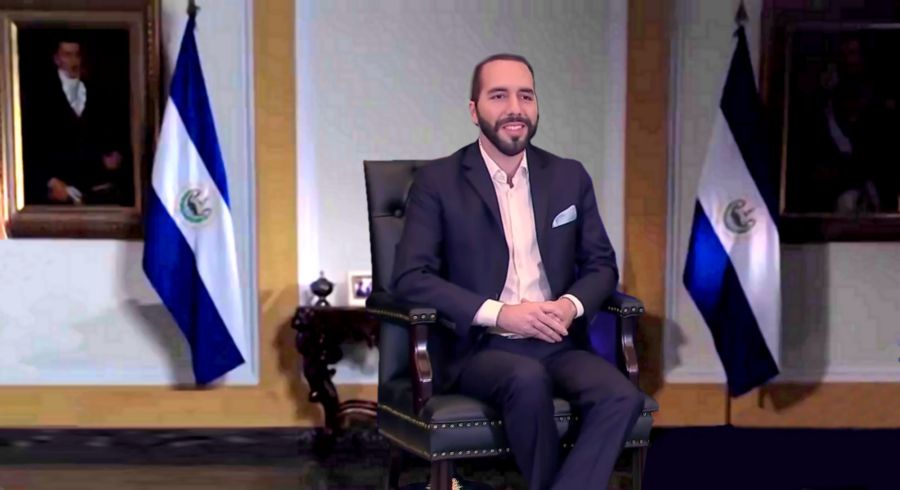
|
Nayib Bukele overwhelmingly won the presidential election in El Salvador on Sunday February 4, 2024, obtaining, according to a CID-Gallup exit poll, an impressive support of 87% of the votes. Nuevas Ideas, his party, is assured of a large majority in Parliament.
The 42-year-old re-elected president expressed his conviction that El Salvador now knows a true democracy. “This is the first time that there is democracy in the country,” said Nayib Bukele. “There is no dictatorship, people vote in democracy. The people say: I am not oppressed, I am happy.”
A relentless security policy
The indisputable popularity of this leader, often described as a "cool dictator", is attributable to his implacable security policy implemented during his first mandate. This merciless struggle, which began two years ago, transformed the capital, once ranked among the most dangerous in the world, into one of the safest in the space of a few months. Nayib Bukele's policy succeeded in reducing the number of homicides in the country by 70%.
75,000 arrests
President Nayib Bukele took a decidedly radical approach to remedying the situation in El Salvador: in March 2022, he established a state of emergency, authorizing the deployment of the army on Salvadoran streets and allowing warrantless arrests . Since then, as many as 75,000 people have been arrested, an unprecedented measure for a population of 6.5 million. In addition, the head of state oversaw the construction of a mega prison that he called a “terrorism containment center,” where no lawyers are allowed to enter and all contact with the outside world is prohibited.
For years, El Salvador had been ravaged by the two main maras (gangs), Salvatrucha and Barrio 18, which sowed terror in every street of the country. Their members, often sporting tattoos up to their faces to recognize each other, controlled a large part of the territory, practicing racketeering, assassination, and establishing a climate of extreme violence. The settling of scores often ended with the dismemberment or decapitation of the adversaries. Getting around the streets of San Salvador sometimes required significant detours if the taxi driver had not paid the required amount to the appropriate people.
Going out into the streets at night was unthinkable without the protection of one of the gangs.
Nayib Bukele compared El Salvador's previous situation to widespread cancer. “El Salvador had cancer with metastases. 85% of the territory was dominated by gangs,” he recalls. "We have done surgery, chemo, radiotherapy and we are going to come out cured, without the cancer in the bands. We have eliminated what was killing us. What now awaits El Salvador is a period of prosperity."
A broken economy
This February 4, Nayib Bukele promised an era of prosperity "because there is no longer any brake on business creation, no more brake on studies, no more brake on work, no more brake on tourism". According to the president, victory over insecurity will allow the country to deploy its economic potential, an urgent necessity given that 70% of jobs are in the informal sector, thus depriving workers of health and retirement benefits. The United Nations Economic Commission for Latin America and the Caribbean (Cepal) estimates that 30% of the Salvadoran population lives in poverty.
The country's economic reality is largely based on remesas, these money transfers made by expatriates, which generate 21% of GDP. In this dollarized economy, Nayib Bukele tried to make bitcoin the official currency in 2021, a decision criticized by the IMF due to the high volatility of this cryptocurrency.
Nayib Bukele's security policy and his successes are arousing keen interest in other Latin American countries plagued by insecurity, both from the new Ecuadorian president, Daniel Noboa, and from his Argentine counterpart, Javier Milei.
|
|
|
|
| | Jaimie Potts for DayNewsWorld |
 |
BORIS NADEJDINE CANDIDATE
AGAINST VLADIMIR PUTIN IN THE KREMLIN | 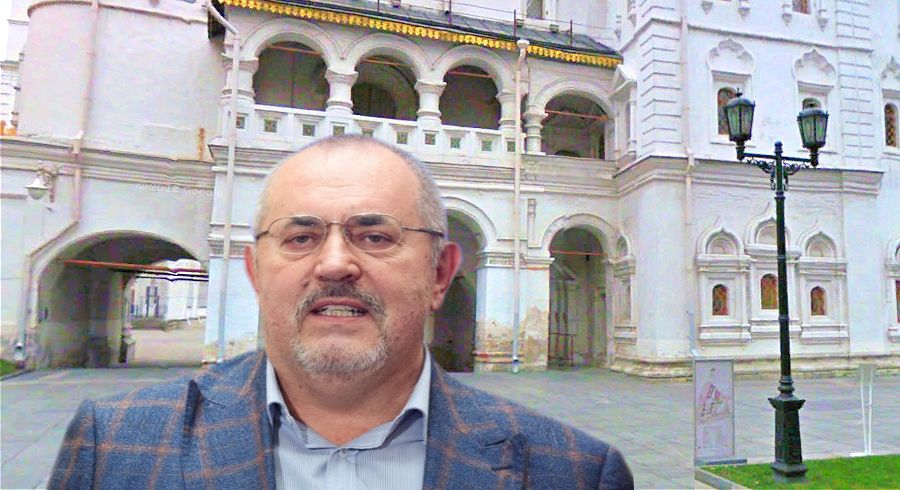
This Wednesday, January 31, 2024, Boris Nadejdine formalized his candidacy for the Russian presidential election against Vladimir Putin after having gathered the necessary 100,000 signatures. Firmly opposed to the war in Ukraine, he risks prison for his positions and his position as candidate "I am running for elections as a principled opponent of the current president's policies."
Little known to the general public, this veteran of Russian political life, who advocates the "end" of the assault in Ukraine and denounces the authoritarian drift of Vladimir Putin, has aroused an unexpected enthusiasm in recent days, tens of thousands of Russians mobilizing to support his candidacy."Thank you very much to those who believed in us", declared this ex-liberal MP to the press.
“Everything went well,” he stressed about the collection of signatures from more than 100,000 voters supporting him, the threshold necessary to see his candidacy validated by the authorities.
Boris Nadezhdine, opponent of Vladimir Putin, officially submitted his candidacy on January 31. Between March 15 and 17, he will try to take the place of the head of state who has been in the Kremlin for 24 years.
A physicist who became an MP
Born in 1963, Boris Nadejdine is a physicist by training and began to take an interest in the problems of his country at the age of 17, before launching into politics. Unknown to the general public, the candidate is nevertheless well established. He began his career at the municipal council of Dolgoprudny, an oblast of the city of Moscow, in 1990.
After an initial failure to be elected to the Duma - the Russian Federal Assembly - he became an advisor to Deputy Prime Minister Boris Nemtsov - assassinated in 2015 - before finally obtaining a seat in the Duma in 1999. He joined the Union group there. right-wing forces.
He became known in particular for having defended a bill aimed at making the income and assets of civil servants accessible to the public or for the law on elections and referendums, which obliges each polling station to publish its results on the Internet.
Opposition program
It is through his position on the war in Ukraine that Boris Nadejdine stands out. Firmly opposed to the “special military operation” launched by Vladimir Putin in February 2022, his position stands out.
The candidate finally obtained the 100,000 signatures necessary to officially present himself against Vladimir Putin by touring the country and appearing regularly with Russian soldiers mutilated at the front or their bereaved families. In his campaign manifesto, he pledged to “bring everyone home.”
Beyond his anti-war speech, Boris Nadejdine wants to refocus on the country's internal problems and promises amnesty to political prisoners. The candidate would also like to establish direct suffrage for local representatives.
He criticized the Sino-Russian rapprochement initiated by Vladimir Putin, while advocating a strengthening of ties with Western Europe. On societal issues, Boris Nadejdine described the anti-LGBT law as a "return to the Middle Ages", and spoke out for a relaxation of the rules on abortion.
Positions which have earned him the support of opponents of the leading Russian president. The anti-corruption collective founded by Alexeï Navalny, the fierce critic of Russian power currently in prison, is in favor of him. Mikhail Khodorkovsky, the anti-Putin billionaire in exile, also spoke in his favor. Just like Ekaterina Dountsova, journalist and opponent of Vladimir Putin, who has just seen her own candidacy for the presidential election rejected for “formal defects” by the electoral commission.
The Kremlin in action?
What should Vladimir Putin be concerned about ?
Not necessarily, and Dmitri Peskov, Kremlin spokesperson, declared on Wednesday January 24: this candidate “does not scare us”. Some of the opponents of the master of the Kremlin also find the new champion of their cause too perfect to be honest. They are surprised that he was able to express himself so freely to criticize Vladimir Putin without being disturbed. Others before him went to prison for such comments.
Why is he spared?
Perhaps the head of the Kremlin “does not consider me a terrible threat”, admits the opponent. A hypothesis that Moscow does not fail to confirm, arguing that it does not “consider it as a competitor”.
Despite his prestigious support and his positions, Boris Nadejdine has "too many handicaps to represent a real danger for the regime", believes Jeff Hawn, specialist in Russia at the London School of Economics.
This politician “embodies all the values defended by the men in power in Russia in the 1990s, and he is the heir of this generation largely discredited in the eyes of a majority of the Russian population,” summarizes Jeff Hawn. For him, he is a candidate who will please the intelligentsia of big cities and the diaspora, but ordinary Russians have very bad memories of the forced economic reforms of the 1990s.
At 60 years old, the person himself, however, has few illusions about the result of the presidential election, as the re-election of Vladimir Putin, in power since 2000, seems obvious.
“But I hope that March 17 will perhaps mark the end, the beginning of the end of the Putin era,” he confided in an interview a few days ago. |
|
|
|
| Garett Skyport for DayNewsWorld |
 |
THE RELEASE OF A HOVING PIGEON SUSPECTED OF SPYING | 
On Tuesday, India released a pigeon that had been imprisoned for eight months in Mumbai. The bird suspected of espionage was finally cleared, we learned on Friday from the animal rights organization Peta.
The bird was intercepted in May carrying an “illegible message” and placed in detention in a veterinary clinic in Bombay (west), before being released on January 30, 2024 by the police, this source said.
According to the Times of India daily, the message was written in Chinese, which alarmed investigators.
“The police had opened a procedure for espionage against the bird, but closed the file at the end of their investigation,” states the newspaper.
The investigation ultimately revealed that the animal had gotten lost after participating in a race in Taiwan.
Arrests of homing pigeons for espionage are not uncommon in India.
In 2020, the Kashmir police arrested and then released a bird belonging to a Pakistani fisherman, recalls the APNews press agency.
In 2016, another bird was imprisoned after being intercepted near the Pakistani border, carrying a threatening message towards Prime Minister Narendra Modi.
Espionage has a bright future ahead of it ! |
|
|
|
| Abby Shelcore for DayNewsWorld |
 |
HOW WILL TAYLOR SWIFT REACT
VICTIM OF PORNOGRAPHIC DEEPFAKES
ON SOCIAL NETWORKS ? | 
Last week, singer Taylor Swift was the victim of pornographic deepfakes, ultra-realistic photo and video montages generated by AI and distributed on social networks. This content allegedly comes from a Telegram group specializing in the creation of sexual montages involving women.
One of the images featuring the famous American artist was viewed nearly 50 million times on X, where it remained accessible for almost 24 hours before being removed, sparking outrage among the artist's millions of fans , voted the most listened to in the world in 2023.
This incident prompted “swifties” to mobilize to counter the proliferation of these deepfakes. Fans massively posted the message "PROTECT TAYLOR SWIFT" in capital letters, accompanied by excerpts from the artist's concerts to overwhelm the explicit content. More than 200,000 messages of support were recorded over the weekend, marking a general protest movement against pornographic deepfakes involving women.
Faced with the controversy, X, Elon Musk's network, ended up removing the controversial images, closing the accounts involved in their distribution and blocking all searches linked to the singer's name. “A temporary measure, taken with extreme caution, because we prioritize safety,” according to the platform, which did not specify how long it would last.
Women: the first victims of deepfakes
This decision by the social network comes a few hours after an intervention by the White House on the subject. “We are alarmed by reports of the circulation of these false images,” Karine Jean-Pierre, spokesperson for the American executive branch, told the press.
The White House wants to push Congress to pass federal law against AI-generated porn deepfakes.
For the moment, around ten American states have already taken measures in this direction but no federal law criminalizes the dissemination of deepfakes. The platforms were also ordered to act more quickly to fight against the dissemination of these images.
“A zero tolerance policy”
It could mark awareness against a scourge which targets almost exclusively women.
The widespread use of technology to generate sexual videos without the consent of women, whether famous or anonymous, has become a major issue. According to a survey conducted by cybersecurity company Home Security Heroes, pornographic deepfakes accounted for 98% of global production in this category last year.
Wired magazine reports that as many as 113,000 such videos have been uploaded to porn platforms in the past year. With advances in artificial intelligence, specialized forums now disseminate advice allowing anyone to create content undressing a person of their choice in a few clicks, from a simple photo.
Global icon Taylor Swift, named Time magazine's 2023 Person of the Year, known for influencing the copyright policies of companies such as Apple and exposing Live Nation's questionable copyright practices. he concert industry, could play a decisive role in the fight against Deepfake Porn.
Let's wait for his next speech on this hot topic.
|
|
|
|
| Kate White for DayNewsWorld |
 |
UNDERSTANDING THE ANGER OF EUROPEAN FARMERS
|

Anger is spreading across the entire agricultural sector of the European Union. Spanish farmers have just announced this Tuesday, January 30, 2024, that they are joining the European protest movement. The three main Spanish agricultural unions announced on Tuesday that they were joining the angry movement of European farmers, with a series of "mobilizations" across the country over the "coming weeks".
“The agricultural sector in Europe and Spain is facing growing frustration and unease”, due in particular to “the stifling bureaucracy generated by European regulations”, explained in a joint press release Asaja, the UPA and the Coag.
Producers and breeders are expressing their discontent in many Member States, denouncing insufficient remuneration for their efforts, criticizing the environmental standards imposed by the EU and expressing concerns about the trade agreements concluded by the 27 with various partners.
Barricades, snail operations, demonstrations: the sector is trying to make its voice heard.
Anger in France
France's main agricultural union, FNSEA, said protests would continue "this week and for as long as necessary", considering nationwide actions as the movement gains momentum. This discontent is not limited to France. European farmers, already facing economic losses linked to the climate crisis, are protesting against green policies that they consider contradictory, unfair and worrying for their future.
Why are French farmers angry?
The anger of French farmers stems from a complex combination of varied policies and funding cuts. The increase in the cost of agricultural diesel, following the removal of subsidies, as well as the additional costs of 47 million euros per year linked to water consumption are causing their dissatisfaction. Additionally, the complexity of the regulations leaves them confused about what they can and cannot do.
They oppose pesticide and herbicide bans imposed by the EU's Green Deal, as well as a new EU treaty that could make it easier to import Brazilian and Argentinian beef. Farmers find it difficult to compete with these countries, which are not subject to strict animal welfare standards.
Faced with contradictory policies, the agricultural sector is trying to reconcile reducing the environmental impact of agriculture with increasing food production. The decline in the number of people working in food production raises concerns about the future.
Although some demands were heard in December, with cancellations of plans to increase authorization fees and proposed restrictions, tension persists. After a meeting with the new French Prime Minister, Gabriel Attal, and the Minister of Agriculture, Marc Fesneau, the union president Arnaud Rousseau declared that there would be "no lifting of the actions as long as there is no "There will be no concrete decisions." The French government responded by saying it had “heard their call” and promised announcements in the coming days.
Protests also in the Netherlands and Germany
German and Dutch farmers share the same concerns about what they consider unfair and unpredictable decisions by governments on agriculture.
Last year, Dutch farmers blocked roads, dumped manure in the streets and protested outside politicians' homes against regulations aimed at reducing nitrogen emissions.
Agriculture, which is one of the main areas of global exports, is responsible for around half of the Netherlands' total nitrogen emissions. In 2019, the country's highest administrative court ruled that the nitrogen permit system did not prevent these emissions from harming specially protected nature reserves, known as the "Natura 2000" network.
Although the initial decision did not make headlines, the government quickly announced that it would have to take "drastic measures" to remedy the situation, including buying up and closing livestock farms.
The sudden announcement of these cuts made farmers feel like they were not being treated fairly. They have already reduced nitrogen emissions significantly over the past 30 years and funding for rural areas has been reduced in favor of urban investments.
Previous government policies had encouraged them to expand, but now debt-ridden farmers are being told they must reduce the size of their farms.
The protests led to the creation of the right-wing political party, BoerBurgerBeweging (BBB), which promised farmers a greater say in agricultural policy. In 2023, the BBB won the provincial elections, and after the senatorial elections, it became the party with the highest number of seats in the Dutch Senate.
In Germany, frustration is growing over plans to phase out fuel subsidies, worth up to 3,000 euros a year for an average company.
Long-term dissatisfaction with perceived unfair enforcement of environmental policies further fuels tensions.
Since December, German farmers have been taking to the streets, and on Monday in Berlin, they were joined by environmental activists, forming a procession of heavy vehicles along the streets of the capital.
They claim to support green and non-genetically modified agriculture, but demand subsidies or, at the very least, a fair price for their food products.
In the east of the EU also against Ukraine
Exasperation also extends to the east of the EU, with demonstrations in Poland, Romania, Slovakia, Hungary and Bulgaria. Farmers in these countries complain about unfair competition from cut-price grain from Ukraine.
Border crossings in Romania and Bulgaria were clogged with tractors and trucks, expressing their disagreement. Last April, Poland's agriculture minister resigned over the dispute, although new subsidies have partially eased the situation.
In Romania and Bulgaria, border crossings were clogged with tractors and trucks, a sign of palpable discontent. Last April, Poland was rocked by the resignation of its agriculture minister over the dispute, although new subsidies have partially eased tensions.
However, many concerns remain about high taxes and increasingly strict regulations. As farmers face the ravages of droughts, floods and wildfires, they say green policies are burdening them further.
Agriculture a major issue in the European elections?
The protests could spread even wider in the coming weeks, with Spain and Italy set to join the movement.
On Thursday, the European Commission will begin strategic discussions with farmers' unions, agricultural companies and experts to try to ease tensions.
As tensions intensify, agriculture is emerging as a major issue at the European Union level, in the run-up to the European elections scheduled for June.
|
|
|
|
| Andrew Preston for DayNewsWorld |
 |
ISRAELI ARMY FLOODS TUNNELS
FROM HAMAS | 
The Israeli army admitted on Tuesday to sending "large volumes of water" into tunnels used by the Palestinian Islamist movement Hamas in the Gaza Strip to "neutralize" them, ensuring that it would not compromise access to water. drinking water of the civilian population
“Various tools have been developed to send large volumes of water into the tunnels (...),” the army said in a statement.
“This capacity has been professionally developed, including analysis of soil and pipe characteristics” in the affected areas to ensure there is no damage to groundwater, she said. clarified, referring to a method used only in places where it was “appropriate”.
Seawater pumped into the Mediterranean
At the end of 2023, local media cited Israeli sources indicating that the army planned to flood the galleries with seawater pumped from the Mediterranean, off the small coastal territory.
The head of the army, Herzi Halevi, saw it as “a good idea”. But some scientists and humanitarian officials said they feared contamination of the water tables.
The Gaza Strip is between six and 12 km wide, and the salinization of groundwater is already a scourge there, made worse by rising ocean levels. Added to this is a chronically faulty wastewater disposal network and uncontrolled use of pesticides and herbicides.
In November, the UN humanitarian coordinator for the Palestinian Territories explained that she feared for the quality of water, including for “future generations”.
A network of underground tunnels sophisticated by Hamas
Hundreds of galleries have been dug under the border with Egyptian Sinai to move people, goods, weapons and ammunition between Gaza and the outside world.
After the war between Israel and Hamas in 2014, Hamas expanded the network, from which its fighters can emerge to fire their rockets towards Israeli soil. In a study published on October 17, the Institute of Modern Warfare at the American Military Academy West Point mentions 1,300 galleries over 500 kilometers.
The construction of this network of sophisticated underground tunnels by Hamas was a long-term project, spanning two decades. In the star-shaped tunnel, all sense of direction is abolished. Are we heading towards Gaza? Is it towards Egypt? We lose all points of reference. These tunnels are not built in a linear fashion, they are zigzag. They are on several levels. With arteries, rooms, halls, doors, electricity. a A military base under a civilian population.
It's a real military base. It is a military base under a civilian population.
They allow Hamas to operate far from the technological eyes of the State of Israel and the Israeli army, which is nevertheless one of the most efficient armies in the world.
The possibility of external influence, notably from Iran, is considered. Although this cannot be confirmed at the moment, there are similarities with other countries like North Korea or Iran, where wider tunnels could allow the passage of motorcycles or even trucks. It is also possible that certain locations are used for the manufacture and storage of weapons.
From a strategic perspective, a tunnel can serve a variety of purposes, including attacks, ambushes, kidnapping of civilians or soldiers, or even trafficking. Not all tunnels are the same, which means their detection and elimination may vary.
Current operation a considerable challenge
Underground warfare itself is complex, and combating underground tunnels has always been a major challenge for armies. Finally, a delicate human dimension is added to the situation, with priorities being the protection of hostages, innocent civilians in Gaza, and the safety of the soldiers engaged in these operations.
“For Israel, this is an existential war." |
|
|
|
| Alize Marion for DayNewsWorld |
 |
SANCTIONS AGAINST THE UN AGENCY
FOR THE PALESTINIANS
FACING THE INVOLVEMENT OF MEMBERS
IN OCTOBER 7 | 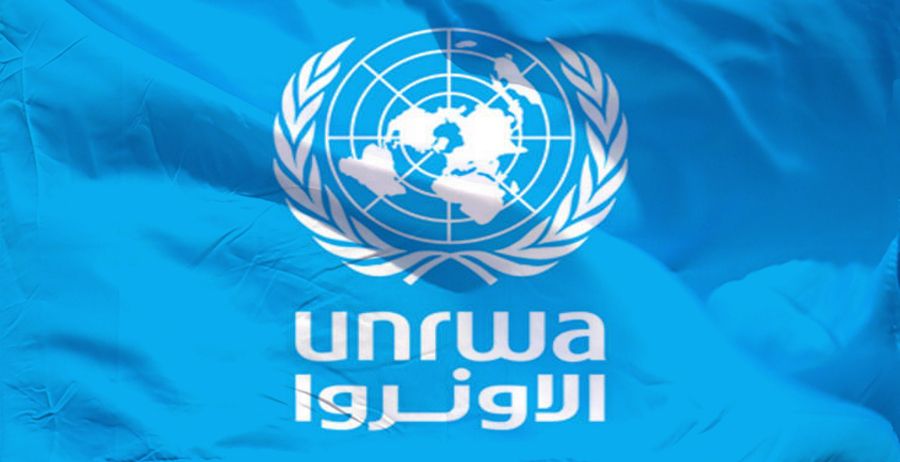
A situation which could not have arisen at a more delicate time for the Palestinian population of the Gaza Strip affected by the bombings. The financial viability of the United Nations Palestinian Refugee Agency (UNRWA), essential as the only source of emergency assistance, is now seriously compromised.
The United States and Germany, the two largest contributors, along with six other countries - Canada, Australia, Italy, the United Kingdom, Finland and the Netherlands - have suspended financial aid to following the involvement of at least twelve members of the agency out of 30,000 employees in Gaza in the massacres committed by Hamas on October 7 in the south of the Gaza Strip, which left nearly 1,200 dead. France, like Switzerland, declares that it does not plan a new payment in the first quarter of 2024”, but “will decide when the time comes on future conduct”.
10% of UNRWA employees have links with the terrorist group
Details of the affair were revealed by Israeli military intelligence before being passed on to the Americans. Philippe Lazzarini, head of UNRWA, confirmed these reports and revealed that the agency had terminated the contracts of some of its employees, simultaneously launching an independent and transparent investigation. Antonio Guterres, Secretary General of the UN, horrified by these revelations, specified that nine employees were fired, another lost his life, while the fate of the last two remains unknown. However, Israeli services estimate that the number of employees involved in blood crimes could be higher.
After expressing regret, Philippe Lazzarini described the reaction of contributing countries as "shocking", emphasizing the vital role of UNRWA in the survival of 2.2 million Palestinians in the Gaza Strip, facing a catastrophic humanitarian situation. .
The agency assumes responsibility for the education of more than half a million children, in addition to providing food assistance in dribs and drabs in an enclave where 80% of the population was already living below the poverty line before the war. This institution extends its action among refugees in Jordan, Lebanon, Syria and the West Bank. Established in 1949 after the expulsion or flight of 700,000 Palestinians following the war that led to the creation of the State of Israel, it remains the most important agency of the UN. A notable particularity lies in the fact that only the Palestinian people benefit from refugee status from generation to generation, currently bringing the number of Palestinians supported by UNRWA to 6 million.
According to Israel, maintaining refugee status only exacerbates the conflict. Foreign Minister Israel Katz called on Philippe Lazzarini to resign, welcoming the cessation of international contributions. He believes that UNRWA will have no role after the war, accusing the agency of perpetuating the refugee issue, obstructing peace, and serving as Hamas' civilian army.
In December, the previous Minister of Foreign Affairs, Eli Cohen, denounced Antonio Guterres, accusing him of endangering world peace by harshly criticizing the impact of Israeli military operations in the Gaza Strip on the civilian population.
|
|
|
|
| Garett Skyport for DayNewsWorld |
 |
ATTACK BY THE HOUTHIS
FROM AN AMERICAN WARSHIP
IN THE RED SEA | 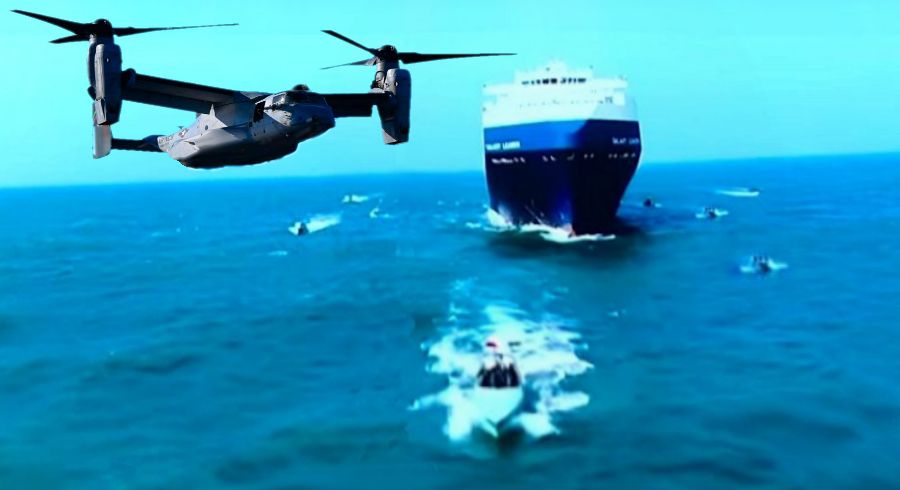 The Red Sea is the scene of a new escalation as Yemen's Houthi rebels launched a missile Friday at a US warship, the destroyer USS Carney, patrolling the Gulf of Aden. The attack represents a major turning point in the confrontation at sea, marking the first time the Houthis have directly targeted a US warship since beginning their attacks on shipping in October. The Red Sea is the scene of a new escalation as Yemen's Houthi rebels launched a missile Friday at a US warship, the destroyer USS Carney, patrolling the Gulf of Aden. The attack represents a major turning point in the confrontation at sea, marking the first time the Houthis have directly targeted a US warship since beginning their attacks on shipping in October.
The incident forced the US warship to shoot down the projectile, while overnight from Friday to Saturday, Houthi missile fire also ignited another commercial vessel. Early Saturday, U.S. forces responded with a strike against a Houthi anti-ship missile aimed at the Red Sea and ready for launch, according to U.S. military Central Command.
The US strikes took place near the port city of Hodeida, according to the Houthis' Al-Masirah satellite news channel, which however did not provide an assessment of the damage caused. Houthi military spokesman Brigadier General Yahya Saree did not acknowledge the attack on the Carney but claimed responsibility for the missile attack on a commercial vessel, identified as the Marlin Luanda-flagged oil tanker. Marshall Islands.
The UK's Maritime Operations Service, which oversees Middle East waterways, also confirmed that a ship had been hit by a missile and was on fire in the Gulf of Aden. Central command clarified late Friday that the Marlin Luanda had been hit by an anti-ship ballistic missile fired from Yemen, and that the Carney and other coalition ships provided assistance to the ship in difficulty, without doing so. state of injured.
In recent weeks, the Red Sea has been the scene of several incidents of this type. At least six commercial ships were targeted by drones or missiles. The most spectacular attack dates back to November 19 when a Houthi commando seized a cargo ship belonging to an Israeli businessman. The Yemeni armed group filmed the operation and broadcast the images. The boat was taken to a port in Yemen. Its 25 crew members are still sequestered.
Their support for Hamas
The Houthis claim to attack boats with Israeli interests or a point of departure or arrival in Israel, in support of the Palestinians. They threaten all boats in the Red Sea, en route to Israel, as long as the populations of Gaza do not receive emergency humanitarian aid.
They invited themselves into the war. They show their support for Hamas and have several times directly targeted Israel by sending drones and missiles against its territory, notably against the city of Eilat, in the south. Devices almost all intercepted by Israel.
The axis of Iranian resistance in the Middle East
It's hard not to see Iran's hand in this. The Houthis belong to the so-called axis of Iranian resistance in the Middle East, alongside Hamas, Hezbollah in Lebanon, Shiite militias in Iraq and Syria. All these movements, enemies of Israel, are armed arms of Tehran in the region, even if they retain a certain autonomy.
The Houthis in fact have very sophisticated weapons, drones, cruise missiles, but also ballistic missiles capable of hitting ships, and therefore moving targets. Iran provides the Houthis with a major arsenal. The fact remains that Iran, the main ally of this Yemeni rebel group, the Islamic Republic, seems, for the moment, to want to avoid a regional escalation.
An obstacle to international trade
Additionally, the situation in the Red Sea is having a significant impact on maritime traffic, with a notable increase in insurance costs and adjustments to route plans for several vessels. The Houthis, a rebel group which exercises control over part of Yemen, particularly over the strategic strait regulating access to the Red Sea, pose a serious threat to international trade and freedom of navigation in this crucial region.
In fact, around a tenth of global maritime traffic passes through this area. The Bab-el-Mandeb Strait, located in the south of the Red Sea between Yemen and Djibouti, is considered the 4th most important crossing point in the world for oil tankers.
Faced with this threat, Western countries are calling for international mobilization to secure this major trade route. However, the means to influence this rebel group are limited.
Among the options considered, the military option is on the table.
|
|
|
|
| Alize Marion for DayNewsWorld |
 |
THE MYSTERY AROUND HOSPITALIZATION
OF THE PRINCESS OF WALES |

For ten days, the question has persisted among the English. Kensington Palace surprised everyone on Wednesday January 17 by announcing the hospitalization of Kate Middleton. According to the official statement, the Princess of Wales was admitted to the London Clinic the day before for “planned abdominal surgery”.
Despite this announcement, the details provided by officials remain rather limited. We only know that “the operation was successful”, and the press release specifies that the wife of Prince William will remain in the hospital “for ten to fourteen days”, with a total absence of royal commitments until at Easter, March 31.
The question on people's minds concerns the mystery surrounding the Princess of Wales. The difference in communication between the hospitalization of Kate Middleton and that of King Charles III is palpable.
Kate Middleton has made it clear that she does not wish to divulge details of her operation, despite the length of her hospital stay being significant, and that she will be refraining from official duties until Easter. The royal family has the right to a certain amount of privacy in medical matters, and Catherine chose to exercise this right.
However, the English are particularly curious, given how invested the princess is in her royal commitments. She is actively involved in numerous charitable works, mainly focused on early childhood. At the same time, she lives a happy marriage with Prince William and enjoys her family life.
It is this combination of elements that fuels the public's curiosity about them.
|
|
|
|
| Kate White for DayNewsWorld |
 |
SUCCESS IN THE 2024 CESAR NOMINATIONS | 
We could experience a moving moment of history on February 23, 2024. This year, three women filmmakers are nominated in the Best Director category: Justine Triet with Anatomie d'une chute, Catherine Breillat with L'Été last and Jeanne Herry with Je I will always see your faces dominate the selection alongside Cédric Kahn (The Goldman Trial) and Thomas Cailley (The Animal Kingdom).
The screening of “Little Girl Blue” amazed spectators during the 76th Cannes Film Festival. Eight months later, satisfaction sets in when discovering the film which was doubly nominated for the 2024 César, in the categories of best documentary and best actress.
Marion Cotillard embodies in a moving way the role given by Mona Achache, that of taking on the appearance and language of Carole Achache, her mother who died by suicide in 2016. The director, driven by the desire to understand the reasons for this premature death, skillfully guides Cotillard's talent through the twists and turns of a life marked by sexist attacks, childhood traumas and the neuroses that result from them.
Marion Cotillard, at the top of her art, meticulously reveals the process of her mother's incarnation, balancing between documentary and fiction. The line between the two becomes even more tenuous when the filmmaker exposes the challenges her actress faces.
In these moments, Cotillard, transcended by the story of an intimacy that is not her own, wears the flaws and the allure of Carole Achache for the duration of a film. Her face hardens when she talks about her “life as a whore and the daughter of intellectuals,” her voice broken by misogynistic violence. “Little Girl Blue”, as a singular cinematographic object, deserves recognition for its strength of interpretation and its raw, striking truth (Valentine Servant-Ulgu).
Rejoice also for the nomination of three directors for the prize for best direction. February 23, 2024 could be marked by a historic moment, with Justine Triet, Catherine Breillat and Jeanne Herry in the running. The last director to win this prize was Tonie Marshall in 2000. Triet continues to collect nominations, notably for the Oscars, while Breillat makes a successful critical comeback after more than ten years. Herry, hailed for her film on restorative justice, completes this promising picture (VSU).
Finally, the reason to rejoice materializes in the faultless performance of the actresses of “I will always see your faces”.
Adèle Exarchopoulos, Miou Miou, Élodie Bouchez and Leïla Bekhti deliver powerful performances, each embodying characters marked by different traumas. |
|
|
|
| Britney Delsey for DayNewsWorld |
 |
There are no translations available.
RISOTTO BUTTERNUT NOISETTES
|
Voici la version hivernale et surtout délicieuse du risotto pour 4 personnes.
Ingrédients
300 g de riz carnaroli
1 butternut
160 g de noisettes
1 gros oignon blanc
50 g de beurre
300 g de parmesan râpé
1 verre(s) de vin blanc
1,2 l de bouillon de champignons ou de légumes
1 cuillère(s) à soupe d'huile d'olive
poivre du moulin
Préparation
Taillez l’oignon en petits dés. Épluchez la courge butternut, évidez-la et taillez-la en petits cubes. Concassez les noisettes en petits morceaux avant de les torréfier à la poêle.
Faites fondre le beurre dans une casserole avec un peu d’huile d’olive. Faites-y blondir les oignons. Ajoutez la courge et faites revenir les dés pendant 5-6 mn à feu moyen.
Augmentez le feu puis ajoutez le riz. Mélangez. Il doit nacrer : devenir légèrement translucide. Versez le vin blanc et la première louche de bouillon après 5 mn de cuisson du riz. Ajoutez 5 louches de bouillon 5 mn plus tard. Vérifiez que le riz soit toujours imbibé, remuez constamment durant le temps de cuisson indiqué. Versez du bouillon dès que nécessaire.
Vérifiez la cuisson du riz, il doit être al dente. Retirez la casserole du feu et ajoutez 4 bonnes poignées de parmesan.
Dressez dans une assiette en terminant avec les noisettes torréfiées, du parmesan râpé et un tour de moulin à poivre.
|
|
|
|
| Marie-Chantal de Verneuil pour DayNewsWorld |
 |
THE CLOTH OF THE CONSTITUTIONAL COUNCIL AGAINST PARLIAMENT THE VOICE OF THE FRENCH
THE WIDELY CENSORED IMMIGRATION LAW | 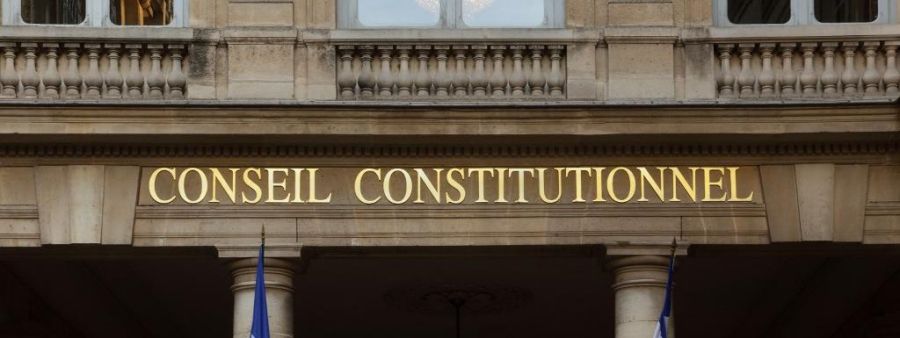
The Constitutional Council announced this Thursday afternoon that more than 30 articles (out of 86) of the immigration law were contrary to the Constitution or had no place in the text. The tightening of family reunification, the extension of the length of residence of non-Europeans, annual migration quotas and financial guarantees for foreign students are among the main provisions censored.
All these provisions introduced by the Senate were censored as legislative riders, the legislator not having the right to add provisions unrelated to the subject addressed by the bill. For these articles, the Constitutional Council did not have to take a substantive position on the constitutionality of these measures.
.The text, reduced by 40% of its volume, has regained its initial size, with four chapters: the reform of foreigners' litigation, that of the right to asylum, the integration of foreigners in particular through work and the question of removal of delinquent foreigners.
He largely censored the law by removing numerous measures obtained by the right.
LR calls for a new text
After the censorship of the Constitutional Council, the Les Républicains party asked the government to include the censored provisions in a new text.
"We ask the government to resume as quickly as possible in a specific legislative text all the provisions invalidated by the Constitutional Council as 'legislative riders'", indicates the party in a press release signed by its boss Eric Ciotti, as well as the president of the group in the Senate Bruno Retailleau and his counterpart in the National Assembly, Olivier Marleix.
In a press release, MEP LR François-Xavier Bellamy denounces "a coup against a law that the French were waiting for". “By asking the Constitutional Council to empty of its substance a text voted by Parliament and massively supported by society, the government proves that it does not want our country to be able to regain control of immigration. This confirms the requirement carried by LR of a referendum on this crucial subject", he writes.
Bardella denounces "a coup by the judges, with the support of the President of the Republic"
The president of the National Rally, Jordan Bardella, denounced Thursday "a coup of force by the judges, with the support of the President of the Republic himself", after the Constitutional Council rebutted, totally or partially, 35 measures of the law immigration voted in mid-December in Parliament. “The Constitutional Council censors the firm measures most approved by the French: the immigration law is stillborn. The only solution is the referendum on immigration,” added Jordan Bardella in a message published on X.
And Marion Maréchal in a message published on X .: “Those who claimed that this law would reduce immigration made fun of the French.
June 9 will be a referendum: each Reconquest ballot will be a ballot against immigration."
This censorship by the Constitutional Council is, beyond the law, an eminently political decision, in defiance of the will of the vast majority of French people.
|
|
|
|
| Garett Skyport for DayNewsWorld |
 |
UNDERSTANDING THE ANGER OF FRENCH FARMERS
|

The mobilization of farmers will last “as long as it takes for the answers to be provided,” warns Arnaud Rousseau, president of the FNSEA. Through blockades and demonstrations, tractor France is experiencing a surge of eruptive fever, demanding numerous emergency measures and more global adjustments.
Faced with their growing unease, farmers decided to make themselves heard. On trailers and in livestock trucks, tanks, modular construction, generators and tents, farmers plan to set up camp and occupy certain highways in France
“Do we still want to eat French?”, “farmers = realistic, administration = utopian”, or even: “Our end will be your hunger”.
The complaints are pouring in.
“With the increase in costs, cash flow is increasingly tight and even if prices have increased, we are far from the target.”
“Unfair competition with imported products”, “stifling standards”, “colleagues who did not receive CAP aid on time”:
The drivers are all ages, but the same fed up.
Our demands ?
Stop the excess of standards, and let's release income on our farms to allow young people to settle down and replace the 45% of farmers who will retire by 2030, summarizes Yannis Baltzer, president of the JA du Bas-Rhin.
Note that debt and loss of competitiveness pushes, every day, a farmer to end his life...
An alarming observation which crystallizes the agricultural situation and which endangers our food sovereignty.
The French agricultural model under European supervision
The decline in agricultural employment, the expansion of farms, motorization and the use of fertilizers and phytosanitary products characterize the major transformations of French agriculture since the 1950s. At the end of the war and in order to ensure the develop agricultural production, French agriculture thus came under the supervision of Europe thanks to the creation of the CAP, Common Agricultural Policy in 1962.
To stimulate agriculture, 3 tools were created: import taxes, guaranteed prices for farmers and export refunds. The subsidies allocated by the CAP are distributed according to the following model: 70% of the subsidies are called "direct", in other words farmers receive "a basic income", calculated according to the operating area, regardless of the way in which production is carried out.
The rest of the subsidies, co-financed by the member states, relate to rural development, that is to say additional support which aims to support farmers who implement environmentally friendly practices, who launch their activity or who suffer from a competitive disadvantage due to their geographical area.
Fewer and fewer farmers, who are increasingly older
By encouraging farmers to expand and gain competitiveness, it is natural that over the past 60 years, French agriculture has lost 80% of its farms and more than five million agricultural jobs. Today, French agricultural policy is therefore based on productivity thanks to the growing increase in large farms.
And for good reason, in 2010, very large farms represented 33% of French farms compared to 67% in 2016. According to the 2020 agricultural census, there are around 389,800 farms in mainland France. That's 100,000 fewer than 10 years ago. On average, they extend over 14 additional hectares than in 2010.
The proportion of operating farmers in France has declined sharply. If they represented 7.1% of total employment in 1982, they only accounted for 1.5% in 2019, or 400,000 people.
They are considerably older than all employed people: 55% of them are 50 years old or over, compared to 31% for the rest of workers. Only 1% of them are under 25 years old. They also report a weekly working time well above that of all employed people: 55 hours per week on average, compared to 37 hours for the second group.
Agriculture has always been an important sector even if it tends to decrease over the years, to represent 1.6% of the national GDP. At the European level, France is still the leading agricultural producer with a turnover of 70.7 billion euros in 2016, the second after Germany for the agri-food industry with 370 billion euros.
A podium which risks being turned upside down by ever fiercer competitiveness and the arrival of other countries in the Union. The new free trade agreements [agreements between Canada and Europe, New Zealand, Morocco or Argentina] are further crushing farmers
Increased competition from our European neighbors has greatly weakened the French agricultural situation.
Agriculture today is no longer the same as yesterday. The peasant world, which has become a minority, even marginal, in France, sees its model completely disrupted. Increasing competition from our European neighbors has considerably weakened the French agricultural situation.
Rightly so, an INSEE study since the 2000s reveals that the share of food imports has doubled, increasing the share of foreign dishes on the plate of a French citizen to 20%. Food products, although imported, are undeniably more affordable.
For several years, France has adopted a policy focused on consumer purchasing power, conditioning them to opt for lower-cost purchases. When we consider that the hourly cost in Poland is four times lower than that in France, the competition becomes fierce despite the lightness of their environmental and health standards. Due to a lack of profitability, France has thus relegated part of its crops. Faced with this competition, many French farmers have embarked on a race for profitability and expansion, forcing them to invest massively in equipment that meets their needs. new needs.
These colossal investments have led most farmers into a vicious spiral of debt, from which few have managed to emerge. A colossal burden, knowing that in 2017, nearly 20% of farmers did not receive any income...
Today, the agricultural world is in the grip of an economic, but also social, crisis. In addition to financial pressure from production changes, farmers face unprecedented moral pressure. Consumers have been questioning conventional agriculture based on petrochemicals for several years, in favor of organic agriculture that respects life.
“Farm bashing,” or the denigration of traditional agriculture, has become commonplace, undermining the trust we place in our farmers.
|
|
|
|
| Alyson Braxton for DayNewsWorld |
 |
BHUTAN
REALM OF GROSS NATIONAL HAPPINESS | 
In the constitutional monarchy of Bhutan, famous for its attachment to the concept of “gross national happiness” and its negative carbon footprint, elections have just taken place and it is an opportunity to present this small, singular and timeless country. .
In the Kingdom of Bhutan, residents were recently called to the polls. They finally kept the former Prime Minister's party in power - but the stakes were slim: the two competing parties had similar programs.
Bhutan, a country like no other
Although this country is the size of Switzerland, it is perched in the Himalayas with a population ten times smaller, and it is the only country with a negative carbon footprint. It has almost 70% forests and almost no industries. This is part of its positive image, with a young and well-presenting royal couple. In this Buddhist kingdom of the Himalayas, Bhutan lives at another rhythm: that of the seasons, the Moon, religious rituals.
This State put forward the original concept of Gross National Happiness (GNH), which statistically is based on certain socio-economic, ecological or psychological criteria.
Bhutan deserves and cultivates its originality... In 1987, this Himalayan kingdom decided to restrict access to tourists to preserve religion and traditions. Since 1972, the notion of gross domestic product (GDP) has been replaced by that of GNH: gross national happiness.
On the main street, on Norzim Lam, in the absence of large stores, there are small shops, particularly those selling fabrics from which the national dress is cut: the elegant Kira of shimmering silk that the women drape and the Go, the coat of the men which evokes both a kimono and a Scottish kilt. Pride of the Bhutanese who wear traditional costume and wear a broad smile as if everyone seemed to enjoy a simple and communicative happiness.
A country where happiness and spiritual well-being have been at the heart of the constitution since 2008... This leads some to say that Thimphu would be the capital of "Shangri-La", this place imagined in the novel Lost Horizons (1933), by James Hilton in the 1930s, a utopian place of peace…
An economy at half mast
Bhutan's economy is one of the least developed in the world; it is based on agriculture, livestock breeding, logging, the sale of hydroelectricity to India and tourism.
In the north of the country, above 3,500 meters above sea level (Great Himalayan region), yak breeding predominates but loses profitability for breeders. This activity, in 2010, only represented 3% of the country's production of butter, cheese and meat. It has, on the other hand, the advantage of being used for traditional festivals and above all of being a tourist attraction.
Agriculture is largely subsistence and includes livestock. Mountains dominate the territory and make the construction of roads and other infrastructure difficult and expensive. The economy is closely aligned with that of India through strong trade and monetary ties and relies heavily on financial assistance from that country. The very neglected sector of industrial technology is not a priority and most production comes from family workshops.
The majority of development projects, such as road construction, rely on Indian seasonal labor. The hydroelectric production potential and tourism activity are the country's main capital resources.
Is Gross National Happiness enough?
The economy is nevertheless at half mast in Bhutan. Many young people have left the country. During the last elections in January 2024, the two parties which were in the running for this second round wish to revive an economy which they wish to be as green as possible, develop agriculture and create a special economic zone on the Indian border to attract foreign capital. ”.
Thus, the emphasis is placed more on economic recovery than gross national happiness, which no longer appears to be the priority.
|
|
|
|
| Larry Ricky for DayNewsWorld |
 |
CONCERN AROUND KATE MIDDLETON PRINCESS OF WALES
|
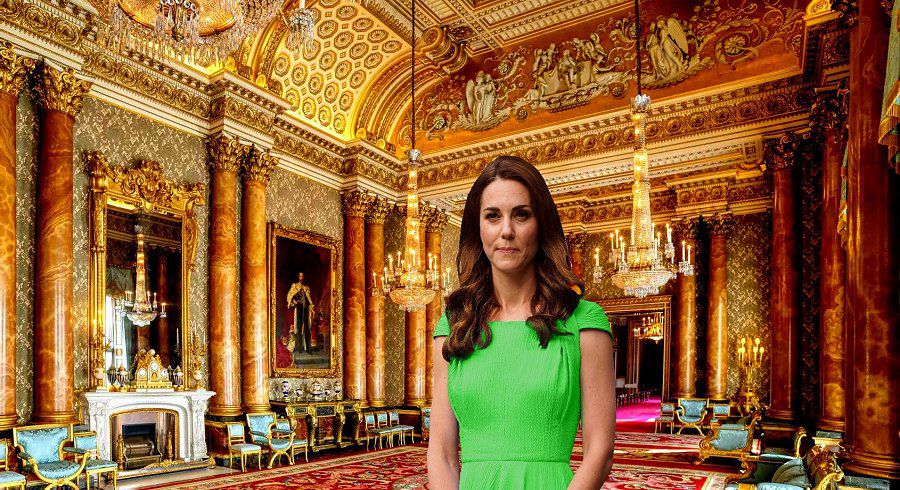 Kate Middleton's state of health is causing concern. The Duchess was admitted to the London Clinic, a private clinic in London, for a successful abdominal procedure on Tuesday, January 16, 2024. Kate Middleton's state of health is causing concern. The Duchess was admitted to the London Clinic, a private clinic in London, for a successful abdominal procedure on Tuesday, January 16, 2024.
According to the Kensington's announcement on Wednesday, January 17, she will remain in the hospital for at least 10 days and will not will resume its activities only after the Easter holidays.
This news caused general concern even if the Palace assured that the intervention had gone well. However, Prince William's wife's prolonged recovery has sparked speculation in the media. To dispel any rumors, the “Guardian” clarified that the Palace categorically denied any link with cancer, without providing further details. The decision was made to only communicate when significant information was available.
Surrounded by her loved ones, the princess is recovering with the support of William, who canceled his commitments to be by her side. His parents, Carole and Michael Middleton, as well as his brother and sister, Pippa Matthews and James Middleton, will assist him in his recovery at the royal couple's home in Windsor.
In a statement released Wednesday, the Palace relayed the princess's words, expressing its eagerness to return to work and apologizing for canceled engagements.
Since the surprise announcement of Kate Middleton's hospitalization, messages of support have been pouring in from around the world. Under Kensington Palace's Instagram post revealing the surgery, more than 25,000 people, both anonymous and famous, wished him a "good recovery."
However, Prince Harry and Meghan Markle did not bother to send a message, either publicly or in a more personal way, according to the English press. Maybe too busy living their own fairy tale elsewhere ! |
|
|
|
| Mia Kennedy for DayNewsWorld |
 |
EMERGENCY MEETING OF ANDEAN COUNTRIES
FACING THE SECURITY CRISIS AND TERROR
IN ECUADOR | 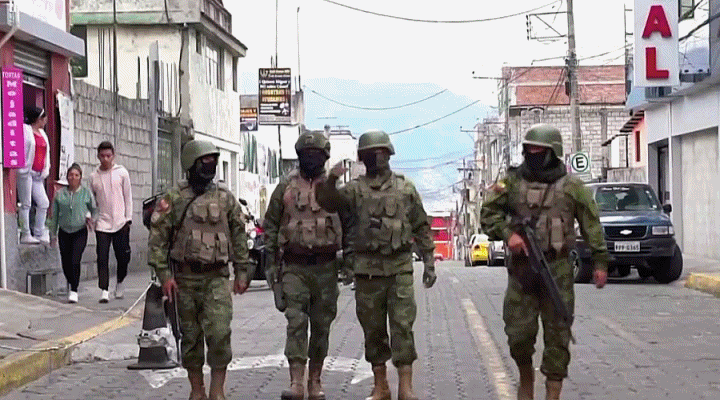
On January 9, a new threshold of terror was crossed in Ecuador with the assault live on public television TC by heavily armed and hooded men. These attackers briefly took journalists and channel employees hostage before the police intervened, freeing the hostages and arresting 13 attackers. Eight days later, anti-mafia prosecutor Cesar Suarez, responsible for investigating this spectacular attack, was assassinated in broad daylight in the center of Guayaquil.
An attempted assault on a hospital: 68 arrests
Faced with this escalation of violence, President Daniel Noboa declared a state of emergency and described the country as having an "internal war" against gangs, calling them "terrorists". More than 20,000 soldiers have been deployed on the ground. On Sunday, new violent incidents broke out in Guayas, in the southwest.
In response to this critical situation, Ecuadorian police made 68 arrests during an attempted assault on a hospital in Yaguachi, Guayas province. These alleged members of a criminal organization planned to take control of the installations to protect one of their own, injured and hospitalized in the morning. Law enforcement also seized guns and drugs, uncovering a clandestine rehabilitation center where members of the organization were hiding.
This intervention takes place in the context of a recent general insurrection by many drug trafficking criminals following the escape of the main gang leader from an Ecuadorian prison. The authorities also closed several clandestine rehabilitation centers, presented as hospitals, but run by gangs without adequate medical equipment. On Sunday, around 10 tons of drugs were seized near the town of Vinces, in the province of Los Rios, by the army.
Seizure of guns and drugs
At the same time, the police made a seizure of firearms and drugs, uncovering a clandestine “re-education center” where suspected members of the organization were hiding, according to information provided by the authorities. These illegal centers have been the subject of recent closures by the authorities, mainly establishments presented as clandestine hospitals run by gangs. According to the authorities, these structures are not equipped with the medical devices necessary to ensure adequate care for patients.
Furthermore, on Sunday, in the province of Los Rios, near the town of Vinces, the army reported the seizure of around 10 tons of drugs. This action strengthens the authorities' efforts to counter drug trafficking and dismantle criminal networks operating in the western region of Ecuador.
“Andean Security Network”
On January 21, an emergency meeting was held in Lima, the capital of Peru, bringing together member countries of the Andean Community of Nations (CAN), to discuss the critical situation in Ecuador. The country is currently undermined by violence linked to drug trafficking, generating unprecedented chaos and security crisis. Neighboring countries members of the Andean Community have expressed concern about this rapid deterioration of the situation in Ecuador.
These nations, namely Colombia, Peru, Bolivia and Ecuador, are uniting to define concerted actions against the proliferation and expansion of gangs involved in drug trafficking and racketeering. The international ramifications of these criminal groups have put border areas on alert, requiring a coordinated response.
The head of the Peruvian government, Alberto Otarola, underlines the imperative for concerted action in the face of this reality, affirming that no country is truly safe if its neighbor is under the senseless assault of these groups. The meeting, convened by the Bolivian rotating presidency, was an opportunity to strengthen regional cooperation to counter this growing threat.
At the end of the summit, the Ministers of Foreign Affairs, Interior and Defense of Colombia, Peru, Bolivia and Ecuador announced the creation of the first "Andean Security Network" against organized crime. This network will provide a 24/7 operational service, enabling the exchange of information between member countries on the activity of criminal groups operating transnationally.
Twenty gangs rule the roost
The expansion of gangs involved in drug trafficking and racketeering in Ecuador has sparked alarm at the borders, prompting Peru and Colombia to strengthen their controls, fearing the arrival of criminals fleeing growing repression in Ecuador.
Despite its reputation as a relatively safe country, Ecuador has experienced an escalation of violence over the past five years, accentuated by an economic slowdown and deterioration following the Covid-19 pandemic. The homicide rate has exploded, going from 6 to 46 per 100,000 inhabitants in 2023.
Historically protected from violence linked to drug trafficking, Ecuador, located between Colombia and Peru, the two main world producers of cocaine, is now an operational and logistics center for shipping this drug to Europe.
Around twenty gangs, sometimes acting from prisons, exercise worrying control over the situation.
In a report published in 2022, the Inter-American Commission on Human Rights (IACHR) highlighted the “significant internal control” exercised by the head of Los Choneros over the prison. She also noted that the latter, as well as Junior Roldan, another leader of the gang killed last year in Colombia, benefited from “differential and preferential treatment from the authorities”.
|
|
|
|
| Jenny Chase for DayNewsWorld |
 |
WHY NATO LAUNCHES
OPERATION "STEADFAST DEFENDER"
THE MOST IMPORTANT SINCE THE COLD WAR | 
What if NATO was no longer “brain dead” as Emmanuel Macron judged? Some 90,000 NATO soldiers will participate for several months starting next week in the largest military exercise organized by the Atlantic Alliance since the Cold War, against the backdrop of the conflict in Ukraine. “This will be a clear demonstration of our unity, our strength and our determination to protect each other,” declared Thursday, January 18, the Supreme Allied Commander in Europe (Saceur), American General Christopher Cavoli , during a press conference in Brussels, where NATO is headquartered.
A necessity"
The operation is not a luxury, but a “necessity”. After two days of deliberations, the military committee of the North Atlantic Treaty Organization (NATO) officially launched the start of “Steadfast Defender” this Thursday, January 18. Described as the Alliance's largest military exercise since the Cold War, the exercise will run from next week until May.
According to Admiral Rob Bauer, head of NATO's military committee, the operation will bring together around 90,000 soldiers from 31 allied countries as well as Sweden. No less than 50 warships, 80 aircraft and 1,100 combat vehicles will participate in this gigantic “war game”. A “record” figure in terms of soldiers, as highlighted by the head of the committee, bringing together the chiefs of staff of the armies of the 31 member countries of the organization.
“This is a record in terms of the number of soldiers,” reiterated Dutch Admiral Rob Bauer during the press conference, emphasizing the need to prepare for all eventualities in an era where “anything can happen at any time." He added that “the tectonic plates of power are shifting.”
These maneuvers will encompass the Atlantic area up to the eastern flank of NATO, according to the same press conference. They will adopt the form of a conflict scenario against an “adversary of comparable size”, according to the terminology of the Atlantic Alliance. Like the year 2021, they will involve the reinforcement of troops "from North America" on the European continent.
The objective of this large-scale exercise, the most imposing since Operation Reforger in 1988 in the middle of the Cold War, has been declined.
“The security environment has become demanding,”
The joint NATO military exercise aims to improve the Allies' capabilities "to move quickly across the Atlantic and Europe to protect each other when necessary", explains Admiral Rob Bauer. The aim is to ensure that forces are trained, able to collaborate and ready to respond to any threat, regardless of where it comes from.
This coalition is of crucial importance at a time when "the security environment has become demanding", implicitly referring to Russia and its intervention in Ukraine. The conflict in Ukraine has demonstrated that, when it comes to security, “locality does not exist”. “All security is connected,” underlines Admiral Rob Bauer during the press conference.
A clear message
Beyond the technical aspects, the military committee seeks to convey a clear message with this operation called “Unshakeable Defender”. US General Christopher Cavoli, head of Allied Forces in Europe, insists the exercise will be a clear demonstration of the Alliance's unity, strength and determination to protect each other. Grant Shapps estimated that NATO faced "greater than ever" challenges from Russia, China, Iran and North Korea, warning that the Alliance's adversaries were “more connected to each other” than ever.
On the British side, 20,000 military personnel will participate in this exercise, highlighting the extent of the Allies' commitment to this initiative aimed at strengthening cohesion and preparation to face contemporary challenges. Units from the Royal Air Force, the Royal Navy and the army will be sent throughout Europe and beyond for this exercise called “Steadfast Defender”, London explained.
kyiv demands more resources
On the ground in Ukraine, Dutch Admiral Rob Bauer noted that the Russian navy and air force remained “considerable” forces. “Intense fighting” still takes place. “Last year, the world was perhaps a little too optimistic and it is therefore “important that in 2024 we are not too pessimistic,” said this senior Alliance official. The front line between the Russian and Ukrainian armies have remained largely unchanged in recent months, prompting Kiev to insistently request reinforcements in weapons and ammunition to envisage a significant breakthrough.
Ukraine particularly expresses the increased need for anti-aircraft defense means, while its infrastructure and cities are subject to daily bombardments. However, American military aid of more than 60 billion dollars is blocked in Congress due to resistance from Republican elected officials, while a European financial contribution of 50 billion euros over four years faces a veto from Hungary. A possible outcome could emerge during the summit of the Twenty-Seven scheduled for February 1 in Brussels.
Since the start of the Russian assault in Ukraine in February 2022, the Atlantic Alliance has strengthened its defenses on the eastern flank by deploying thousands of men. NATO seeks to send a message of deterrence, aiming to convince the Kremlin that its engagement in Ukraine will have significant consequences.
This Russian attempt to weaken NATO and the EU has, on the contrary, strengthened their determination. For the Baltic states, NATO represents the only guarantee of protection, and their membership is considered their best security insurance, according to the liberal newspaper The Economist. NATO has positioned multinational battalions in the Baltic states to delay any aggressive advance in the event of an invasion.
So far, Russia has not dared to challenge the Alliance, which remains more vigilant than ever since the start of the war in Ukraine.
|
|
|
|
| Garett Skyport for DayNewsWorld |
 |
IRAN/PAKISTAN CONFLICT IN
IN RECIPROCAL ATTACKS | 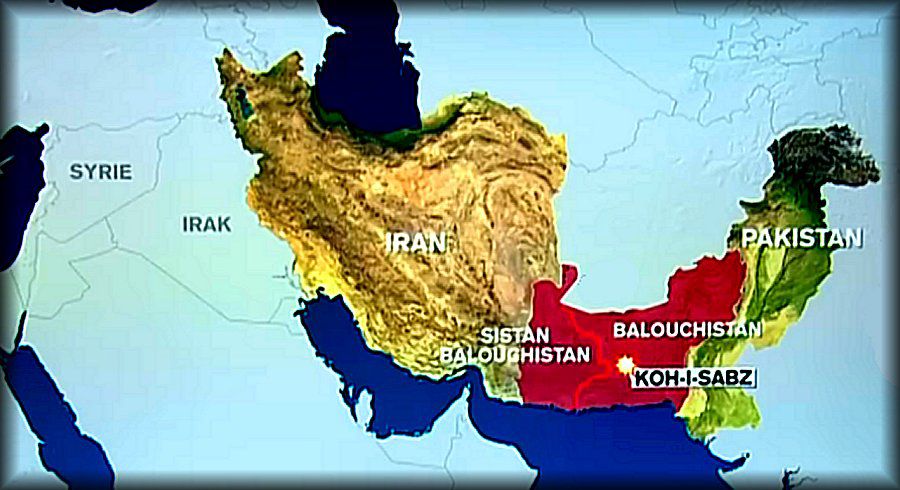
Tension is rising between Iran and Pakistan.
The terrorist organization Jaish al-Adl
It did not take long for Islamabad to respond. Less than 48 hours after Iranian bombings in its western province of Balochistan, Pakistan struck the Iranian region of Balochistan-and-Sistan, near its border, on the morning of January 18. The operation resembles that carried out by Tehran. Iran declared on Tuesday that it had launched missiles against the bases of Jaish al-Adl, a Sunni armed group which is fighting for the independence of Baluchistan but has links with international jihadism, and has committed several attacks on its soil.
In response, the Pakistani Foreign Ministry indicated that its armed forces carried out "a series of surgical and coordinated military strikes against terrorist hideouts" in Iran, which left nine people dead, according to Iranian public television. friction between the two neighbors, at a time when, a little further to the west, the region is already under high tension due to the war between Israel and Hamas.
Iran intervenes against the terrorist organization Jaish al-Adl, whose headquarters is in Pakistan. Iran has attacked bases in the past, and even sent commandos a few months ago to catch leaders.
A delicate internal situation
Pakistan finds itself in a delicate domestic situation, with crucial snap parliamentary elections scheduled for February 8. A political maneuver within Parliament barred former Prime Minister Imran Khan, currently in detention, from participating in these elections. Imran Khan, Pakistan's most popular figure, is thus excluded from the electoral process. Faced with this, the provisionally ruling coalition, led by Prime Minister Anwaar-ul-Haq Kakar, decided that it was imperative to fight back.
Less than a month before the elections, the coalition aspired to wash away the affront. This border region between Afghanistan, Pakistan and Iran is notoriously difficult to access and characterized by precarious security. It is a place of passage for contraband, particularly drug traffickers, with clashes already documented in the past, allowing various organizations to establish themselves in the villages.
The West, China and Russia
For the first time, the West, China and Russia reacted. “They are a source of great concern, because they violate the sovereignty and territorial integrity of countries,” said Peter Stano, spokesperson for European diplomacy. Russia called on both countries to exercise "utmost restraint", while China said it "hopes that both sides can demonstrate calm". China has announced its intention to contribute to a resolution of the situation. With its influence in Pakistan, despite the latter's proximity to the United States, China also maintains excellent relations with Iran.
This initiative represents a new dynamic, where global powers are getting involved to ease tensions in a complex and volatile region.
|
|
|
|
| Jenny Chase for DayNewsWorld |
 |
ALAIN DELON CASE
WHO IS ANOUCHKA’S HUSBAND ? |
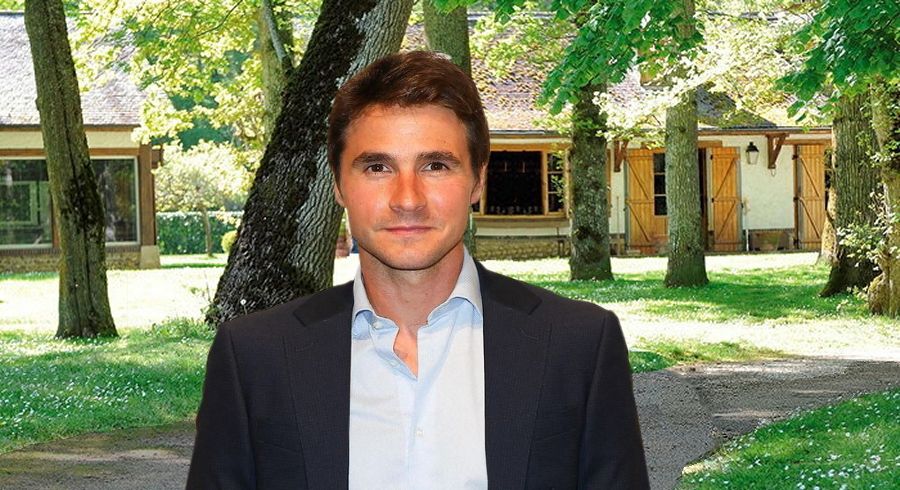 In the epic saga that pits Anouchka, the formidable sister-in-law, against her brothers-in-law, Julien Dereims finds himself in a battle from which he would prefer to be far away. In the epic saga that pits Anouchka, the formidable sister-in-law, against her brothers-in-law, Julien Dereims finds himself in a battle from which he would prefer to be far away.
While the siblings engage in a media war worthy of Game of Thrones, the estranged members of the Delon clan adopt a policy of silence. Anthony's daughters, Liv and Loup, as well as their mother Sophie Clerico, nevertheless continue their regular visits to Alain Delon in his refuge in Douchy (in the Loiret). For his part, Julien Dereims, Anouchka's husband, is also a master of abstention, avoiding any comment on the burlesque show pitting his wife against his brothers-in-law.
Alain-Fabien Delon spoke about his brother-in-law and his behavior in this family comedy. Discussing Anouchka's whirlwind visits to Douchy, the youngest of the Delons revealed: “She has an entire house on the property, where her husband has never spent a night since the start of this circus. She just makes appearances. » Alain-Fabien added with a dramatic sigh: “Monday morning, she arrived, hung around for five minutes, while her husband waited in the car. The day before yesterday, same scenario, and two days before too.
She comes, says "I love you, daddy", then returns to her Swiss castle. » When he speaks of "Swiss castle", he refers to the fact that Anouchka lives in Switzerland with her husband and their 4-year-old little prince, Lino. The 33-year-old actress is apparently trying by all means to bring her father back to Switzerland, a land where he lived for a long time and was treated after his stroke in 2019.
Although he prefers to stay in the background, Julien Dereims still released a little pearl of humor in a well-felt comment to his brother-in-law Anthony on Instagram, on January 5: “And fortunately you removed the quicklime and the shovel from your trunk!!!! Come on… #shameatoi,” he wrote in the caption of a publication repeating Anthony Delon’s accusations against Anouchka. Since then, Julien Dereims has mysteriously closed his Instagram account to the public.
Speaking of love and comedy, Anouchka and Julien are now celebrating over ten years of romance. The two actors met in 2010 on the benches of the Simon course in Paris. The one who grew up in Cannes then made his debut on the stage with pieces like “Panik” (2012) and “Libres sont les fleurs” (2017). He even shared the stage with his legendary father-in-law Alain Delon and his wife in the play “An Ordinary Day” in 2011.
Julien Dereims has also made cinematic appearances in films such as “Au bout du conte” (2012), with Agnès Jaoui and Jean-Pierre Bacri, “3 Days to Kill” (2014), “Toute resemblance” (2018, under the direction of Michel Denisot), or even “Hi, how are you? » in 2021. On television, he made a brief appearance in the series “Versailles” in 2015.
Julien Dereims built his with Anouchka, their son Lino and their faithful corgi, who accompanies them on their adventures in Switzerland, New York, Turkey, Italy...
|
|
| Kate White for DayNewsWorld |
 |
EUROPEAN ELECTIONS A CLEAR PROGRESSION OF THE EXTREME RIGHT | 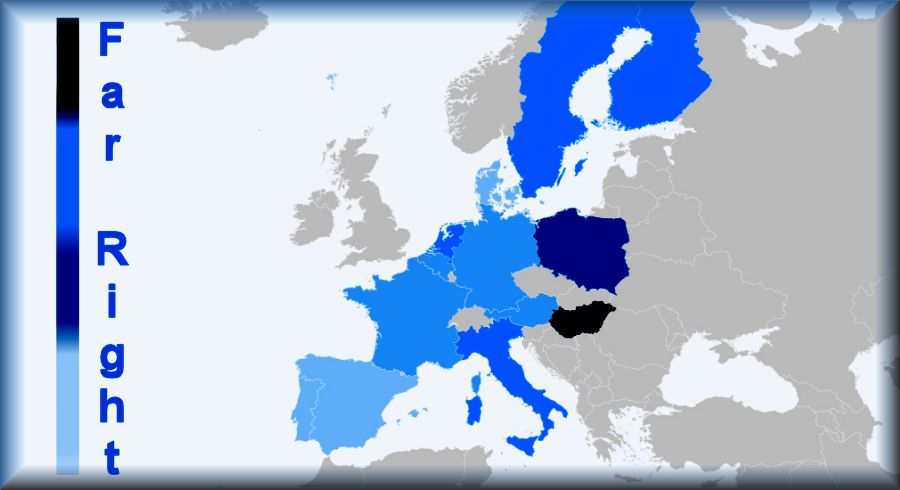
Political trends within the European Union (EU) reveal a resizing of forces, with the radical right groups Identity and Democracy (ID) and European Conservatives and Reformists (CRE) emerging respectively in third and fourth position in intentions voting. This dynamic is taking hold despite the decline of the Italian Brothers of Italy (CRE) party led by Giorgia Meloni, to the benefit of the left in Italy.
The latest projections consolidate the position of the ID group as the third political force within EU member states, with 12.5% of voting intentions and 93 seats. Notably, the ID group dominates in France with the National Rally (RN) of Marine Le Pen, in the Netherlands with the Party for Freedom (PVV) of Geert Wilders, and in Austria with the Freedom Party (FPÖ). This rise in power transformed the political landscape of the Union, displacing the Italian League from its preeminent position.
Blocking majority
France, Germany and the Netherlands now emerge as the largest national parties, overtaking the Italian League with 27, 21 and 12 seats respectively, relegating the latter to just 8 MEPs. This redistribution of seats underlines the need for political groups to adapt to this new reality.
The possibility of a blocking majority on the right, bringing together ID, CRE, the European People's Party (EPP) and Viktor Orbán's Fidesz, could reach more than 367 seats. Iratxe García Pérez, president of the Socialists & Democrats (S&D) group in the European Parliament, criticizes the EPP for what she calls the "normalization" of the far right, highlighting the implications for EU citizens.
Changing political alliances after the elections are becoming a key focus, with EPP general secretary Thanasis Bakolass considering a pro-EU coalition with the Socialists, Greens and Liberals, emphasizing the need for environmental policies pragmatic.
The socialists hold on
In this context, the S&D group maintains its position by gaining an additional seat, now totaling 143 seats. The socialists remain in the lead in Sweden, Lithuania, Romania and Belgium. Rumors surrounding the possible appointment of European Commissioner Nicolas Schmit as head of the EU socialist list are raising questions, which could have repercussions on figures such as Marc Angel.
The EPP loses a seat
The EPP loses one seat, reaching 178, but retains its leadership in nine member states: Greece, Bulgaria, Latvia, Finland, Poland, Germany, Slovenia, Croatia and Spain.
The Left group saw its representation decline to 37 seats, recording notable victories in Cyprus and Ireland. The Greens/EFA continue their decline with 50 seats, a drop of 24 compared to 2019, reflecting the dynamic changes within the European political arena.
In France Jordan Bardella , young rising star of the far right
“The deadline for the European elections promises to be difficult for the presidential majority,” declared Jordan Bardella, president of the National Rally (Identity and Democracy, ID), during his greetings to the press on January 15. Recent polls in France attribute more than 28% of voting intentions to the RN, relegating the Renaissance coalition (Renew Europe) from the presidential majority to around 18%.
The list led by Marion Maréchal, niece of Marine Le Pen, displays a credibility of 5 to 8% of voting intentions, a significant score since 5% is enough to send a candidate to the European Parliament. The RN and its sovereignist allies, advocating a "Europe of cooperation between nations", oppose the supporters of a more integrated Europe among the liberals, socialists, ecologists and part of the EPP.
The RN's program emphasizes the need to "restore voice to France in Europe", in the face of what they consider to be a "real federalist coup d'état currently being prepared". Jordan Bardella says he is ready to lead a “civilizational fight” in this perspective.
The appointment of Mr. Attal as Prime Minister aims to breathe new impetus into Mr. Macron's second five-year term, just a few months before a European election which should largely favor the National Rally (RN), with a lead of 10 points according to the latest polls in relation to the Renaissance coalition. The young prime minister is hailed as "telegenic, fluid and pugnacious" in the face of Jordan Bardella, the young rising star of the French political extreme right, says Mr. Rahman.
Faced with the clear rise in voting intentions for the far-right, it is not surprising that Emmanuel Macron played his joker Gabriel Attal to counter Jordan Bardella...
Although the appointment of Mr. Attal could temporarily influence With polls favoring the government, Gallard predicts this is unlikely to last until the eve of the election, which is scheduled for June 6-9, 2024. |
|
|
|
| Alize Marion for DayNewsWorld |
 |
FIFTY YEARS OF KATE MOSS
PARTY IN AN UNFORGETTABLE MOMENT | 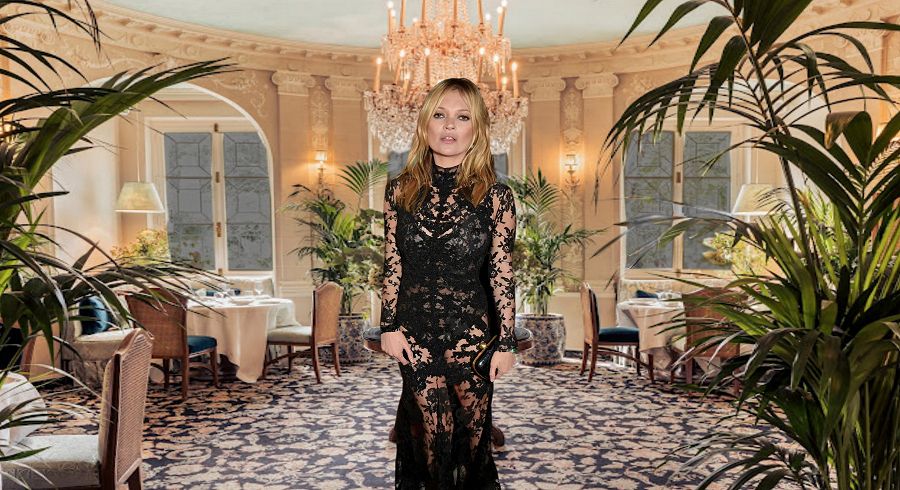
Twig Kate Moss celebrates her 50th birthday.
To fully participate in this celebration, Kate Moss's daughter, Lila, living in London, took a flight to Paris to accompany her mother.
During the day, she left him a warm birthday message on her Instagram account. Also present on her arm for the evening, her companion Nikolai Von Bismarck, aged 37, with whom she shares her life.
The duo was photographed leaving the famous Parisian Ritz hotel, heading towards the 8th arrondissement to join the “Laurent” restaurant, the venue of the evening. In addition to her partner and her daughter, Kate Moss was able to count on the presence of her friends Charlotte Tilbury and Stella McCartney.
Naomi Campbell, eager to celebrate Kate Moss' birthday, shared two Instagram posts capturing moments from their life together. She accompanies this carousel of images with a tender declaration: “Happy 50th birthday, little Wagon! I'm proud to welcome you into your fabulous 50s!
You are my chosen family and I cherish our decades of brotherhood. We had more unforgettable moments than I can remember, LOL! (...) Enjoy your special day! And may God grant you tons of blessings. » She completes this first publication with another photo: the cover of the magazine “Interview” shared in December 2012.
This grandiose celebration, estimated at a cost of 130,000 euros, took place at the starred restaurant Laurent, located at 41 avenue Gabriel in Paris. Kate Moss arrived in a transparent dress, on the arm of her companion Nikolai Von Bismarck, with whom she has had a relationship since 2015.
The other guests quickly followed, getting out of their cars one by one. Among the guests who came to celebrate Brindille's 50th anniversary, we saw designer Stella McCartney, designer Haider Ackermann, makeup mogul Charlotte Tilbury, former editor-in-chief of British Vogue Edward Enninful and of course, the daughter of the model, Lila Moss. They were then joined by Venus Williams, arriving straight from the Louis Vuitton Men's show.
The evening was transformed into an unforgettable event where fashion, friendship and family intertwined to celebrate the exceptional life and career of Kate Moss.
|
|
|
|
| Kate White for DayNewsWorld |
 |
HOUTHI ATTACKS IN THE RED SEA
AN EXTENSION OF THE CONFLICT
ISRAELO - PALESTINIAN ? | 
Since the start of the war on October 7, 2023 between Israel and Hamas, the Houthis, who control a large part of Yemen, have increased attacks in the Red Sea in order to slow down international maritime traffic there, claiming to act in solidarity with the Palestinians in Gaza. Proclaiming solidarity with the Palestinian people, the Houthis launched a series of attacks against commercial ships in the Red Sea, which borders Yemen.
The most spectacular attack took place on November 19, 2023, when fighters used a helicopter to kidnap the crew of a car transporter linked to an Israeli businessman. Media attention will focus on the Houthis who, buoyed by their success, will multiply their declarations: their spokesperson, Yahya Sarea, will publish numerous press releases on social networks warning the powers “linked to the Zionist entity” ( sic) of the risk now incurred by their ships cruising in the Red Sea
Although most Houthi attacks on the Red Sea have not been successful, they have forced thousands of ships to bypass this route and head towards South Africa, resulting in costs and considerable delays for maritime transport.
Israel's first ally, the United States, set up an international coalition in December to protect maritime traffic in this strategic area where 12% of world trade passes. Grouped under the banner of Operation Prosperity Guardian and under American command are the United Kingdom, Australia, Canada, France, Italy, Greece, the Netherlands, Norway, Spain, Seychelles and Bahrain [38].
With the exception of the latter, the Arab countries, or at least the countries bordering the Red Sea such as Egypt and Saudi Arabia, are among the notable absentees from this naval coalition, testifying to the reluctance of the countries of the region to take part in American military operations against an ally of Iran, moreover in the context of clashes initially triggered in retaliation for Israeli operations in the Gaza Strip.
Seizure of Iranian-made missile parts
The US military said Tuesday it had seized Iranian-made missile parts destined for Houthi rebels from a boat in the Arabian Sea, the first such seizure since the Houthis began attacks on commercial ships.
“This is the first seizure of lethal advanced conventional weapons (ACW) supplied by Iran to the Houthis since the Houthis began attacks on merchant ships in November 2023,” the Joint Chiefs of Staff said. US Army in a statement.
This operation, carried out on January 11, made it possible to seize weapons including “components of ballistic missiles and cruise missiles,” the press release said.
The missile parts were seized aboard a dhow, a traditional Arab sailboat, operated by a crew of 14 people. The boat was sunk, the US Army General Staff said.
This text also indicates that two American navy soldiers, missing off the Somali coast since Thursday evening, had taken part in the operation. They are two members of the Navy Seals, an elite commando force. “Intensive searches” are still underway to locate them, said Michael Kurilla, head of the American military command for the Middle East, Central and South Asia (Centcom).
The two sailors were on a mission with the United States 5th Fleet which operates in a wide area including the Persian Gulf, the Red Sea, the Gulf of Oman and parts of the Indian Ocean. Its headquarters is located in Manama, Bahrain.
Rebels' "largest attack" foiled last night
The US military announced that 18 drones and three missiles fired by the Houthis were shot down on Tuesday evening in a “complex” attack
This is, according to the British and American forces, “the largest attack” by the Houthis to date. It would also be the 26th carried out by Yemeni rebels targeting commercial maritime traffic in the Red Sea since mid-January.
“During the night” from Tuesday to Wednesday, the British ship HMS Diamond with American warships “successfully repelled (…) the Houthis supported by Iran”, wrote Minister Grant Shapps on the social network ex-Twitter). The US military had hours earlier said that 18 drones and three missiles fired by the Houthis had been shot down, as part of a "complex" attack.
Earlier, the US military's Middle East Command (Centcom) said the Houthis had "launched a complex Iranian-designed attack in the southern Red Sea using drones, anti-ship cruise missiles and an anti-ship ballistic missile.
The British Defense Minister announced Tuesday evening that another frigate, the HMS Richmond, was on its way to the Red Sea to counter “attacks” by the Houthis. That of Tuesday evening took place while the head of American diplomacy Antony Blinken is in Israel as part of a regional tour aimed, among other things, at preventing the war between Israel and Hamas from spreading.
Who are the Houthis?
The Houthis, also known as Ansar Allah (or "followers of God"), are a military group that currently exercises de facto control over most of northern Yemen. Formed in the 1990s, the militia is named after its founder, Hussein Badreddin al-Houthi, and follows the Zaidi branch of Shiite Islam, which makes up 20 to 30 percent of Yemen's population.
Today they control parts of northern Yemen. The turning point for the Houthi movement probably originated in the American invasion of Iraq in 2003. Inspired by the success of Hezbollah fighters, based in Lebanon and who Valiantly confronting Western forces in Iraq, the Houthis drew inspiration and support from the Lebanese group, as well as Iran, although their officials categorically deny such links.
But how did the Houthis manage to take power?
They were among the main protesters of Yemen's central government led by President A. Saleh. Faced with their growing power, Saleh launched a military campaign in 2003, supported by Saudi Arabia. Despite the apparent success of Saleh's forces in eliminating Houthi leader Hussein al-Houthi in 2004, they have repeatedly inflicted setbacks on Saleh and the Saudi army, despite billions of dollars spent by the latter.
The Yemeni civil war, which began in 2014, has seen incessant battles between the Houthis and the internationally-backed government. Since the 2011 revolution, the Houthis have struggled to oust Saleh from power, even forming an alliance with him in 2015.
However, when this alliance fell apart, the Houthis emerged as the dominant power, culminating in Saleh's assassination in December 2017.
The Houthis have also played a major role in Yemen's ongoing civil war, resulting in approximately 377,000 deaths, including many civilians. Although the southern government is internationally recognized, the Houthis have conquered much of the north of the country since seizing Sanaa in 2014. Their hold extends to the strategic port of Hudeidah, a crucial source of revenue generating up to 1 billion dollars for the Houthi government.
Access to the Red Sea?
Currently, the Houthis, numbering around 20,000 fighters, are led primarily by al-Houthi's brother, Abdul-Malik al-Houthi. He clearly announced that he would not hesitate to attack the United States and its allies. Since the Gaza war began in October, the Houthis have attempted to exploit the conflict to demonstrate their power and raise their international status.
In response to multiple attacks in the Red Sea, the United States and the United Kingdom launched their largest offensive against the Houthis since 2016. At that time, the United States struck three Houthi missile sites in response to attacks against American warships and commercial ships. This action temporarily stopped the Houthi attacks. Today, convinced of having triumphed against the Saudis and the West in Yemen, the rebels seem more determined than ever to openly defy the United States.
“The effectiveness of the naval coalition under American command and its ability to remain in a purely defensive posture will therefore prove decisive both in its success and in defusing a potential regional security escalation,” according to a specialist.
|
|
|
|
| Joanne Courbet for DayNewsWorld |
 |
MISS AMERICA 2024
MADISON MARSH HAVARD AND US AIR FORCE
|
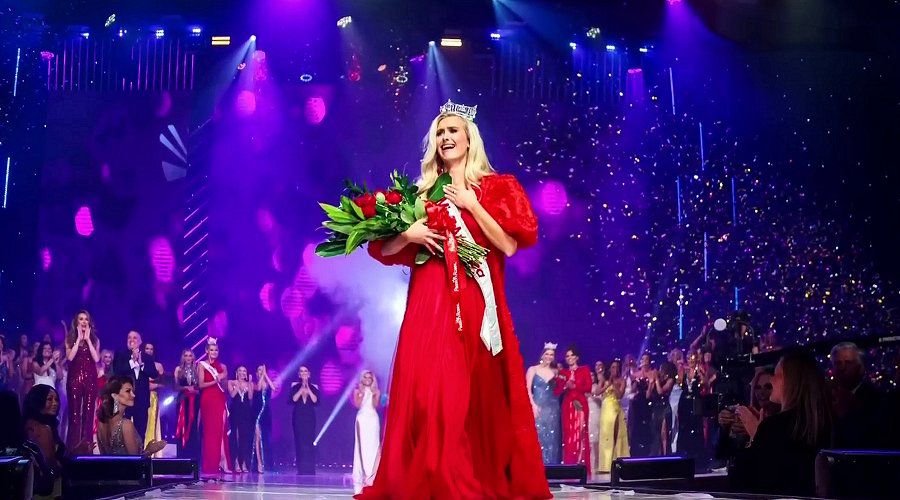 Madison Marsh, 22, a second lieutenant in the United States Air Force and student at Harvard, won the title of Miss America 2024 this Sunday, making history by becoming the first active duty officer in the US Air Force to win the crown of this prestigious competition. Madison Marsh, 22, a second lieutenant in the United States Air Force and student at Harvard, won the title of Miss America 2024 this Sunday, making history by becoming the first active duty officer in the US Air Force to win the crown of this prestigious competition.
The Colorado representative shared an inspiring message in an Instagram interview, saying,
"You can achieve anything. There are no limits, and the only person stopping you is you."
This victory marks a significant moment for Madison Marsh, who succeeds Grace Stanke of Wisconsin, Miss America 2023.
The US Air Force celebrated this exceptional achievement of the pilot, who received her license at the age of 16, with a enthusiastic message on X (formerly Twitter).
In parallel with her military commitments, Madison Marsh continues her studies at Harvard, where she has just concluded innovative research on the use of artificial intelligence in the detection of pancreatic cancers.
An impressive demonstration of his varied skills and commitment to the advancement of science and society.
Beauty combined with intellectual competence.
|
|
|
|
| Kate White for DayNewsWorld |
 |
NEW PRESIDENT LAI CHING’S BET TO PROTECT THE STATUS QUO IN TAIWAN WHILE CALLING FOR DIALOGUE WITH CHINA | 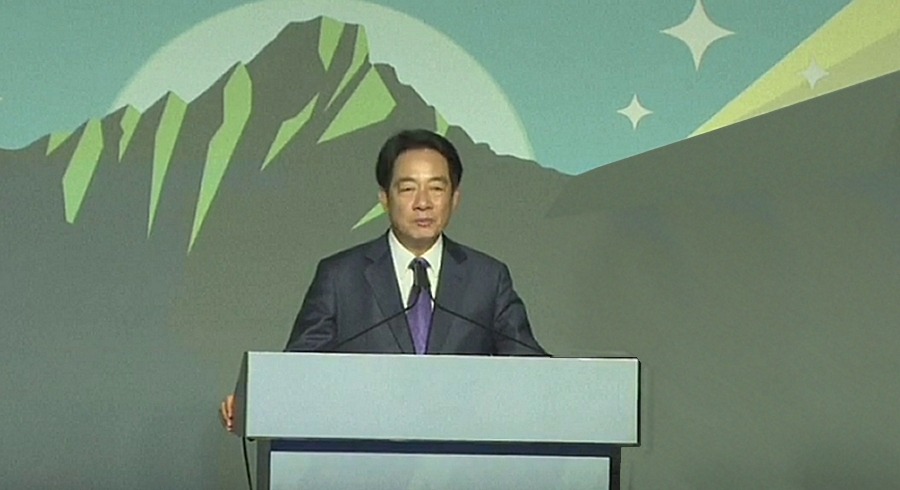 With just over 40% of the votes cast, Lai Ching-te won Taiwan's presidential elections last Saturday. This result marks his victory over his main opponent, Hou Yu-ih, aged 66, who advocated rapprochement with Beijing. Succeeding Tsai Ing-wen in May, Lai Ching-te served as vice president for several years under her predecessor. With just over 40% of the votes cast, Lai Ching-te won Taiwan's presidential elections last Saturday. This result marks his victory over his main opponent, Hou Yu-ih, aged 66, who advocated rapprochement with Beijing. Succeeding Tsai Ing-wen in May, Lai Ching-te served as vice president for several years under her predecessor.
As a Democratic Progressive Party (DPP) candidate, Lai Ching-te expressed gratitude to his voters for "successfully resisting the efforts of external forces to influence this election." Facing his jubilant supporters displaying red and green flags, he stressed his determination to protect Taiwan against constant threats and intimidation emanating from China.
Lai Ching-te said: “We choose to be on the side of democracy.” However, despite her victory, her score was significantly lower than the 57% obtained by her predecessor, Tsai Ing-wen, four years earlier. Furthermore, although the PDP retains presidential power, the party loses its parliamentary majority with only 51 seats in the legislative yuan, the lower house, compared to the 52 seats won by the Kouomintang, favorable to a rapprochement with China, and 8 seats for a third political force, the Taiwan People's Party.
The delicate question of relations with communist China constituted the starting point of Lai Ching-te's political career. His entry onto the political scene dates back to the third crisis in the Strait in 1995-1996, when Beijing, demonstrating its military power by launching missiles, incited this doctor and activist from Tainan, a city located in the southwest of the island, to enter the electoral race.
At this time, Taiwan was preparing for its first elections, and Lai Ching-te expressed his commitment to Taiwanese democracy, declaring in an op-ed published last year in the "Wall Street Journal": "I have decided that I had a duty to participate in Taiwan's democracy and help protect this nascent experiment from those who wished it harm. »
In favor of the status quo
This 64-year-old man, a Harvard medical graduate, entered politics in the 1990s, faced with Chinese military pressure, while Taiwan was gradually opening up to democracy. After having been a deputy then mayor, he rose to the post of Prime Minister under Tsai Ing-wen in 2016. At that time, he uttered words in front of Parliament which attracted the antipathy of Beijing: “I am a pragmatic worker for the “independence,” he then asserted. These words, far from being clumsy, reflect his deep thoughts, a position from which he has never deviated: “I will never deviate from this position, whatever the position I occupy. »
Although his statements appear to have taken a more moderate tone over time, Lai Ching-te pledged during the election campaign “unwavering” support for maintaining the status quo across the Taiwan Strait. In other words, neither independence nor attachment to China.
These assertions reflect “a fairly measured position, promising that there would be no unpleasant surprises”, according to Mathieu Duchâtel, director of the Asia program at the Institut Montaigne. However, despite these assurances, persistent doubts remain on China's side about its true beliefs, perceiving it as favorable to independence, underlines the researcher. Although Lai Ching-te has considerably moderated his positions and insisted on his will to maintain the status quo, his past statements continue to haunt his reputation, exploited by China to denounce the supposed "deep" danger represented by the president elected on Saturday in Taiwan.
Caution in the United States
Never has the Chinese regime exerted so much pressure to influence the results of elections in this South East Asian democracy in its favor: naval and air maneuvers, satellite and observation balloons, massive disinformation campaigns, threats of economic sanctions. In recent days, five Chinese balloons had crossed the median line of the strait on Thursday, according to the Taiwanese Ministry of Defense, which had also spotted ten planes and six warships.
Reunification is historically inevitable, assured Xi Jinping during his New Year's greetings. The People's Liberation Army will crush any desire for independence, a spokesperson for the Chinese Ministry of Defense promised again yesterday.
A few hours after the publication of the results of the Taiwanese presidential election, marked by the victory of Lai Ching-te, a candidate criticized by Beijing because of his alleged pro-independence positions, China's reaction was not as scathing as anticipated .
The country made clear that it would not tolerate any "separatist activity" on the island, adding that the vote would not change the "inevitable trend" of reunification with China, according to a spokesperson for the office in charge. relations with Taiwan. These statements correspond to the deep rejection that this man arouses within the Chinese Communist Party, for which "reunification", whether through negotiation or by force, remains a fundamental objective.
In addition, China issued a categorical warning on Saturday, saying it would "firmly" oppose any "foreign interference." This warning is clearly addressed to the United States, Taiwan's ally, which has promised to support it in the event of an invasion. |
|
|
|
| Andrew Preston for DayNewsWorld |
 |
ECUADOR IN STATE OF EMERGENCY AFTER GANG LEADER FITO’S ESCAPE FROM PRISON
PUBLIC ENEMY N°1… | 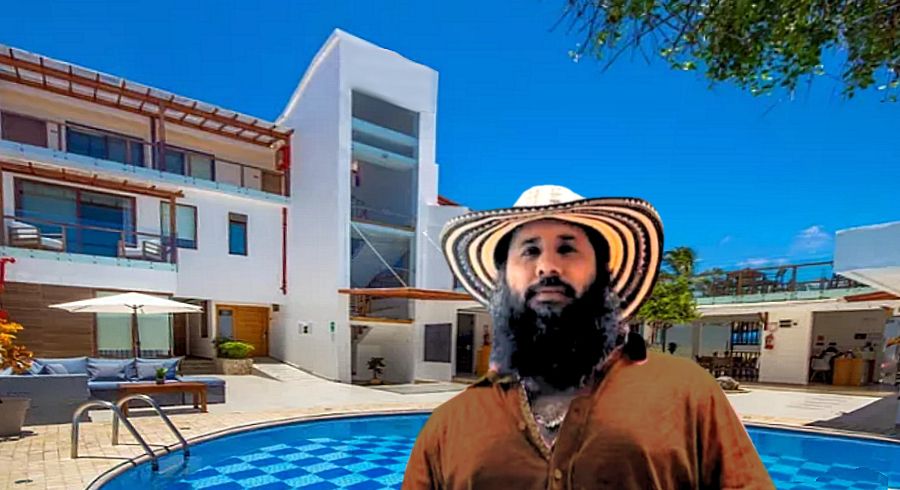
Since Sunday January 7, the country has been shaken by violent revolts in prisons and several localities across the country. A crisis situation which highlights serious dysfunctions in the judicial institution of this Latin American country. The new president's approximate security policy is already weakened.
President Daniel Noboa declared a state of emergency for the entire country following the escape of Adolfo Macias, nicknamed “Fito”.
Who is this leader of the largest criminal gang in the country nicknamed “Fito”?
He is public enemy number one in Ecuador: “Fito”, whose real name is Adolfo Macias, is the leader of the “Choneros”, the largest criminal gang in the country. A group of around 12,000 men who have become the main player in drug trafficking in the country.
Imprisoned since 2011 in a high security prison in Guayaquil (South-West) where he was serving a 34-year sentence for organized crime, drug trafficking and murder, "Fito" has been missing since Sunday January 7. Adolfo Macias, better known as "Fito", escaped from the penitentiary in this port city in southern Ecuador on Sunday, hours before a control operation carried out in the prison.
An escape which forced President Daniel Noboa to declare a state of emergency for the entire country, including in the prison system, this criminal being public enemy No. 1 and leader of the largest criminal gang in the country , responsible for uprisings in prisons.
The 44-year-old criminal had already escaped for 3 months in 2013 from a high security prison.
“Differentiated and preferential treatment from the authorities”, (CIDH)
“Fito” had also taken charge of the section of the Guayaquil penitentiary center in which he was incarcerated. The walls are decorated with paintings to his glory and videos show him partying inside the establishment, with musicians and pyrotechnic devices. He even recorded the video clip for a "narcorroccido", a popular song in honor of drug traffickers: "El corrido del Leon". In this sequence, "Fito" appears wearing a large hat, in the prison courtyard and alongside four other inmates. He strokes a fighting cock and laughs to a tune sung notably by his daughter, known as Queen Michelle.
In a report published in 2022, the Inter-American Commission on Human Rights (IACHR) highlighted the “significant internal control” exercised by the head of Los Choneros over the prison. She also noted that the latter, as well as Junior Roldan, another leader of the gang killed last year in Colombia, benefited from “differential and preferential treatment from the authorities”.
Presidential candidate executed
In recent months, "Fito", who obtained his lawyer's degree in prison, made the headlines in Ecuador after the assassination in early August of one of the main candidates in the presidential election. Fernando Villavicencio, a former journalist and parliamentarian, was shot dead by a Colombian hitman. Shortly before his execution, he said he was threatened with death by the leader of the Choneros
Los Choneros is a drug trafficking gang that appeared in the 1990s in the coastal province of Manabi, strategic for the export of cocaine to the United States and Europe.
Fito, who was only a modest taxi driver in another life, rose to the head of the gang after the successive deaths of the previous leaders. These changes have at the same time led to a fragmentation of the group made up of some 8,000 members, leading to “internal struggles” between its different offshoots, according to the Insight Crime research center. For example, the Tiguerones and the Chone Killers have disassociated themselves, becoming powerful rivals. Insight Crime affirms that, in this situation, Los Choneros have “progressively lost power to the benefit of an alliance led by Los Lobos”. The leader of the latter, Fabricio Colon Pico, also escaped this Tuesday from the prison in which he was incarcerated.
To strengthen themselves, the Choneros therefore established links with powerful criminal organizations in Colombia, such as the Clan del Golfo, and in Mexico, with the Sinaloa Cartel. The Ecuadorian Organized Crime Observatory also credits them with links to networks in the Balkans.
Ecuador in “internal armed conflict”
This Tuesday afternoon, a group of men terrorized journalists by arriving armed and hooded on the set of a television program in Guayaquil, in the southwest of the country.
The scene broadcast live shocked viewers. The journalists and other employees present were taken hostage by the attackers, forced to the ground and threatened with pistols, shotguns and grenades.
A situation which comes on top of the particularly tense context of the country, which was declared in a state of "internal armed conflict" by the president. The situation, becoming unmanageable, pushed the president to declare Ecuador in a state of "conflict internal armed force" and ordered the "neutralization" of the criminal groups involved, according to a decree made public Tuesday.
At least four police officers were also kidnapped in the southwestern coastal town of Machala and the capital Quito. These kidnappings occur in a high climate of tension which forced President Noboa to declare a state of emergency for sixty days throughout the country as well as a curfew from 11 p.m. to 5 a.m.
Daniel Noboa, the 36-year-old Ecuadorian president, elected last fall following a serious political crisis, is facing a very high-risk security situation. Since Sunday January 7 and the flight of the "most dangerous criminal" in the country, hostage-taking and kidnapping of guards have continued in the country's prisons. The government cited “leaks of information” and the probable corruption of two prison officers in this mysterious escape.
The Ecuadorian president also spoke on the evening of Monday January 8 on Instagram, looking serious and concentrated, leather jacket half open, to announce that he was declaring a state of emergency and a curfew in all the countries. The security forces "are hard at work to find this extremely dangerous individual" who allegedly fled on Sunday "a few hours" before a control operation carried out in the Guayaquil prison. The prosecution opened an investigation against two prison officials “who allegedly participated in the escape”.
Images posted on social media, which could not be verified, showed guards being held at knifepoint by hooded men, pleading with the government to "act with caution" and "not send troops into prisons.”
Country ravaged by gang and drug trafficker violence
The name "Fito" has made headlines in the South American press in recent months, following the assassination in early August of one of the main candidates for the presidential election. The victim, a former journalist and parliamentarian, had reported death threats from the leader of the Choneros shortly before his execution.
A country that has become a logistics center for shipping cocaine to the West, Ecuador is ravaged by the violence of gangs and drug traffickers.
|
|
|
|
| Jenny Chase for DayNewsWorld |
 |
SORDID MEDIA UNPACKING
AROUND THE EXPLOSION OF THE DELON CLAN
FACED WITH THE PATRIARCH’S DECLINING HEALTH | 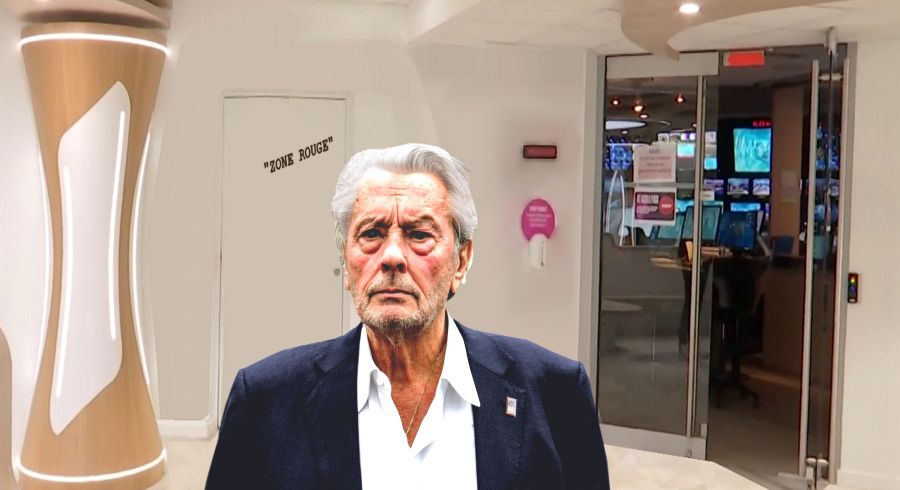
Around the tutelary figure of the father, of the star Alain Delon, his three children, Anthony, 59 years old, Anouchka, 34 years old, and Alain-Fabien, 30 years old, argue. Alain Delon's heirs are fighting over custody of the patriarch in declining health. And this went as far as waging a legal and media war around their father. Gone is the united front of the Delon children against Hiromi Rollin, described as the “lady in waiting” of the monument of French cinema.
From July 2023 Alain-Fabien, Anthony and Anouchka Delon discuss the state of health of their father by SMS. It is notably a question of stopping the treatment of the actor, whose health has deteriorated since his stroke in 2019.
“What I think: immediately stop dad's treatment in order to improve his living conditions and what remains of his health,” pleads Anthony Delon in one of these text messages relayed by the news channel. “I think, to this day, he’s tired of fighting. […] If he decides to give up, nothing and no one can do anything about it,” he says, before ending his message with “We’ll talk later. I kiss you ". And Anthony Delon wishes Alain Delon to return to his home in Douchy (Loiret) “with as much comfort and love as possible to accompany him,” he writes.
A “difficult” decision to be “taken by three”
A proposal to which Anouchka Delon opposed and continues to do so, then as today. The actor’s only daughter responds: “We are not specialists. So, stop (the treatment), why not, but not now,” she writes, still according to the same source. She says she wants, like her brothers, to "keep dad in the best conditions for a while longer", but judges that stopping treatment against medical advice is not "reasonable". And she warns “We have to be aware that if anything happens to him, it will be our fault. I kiss you. »
Since these exchanges last summer, and the outbreak of the affair with Hiromi Rollin, the actor's state of health has continued to fracture the siblings. Anthony and Alain-Fabien want their father to be treated in France. Anouchka wants him to be treated in Switzerland. Alain Delon's Swiss doctor would also have alerted one of the actor's lawyers, lawyer Christophe Aleya, of an "imminent danger of death" in the event of stopping the treatment.
And it was Anthony Delon who set the scene on fire on January 4. In the columns of Paris Match, the actor's eldest son announced that he had filed a complaint against Anouchka Delon on the previous November 7. According to him, his half-sister would have concealed the negative results of cognitive tests carried out in Switzerland on their father. In this story with classic outlines but sordid form, emotional blackmail, repressed resentments, and lack of filial love are mixed. Without forgetting, of course, the money. “Anouchka's anxiety, with her lawyer, is that my father will be redefined as a French citizen.
There would be a huge tax, a huge tax,” explained Anthony Delon on CNews.
The origin of this mutual distrust, of these suppressed unsaid words, and of this fierce competition to win the heart of their sick father, remains enigmatic. Anthony and Alain-Fabien feel like the outcasts of the clan, confronted with their half-sister Anouchka who has always benefited from paternal preference. She had been taken under the protective wing of her father from the age of 12, while they together filmed the television film "The Lion", inspired by the work of Joseph Kessel.
And the great media and legal unpacking gets carried away...
The heirs of Alain Delon are definitely not part of The Race of Lords.
|
|
|
|
| Kate White for DayNewsWorld |
 |
FRANCE REHABILITATION
ELISABETH BORNE RESIGNATION | 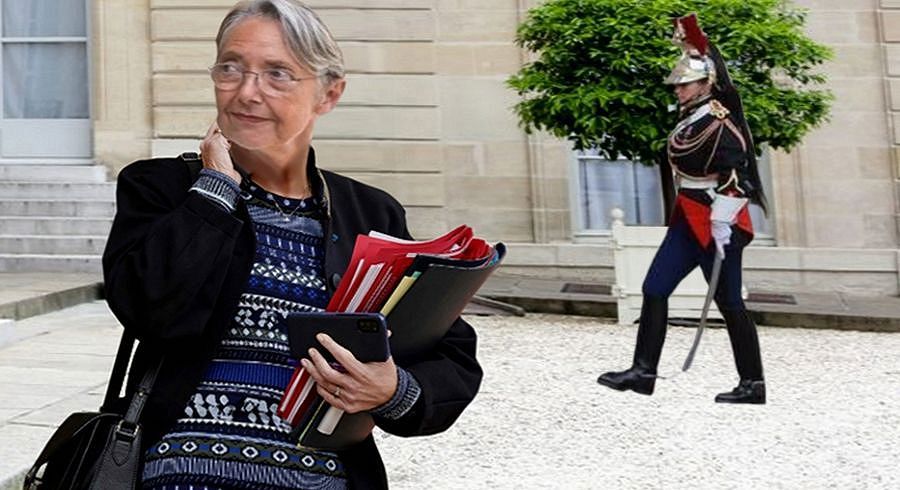
Elisabeth Borne, the Prime Minister, submitted the resignation of her government to the President of the Republic who accepted it.
Emmanuel Macron thanked Elisabeth Borne "with all my heart" for her "exemplary" work in the "service of the Nation", said the president.
Aurélien Rousseau, former Minister of Health and former chief of staff to Élisabeth Borne, reacted on X to the resignation of Elisabeth Borne and paid tribute to her.
"It's difficult to put a few words on such an intense human and political adventure. But working with Élisabeth Borne was an honor. The State is as close to the heart as the battle for employment and the desire to open up to all and all the paths to emancipation.
Clément Beaune says he is “very proud to have served our country” within the Borne government.
Transport Minister Clément Beaune praised the “ courage” and “ convictions” of Elisabeth Borne, shortly after the announcement of her resignation. “ I am very proud to have served our country in your government ,” he wrote on X.
Bruno Le Maire, in an attempt to save his place as minister, advocates the "virtues" of "stability" at Bercy, logical in a France, world champion of taxes, duties, and compulsory levies.
On the balance sheet side seen from here (USA) the balance sheet of Elisabeth Borne, Prime Minister, is really not positive, even if she is a champion of 49/3.
France remains very sick, and deserves a real prime minister who would reform the spending and wasting state of public money, who would significantly reduce taxes, who would bring order to its disastrous management of immigration which should be chosen and controlled, with many rigorous criteria, and of course subject to quotas.
Finally, France should establish a participatory democracy like that of Switzerland, a model for all countries that want to claim to be a true modern democracy respectful of its sovereign people.
Who will replace Elisabeth Borne, with what program ?
Even if it is well known, the saying "Too much tax kills tax" should be a mantra for the future Minister of Economy and Finance of France. |
|
| Pamela Newton for DayNewsWorld |
 |
THE POSTPONEMENT OF THE PUBLICATION OF THE IMMIGRATION REPORT OF THE COURT OF AUDITORS
"A SERIOUS BREACH OF DEMOCRACY" | 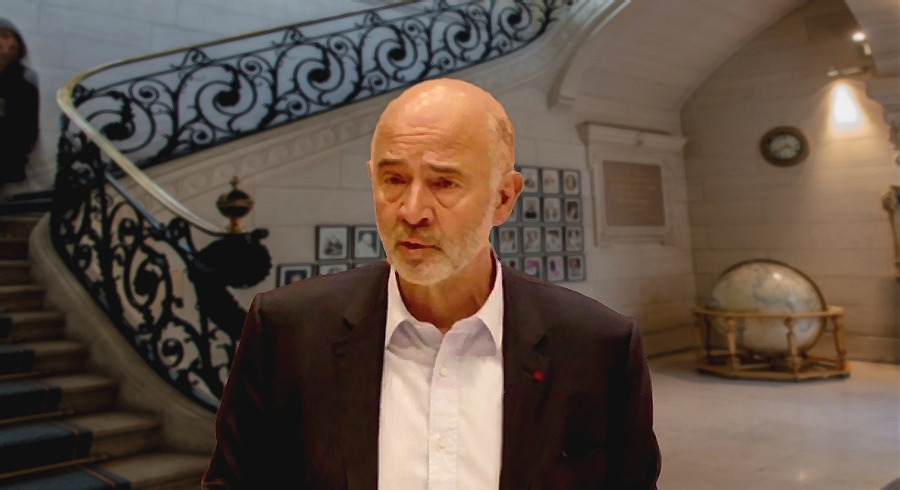
The postponement of the publication of the report on immigration arouses criticism from the opposition, who see it as an attempt to spare the executive on the part of Pierre Moscovici. However, the first president of the Court of Auditors defends himself vigorously.
“It’s a decision that I took personally and which I take full responsibility for.” This is what Pierre Moscovici declared on Friday January 5, 2024 during his intervention on LCI. He explains why he chose to postpone the release of the Court of Auditors' report on immigration by several days.
This document, published the day before, highlights the absence of a "global strategy" in migration policies and the ineffectiveness of the Obligations to Leave the French Territory (OQTF), of which only 12% actually result in removal measures.
The Court of Auditors estimates that this “deficient” policy has an annual cost of 1.8 billion euros.
However, it was the postponement of the publication decided by Pierre Moscovici, an early pro-immigrationist, which triggered a wave of indignant reactions on Saturday January 6.
The reason for this postponement ?
The desire of the first president of the Court of Auditors not to stir up the heated debates on the immigration law which agitated Parliament.
On LCI, Pierre Moscovici specified that the release of the report was initially scheduled for December 13.
“It happened to be two days after the vote on the motion to reject the immigration law.
I don't know if you imagine a report coming out at that time, and three days before the Joint Commission, but what would we have said? ", asks the former minister of François Hollande.
According to him, the "political crisis" generated by the examination of the text would have compromised the calm presentation of the work of the Court of Auditors.
The opposition calls this a "delusional admission".
For LR MP Aurélien Pradié, Pierre Moscovici deliberately concealed crucial information that could enlighten Parliament, calling this an unjustifiable fault. Laurent Wauquiez, LR president of the Auvergne-Rhône-Alpes region, goes so far as to demand the resignation of the first president of the Court of Auditors, considering this a serious breach of democracy.
The National Rally and France Insoumise also express their indignation, denouncing an “unacceptable” postponement and “shenanigans from another age”, respectively. Rock
Moscovici made a mistake
Article 47-2 of the Constitution gives food for thought to Pierre Moscovici's detractors.
Is it not stated that "the Court of Auditors assists Parliament in monitoring the action of the Government" and that it "assists Parliament and the Government in monitoring the execution of finance and financial laws ? The application of social security financing laws as well as in the evaluation of public policies ?" |
|
|
|
| Joanne Courbet for DayNewsWorld |
 |
WAR IN THE MIDDLE EAST
A SENIOR MILITARY LEADER OF HAMAS ALLIED HEZBOLLAH KILLED IN LEBANON AND THE RISK OF THE CONFLICT SPREADING TO LEBANON ? | 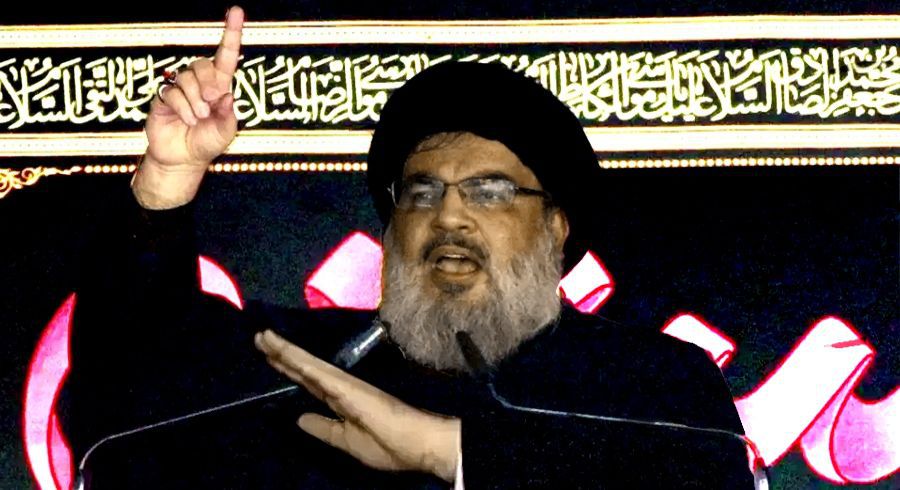 More than three months after Hamas' deadly attack on Israel, the conflict persists with devastating airstrikes by Israeli aircraft on Gaza. The Jewish state is also preparing its post-Gaza position, rejecting both Hamas and an "Israeli civil administration" in the Palestinian territory after the fighting. Antony Blinken, the American Secretary of State, begins a new tour of the Middle East this Monday, January 8 to avoid a regional escalation, while a senior military commander of Hezbollah was killed in a strike in southern Lebanon. More than three months after Hamas' deadly attack on Israel, the conflict persists with devastating airstrikes by Israeli aircraft on Gaza. The Jewish state is also preparing its post-Gaza position, rejecting both Hamas and an "Israeli civil administration" in the Palestinian territory after the fighting. Antony Blinken, the American Secretary of State, begins a new tour of the Middle East this Monday, January 8 to avoid a regional escalation, while a senior military commander of Hezbollah was killed in a strike in southern Lebanon.
Senior Hezbollah military official killed in Israeli strike
The Israeli strike on January 8, 2024 targeted a senior Hezbollah military official, Wissam Hassan Tawil, in southern Lebanon, killing him. He played a key role in directing military operations in the South, from where Hezbollah has launched almost daily attacks against Israel for three months. In a statement released on Monday, the Israeli army claimed to have destroyed a Hezbollah building in Lebanon.
This attack comes after the death of Hamas number two, Saleh al-Arouri, and other officials in a strike attributed to Israel on January 2. In retaliation, Hezbollah fired 62 rockets at a military base in northern Israel.
The slain commander, Wissam al-Tawil, was also known as Jawad and led military operations in southern Lebanon. He was killed by “an Israeli strike which targeted his car in the village of Kherbet Selem”, about ten kilometers from the border with Israel. This is the highest-ranking Hezbollah military official killed since this powerful formation opened the front with Israel to support Hamas.
Many unknowns about the Radwan force
Wissam al-Tawil, known as Jawad, was notably responsible for directing military operations in southern Lebanon, where Hezbollah has been carrying out almost daily attacks against Israel for three months. The movement also reported that it was a painful loss.
According to several sources, the man was a commander of the Radwan force, considered Hezbollah's elite unit. He had been appointed a few weeks earlier. Information on this unit is scant. In November, Hezbollah, an ally of Hamas and Iran, claimed not to know the number of fighters in the Radwan force, whereas Israel estimated their number at 2,500.
A spread of the conflict in Lebanon with Hezbollah ?
Israeli Defense Minister Yoav Gallant threatens Hezbollah to reproduce in Beirut what is happening in Gaza. He announces the start of the third phase of the war in the Gaza Strip, with more targeted operations and warns Hezbollah that operations could also extend to Beirut. Yoav Gallant warned Hezbollah, not hesitating to threaten the Lebanese Shiite movement. “We are ready to make sacrifices. Hezbollah sees what is happening in Gaza and it must know that we are ready to replicate these operations in Beirut,” he said in an interview with the Wall Street Journal .
For his part, the leader of the Israeli opposition, Yair Lapid, calls on certain ministers to leave the government, affirming that the current government cannot lead the country. According to him, it is possible to establish in a short time a "broad, reasonable and benevolent government" that would support the IDF and the reserve soldiers, allocate the budget for the benefit of citizens, return deportees to their homes and present a plan for reconstruction on the table.
Antony Blinken, the head of American diplomacy, is in Israel to try to achieve a de-escalation and avoid a spread of the conflict in Lebanon.
|
|
|
|
| Andrew Preston for DayNewsWorld |
 |
FREEZING COLD OVER EUROPE
DUE TO THE POLAR VORTEX |  Icy cold is about to engulf Europe under the influence of the polar vortex, a swirling mass of cold air generally confined to the poles, thus extending its hold on France. From this Monday, January 8, Météo France forecasts negative maximum temperatures in the north and significant snowfall in the mountains, announcing an amplification of this phenomenon over the coming days, plunging temperatures into freezing depths. Icy cold is about to engulf Europe under the influence of the polar vortex, a swirling mass of cold air generally confined to the poles, thus extending its hold on France. From this Monday, January 8, Météo France forecasts negative maximum temperatures in the north and significant snowfall in the mountains, announcing an amplification of this phenomenon over the coming days, plunging temperatures into freezing depths.
To understand this meteorological change, it is appropriate to look at the "polar vortex", a term little used in everyday language, mainly reserved for meteorologists' jargon, designating a swirling mass of cold air, traditionally confined to the poles. This renowned vortex is set to move towards unusual latitudes over the coming days, causing temperatures to drop dramatically by around -10°C across France. This exceptional cold snap could mark the most frigidly intense day since 2018, affecting cities such as Paris, Nantes and Lille.
Between Saturday and Sunday, temperatures have already declined by 2 to 4°C across the country. Paris notably recorded a loss of 4 degrees in 24 hours, prompting the Île-de-France prefecture to trigger the Great Cold Plan. This phenomenon will not only spare the north of the country.
According to Météo France, this movement of polar cold towards France is a rare but natural phenomenon. The polar vortex, a depression of cold air located about 30 kilometers above the poles, is traditionally maintained by very fast circular winds, the "stratospheric jets of the polar night".
These powerful winds strengthen the jet stream when they move from west to east, and weaken it when they go in the opposite direction. By disrupting the jet stream, they propel cold air from the polar vortex towards unusual regions. The current, disturbed, oscillates towards mid-latitudes, trapping cold air in the troposphere, the atmospheric layer located between 8 and 12 kilometers above sea level.
It is precisely this phenomenon that will take place in the coming days in Europe, leading to a gradual and rapid decrease in temperatures.
Météo-France is forecasting a cold peak this Tuesday with temperatures felt around -10 degrees. The maximums will hardly exceed 10 degrees in Corsica, and will only reach 2 degrees for cities like Bordeaux or Tarbes. |
|
|
|
| Boby Dean for DayNewsWorld |
 |
FRANCE WORLD TAX CHAMPION | It is difficult to be surprised, each French citizen is unfortunately more and more aware of it, France is the world champion for taxes.
In 2022 46.1% of GDP
With an amount of compulsory deductions representing 46.1% of GDP in 2022, it is ahead of Norway and Austria.
According to the 2023 edition of "Public Revenue Statistics" just published by the OECD, France once again became the world tax champion in 2022, with a rate of compulsory deductions (PO) representing 46.1% of GDP, compared to 45.2% in 2021.
It dethroned Denmark from its first place, where the level of taxation recorded a spectacular drop of 5 points of GDP last year, to 41.9%, "mainly due to the contraction in tax revenues on income", explains the OECD. Denmark is now relegated to seventh place in the world.
It is Norway that we find, behind France, in second place in the 2022 ranking of the most taxed countries (44.3% of GDP, + 1.8 points compared to 2021), mainly due to a jump in corporate tax (IS) revenues from exceptional profits made by companies in the energy sector.
With a PO/GDP ratio of 43.1%, Austria takes third place, ahead of Finland (43%) and Italy (42.9%).
Mexico has the lowest rate among OECD countries
At the other end of the scale, Mexico is, among the 38 OECD countries, the one with the lowest level of compulsory taxes (16.9% of GDP), followed by Colombia (19. 7%), Turkey (20.8%) and Ireland (20.9%).
In comparison, this ratio stands at 27.2% in Switzerland, 27.7% in the United States, 35.3% in the United Kingdom and 39.3% in Germany.
On average, the amount of taxes represented 34% of GDP in the OECD area in 2022, down 0.2 points compared to 2021, mainly due to reductions in energy taxes decided in the face of the surge lessons.
The decline observed in 2022 followed two years of increase during the Covid-19 pandemic (+0.2 points in 2020 and +0.6 points in 2021).
Finally, in the long term, the tax/GDP ratio is rising sharply in OECD countries, having increased from 24.9% on average in 1965 to 34% in 2022.
During this period, it increased by almost 13 points in France (from 33.4% to 46.1%) but by just over four points in the United States (from 23.5% to 27 .7%).
But where does all this “crazy money” go which falls into the hands of the State while all public services are dying with their mouths open ? |
|
|
|
| Boby Dean for DayNewsWorld |
 |
FOUR MEMBERS OF HAMAS SUSPECTED OF PLANTING ATTACKS IN EUROPE | Four individuals affiliated with Palestinian Hamas, suspected of planning attacks against Jewish institutions in Europe, were apprehended in Germany and the Netherlands, according to a press release from the German federal prosecutor's office published this Thursday. Dutch authorities arrested a Dutch citizen in Rotterdam, while two Lebanese and an Egyptian were arrested in Berlin, all of whom are longtime Hamas members with close ties to the Islamist group's armed wing.
The prosecution indicates that one of the Lebanese, Abdelhamid Al A., had the mission, issued by the leaders of Hamas in Lebanon, to obtain weapons with a view to sending them to Berlin in preparation for possible attacks against institutions Jews.
German Justice Minister Marco Buschmann responded by highlighting the increase in attacks against the Israeli population and Jews in the country in recent weeks. He stressed the need to take all possible measures to ensure the safety of Jews in Germany.
“We must therefore do everything possible to ensure that Jews do not have to fear for their safety in our country again,” he added.
Many European countries are on alert against an increased risk of attacks from Islamists radicalized by the war in the Gaza Strip.
|
|
|
|
| Alize Marion for DayNewsWorld |
 |
RUSSIA’S JUDGMENT ON ADHESION
FROM UKRAINE AND MODALVIA TO THE EU | 
Russia judges that the accession of Ukraine and Moldova would “destabilize” the EU
After the announcement of the opening of EU accession negotiations for Ukraine and Moldova, the Kremlin spokesperson estimated that these two countries did not meet European criteria.
The Kremlin estimated, Friday December 15, 2023, that the entry of Ukraine and Moldova would “destabilize” the European Union because these countries do not “meet the criteria”, the day after the opening of negotiations membership.
The spokesperson for the Russian presidency, Dmitry Peskov, also considered that the green light given to kyiv and Chisinau by the EU, which also granted candidate status to Georgia, was intended to “harm Russia ".
Viktor Orban blocks aid to Ukraine
Volodymyr Zelensky immediately reacted after the announcement of the opening of EU accession negotiations : "This is a victory for Ukraine. A victory for all of Europe. A victory that motivates, inspires and strengthens .". But he rejoiced too soon.
Because at the same time, the Kremlin welcomed Hungary's decision to block European aid of 50 billion euros for Ukraine. "Hungary is a sovereign country, it has its interests. And, unlike many European countries, it firmly defends its interests, which we appreciate," said spokesperson Dmitry Peskov.
The day before, it was Vladimir Putin, exhilarated by the difficulties in kyiv, who on television displayed his confidence in "victory", answering questions from the press and citizens, a traditional exercise which he had renounced last year.
“Victory will be ours,” he proclaimed before recalling that his objectives remain unchanged after two years of conflict: to oust the current power and destroy the military capabilities of its pro-Western neighbor. Vladimir Putin also revealed for the first time how many Russian soldiers were engaged on the Ukrainian front: 617,000, including 244,000 mobilized.
The leaders of the European Union, meeting in Brussels, in fact failed during the night from Thursday to Friday to convince Hungary to lift its veto. The EU had planned to provide Ukraine with aid of 50 billion euros, 33 billion in loans and 17 billion euros in donations, over four years starting next year.
Hungarian Prime Minister Viktor Orban demanded on Friday that "all European funds" be paid to his country, billions of euros of which remain blocked due to various procedures, before possibly considering changing his mind.
While the Ukrainian counter-offensive is at an impasse, the United States is torn over the continuation of its aid to kyiv, against a backdrop of deadly conflict between Israel and Hamas, this blockage is an additional setback for Ukraine
An accession decision taken in Orban's absence!
A decision taken unanimously by the Member States… but in the absence of one of them. To circumvent the threat of a veto brandished by the Hungarian Prime Minister on the opening of talks with kyiv, European leaders once again had to redouble their creativity.
By a trick improvised by the German Chancellor, Olaf Scholz, according to the official version, the representatives of the States asked Viktor Orban to leave the room in order to achieve the required unanimity.
"Unprecedented" in the history of the Union, this tactic nevertheless gave some difficulty to certain participants of the summit as well as to jurists, who wondered whether the physical absence of the Hungarian leader could invalidate the decision.
The war in Ukraine has restarted the process of EU enlargement towards the East and the Balkans at a breakneck pace. Motivated by geopolitical reasons, namely to contain Russian power on the European continent, this expansion nevertheless raises immense economic and political questions. By integrating poor states into its fold, the European Union would in fact encourage a new wave of relocations and social dumping and would subject the continent's farmers to terrible competition.
Furthermore, the only way to avoid political blockages in a Europe of 34 or 35 would be to strengthen federalism, by further reducing the decision-making powers of the Member States.
A harmful scenario pushed by European elites outside of any democratic mandate.
|
|
|
|
| Jenny Chase for DayNewsWorld |
 |
THREAT OF NAVAL WAR IN THE RED SEA
"THE AXIS OF IRANIAN RESISTANCE"
BEHIND THE HOUTHI ATTACKS | Tension is rising a notch in the Red Sea: Yemen's Houthi rebels yesterday claimed responsibility for the drone attack against the French frigate Languedoc in the Red Sea. The machine was shot down on Monday in this crucial area for international maritime trade.
This threatened a Norwegian oil tanker, which had already been hit by a cruise missile fired from areas controlled by the rebels without causing any casualties. This was the latest incident targeting boats using this route through which 40 transit % of world trade.
In recent weeks, the Red Sea has been the scene of several incidents of this type. At least six commercial ships were targeted by drones or missiles. The most spectacular attack dates back to November 19 when a Houthi commando seized a cargo ship belonging to an Israeli businessman. The Yemeni armed group filmed the operation and broadcast the images. The boat was taken to a port in Yemen. Its 25 crew members are still sequestered.
Their support for Hamas
The Houthis claim to attack boats with Israeli interests or a point of departure or arrival in Israel, in support of the Palestinians. They threaten all boats in the Red Sea, en route to Israel, as long as the populations of Gaza do not receive emergency humanitarian aid.
They invited themselves into the war. They show their support for Hamas and have several times directly targeted Israel by sending drones and missiles against its territory, notably against the city of Eilat, in the south. Devices almost all intercepted by Israel.
The axis of Iranian resistance in the Middle East
It's hard not to see Iran's hand in this. The Houthis belong to the so-called axis of Iranian resistance in the Middle East, alongside Hamas, Hezbollah in Lebanon, Shiite militias in Iraq and Syria. All these movements, enemies of Israel, are armed arms of Tehran in the region, even if they retain a certain autonomy.
The Houthis in fact have very sophisticated weapons, drones, cruise missiles, but also ballistic missiles capable of hitting ships, and therefore moving targets. Iran provides the Houthis with a major arsenal. The fact remains that Iran, the main ally of this Yemeni rebel group, the Islamic Republic, seems, for the moment, to want to avoid a regional escalation.
An obstacle to international trade
In addition, the situation in the Red Sea is having a significant impact on maritime traffic, with a notable increase in insurance costs and adjustments to route plans for several vessels. The Houthis, a rebel group which exercises control over part of Yemen, notably over the strategic strait regulating access to the Red Sea, pose a serious threat to international trade and freedom of navigation in this crucial region.
In fact, around a tenth of global maritime traffic passes through this area. The Bab-el-Mandeb Strait, located in the south of the Red Sea between Yemen and Djibouti, is considered the 4th most important crossing point in the world for oil tankers.
Faced with this threat, Western countries are calling for international mobilization to secure this major trade route. However, the means to influence this rebel group are limited. Among the options considered, the military option is on the table. Attacks on commercial shipping in this region are not new, and an international force has already been present for more than two decades.
The United States expresses a desire to strengthen this presence, considering increasing its own engagement in the Red Sea and mobilizing other nations, including China. However, escorting every ship along Yemen's Houthi-controlled west coast remains an impossible task for naval forces.
Therefore, Washington is also exploring options for diplomatic retaliation. One possibility would be the reintegration of the Houthis into the US list of terrorist organizations, which could jeopardize the transfers of funds needed as part of the ongoing negotiations for a peace agreement between Yemen and Saudi Arabia. However, Western countries risk finding themselves isolated in their sanctions, as it would be difficult for Arab nations to condemn the Houthis without being seen as supporters of Israel.
For American General McMaster, former American National Security Advisor, Iran, which finances these Islamist movements, must be hit in the wallet. “We did it under the Trump administration. And it worked! Numerous studies prove it,” he says in an interview with a colleague.
|
|
|
|
| Britney Delsey for DayNewsWorld |
 |
|





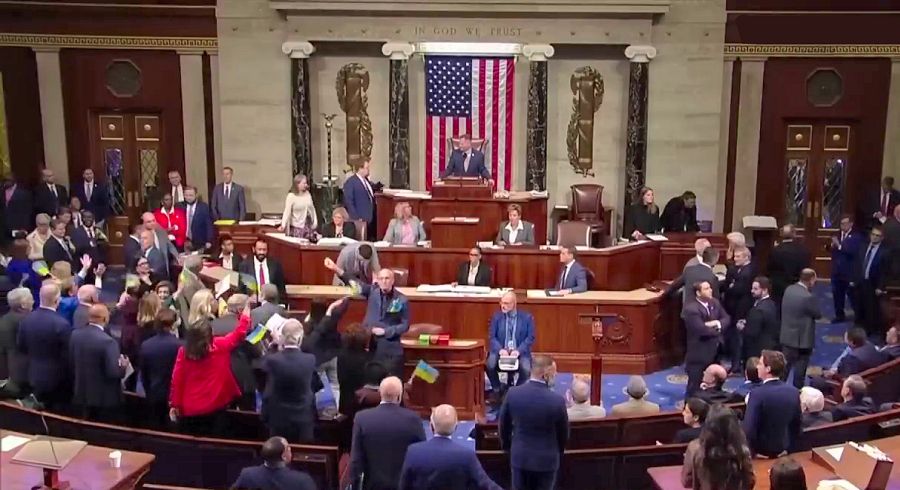




















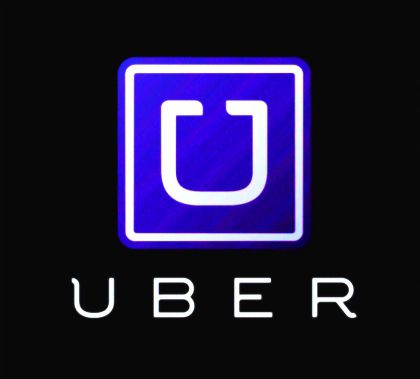























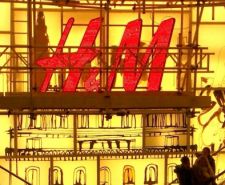









 "S
"S




 N
N


 A
A T
T A
A

 T
T A
A A
A O
O T
T F
F






























 M
M I
I